Shows
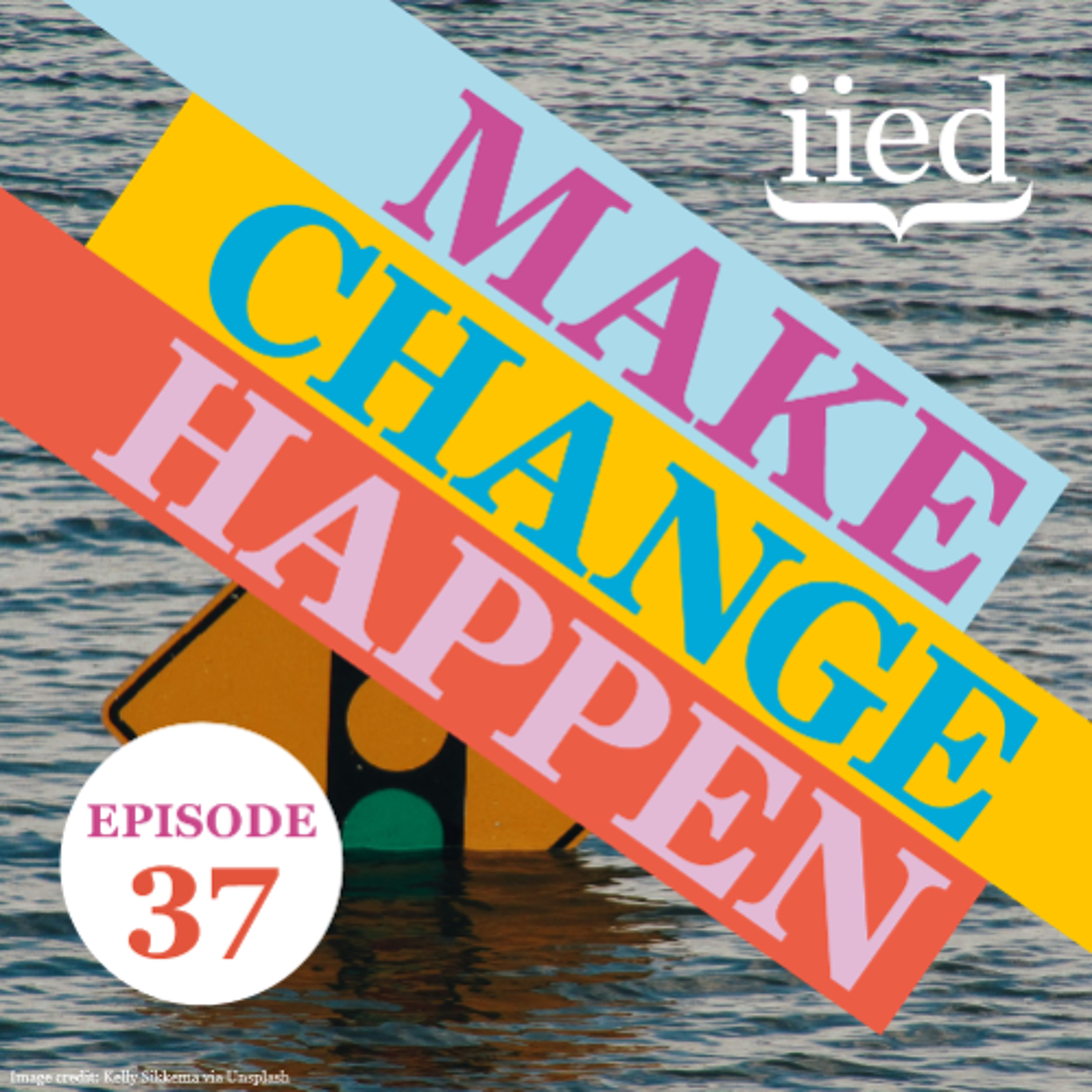
Make Change Happen37. Networks, not global forums, to drive climate action?In this episode, IIED principal researcher Anna Schulz and Green Economy Coalition convenor Carina Bachofen discuss the impact of a rapidly changing multilateral system on climate ambition. With the help of their guests, they consider alternatives to global forums for bringing about change.
2026-01-2017 min
HOA HELLCan I Sue My HOA for Emotional Distress? What Actually Works in CaliforniaIn this episode of HOA HELL, attorney Michael Kushner explains how California law defines emotional distress and why the term means something very different inside a courtroom than it does in everyday life. 🎯 What You’ll Learn in This Episode:✅ The difference between ordinary emotional stress and the legal standards for emotional distress damages.✅ The elements of Intentional Infliction of Emotional Distress (IIED) and Negligent Infliction of Emotional Distress (NIED) under California law.✅ Why most HOA-related emotional distress claims fail and what evidence courts actually require.✅ How to document emotional dist...
2025-10-1334 min
BSPE Legal Marketing PodcastIntentional Infliction Of Emotional Distress And Divorce In Illinois - Russell D. KnightFrom Law Office of Russell D. Knight – Intentional Infliction Of Emotional Distress And Divorce In Illinois explores how the tort of intentional infliction of emotional distress intersects with divorce law in Illinois, what standards must be met, and when a spouse or ex‑spouse might bring a civil claim outside the divorce case itself.In the first part, the discussion lays out the fundamental conflict: while Illinois divorce courts allocate marital property, parenting time, and maintenance without regard to marital misconduct, the law still allows a spouse to sue their partner for intentional infliction of emotional distress (IIED...
2025-10-0105 min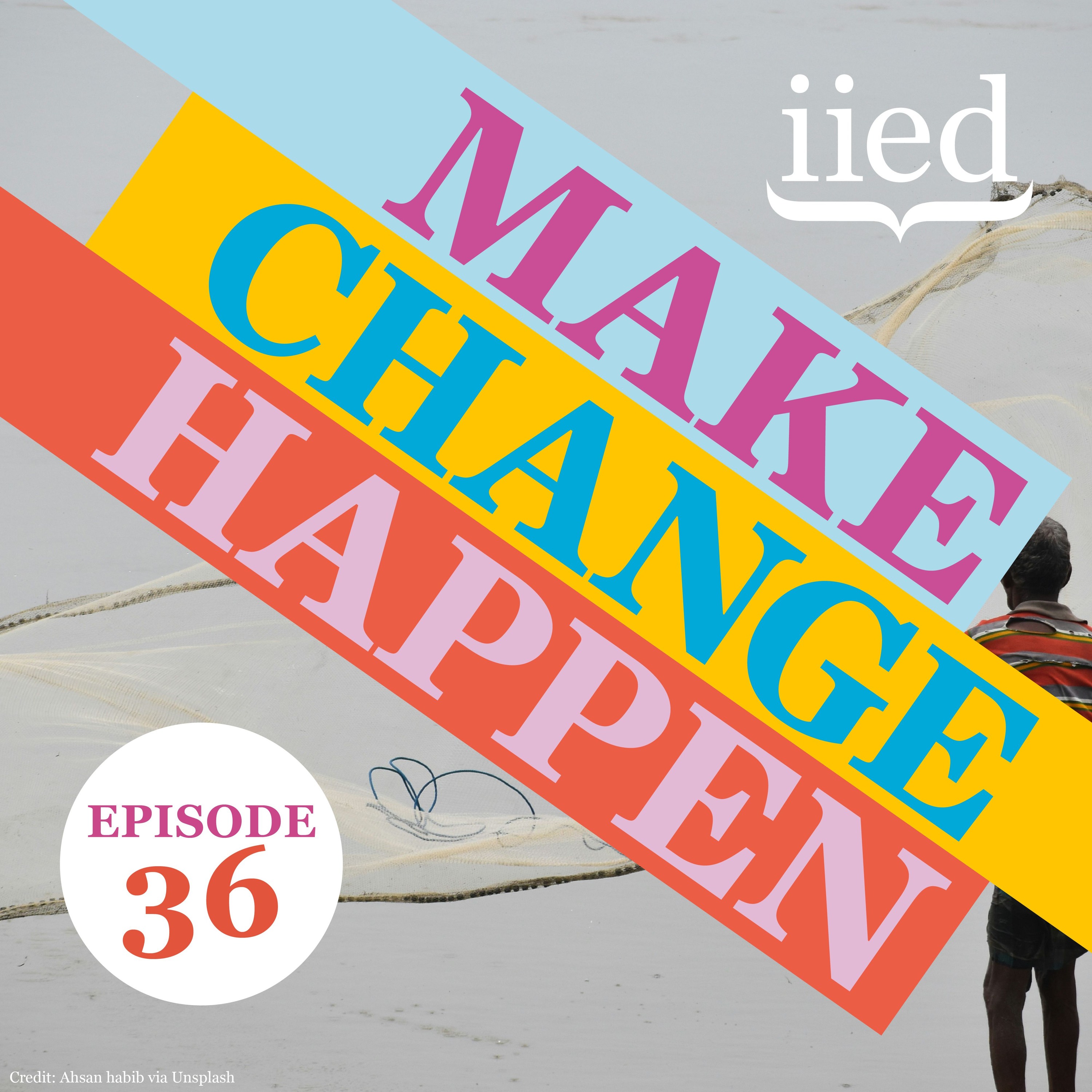
Make Change Happen36. Solidarity, collaboration and justice – the future of food systemsThe focus is on food systems. The world is missing targets for addressing hunger and malnutrition while food systems contribute to nature loss and climate change. So how can sustainable food systems tackle those issues and also provide jobs, support economies and reduce poverty?
2025-09-1818 min
American Law CafeTorts: IIED, False Imprisonment and ConversionIn this episode, we explore three powerful tort doctrines shaping personal injury law in Tennessee and Alabama: Intentional Infliction of Emotional Distress (IIED), False Imprisonment, and Conversion. From shocking hospital mishandling to wrongful property control and alleged unlawful detentions, we dive into the legal standards and courtroom battles that define what’s outrageous, what’s unlawful, and what crosses the line.We unpack key cases like:Johnson v. Woman’s Hospital — where a grieving mother was handed her infant’s body in a jar of formaldehyde,Medlin v. Allied Investment Co. — clar...
2025-07-1721 min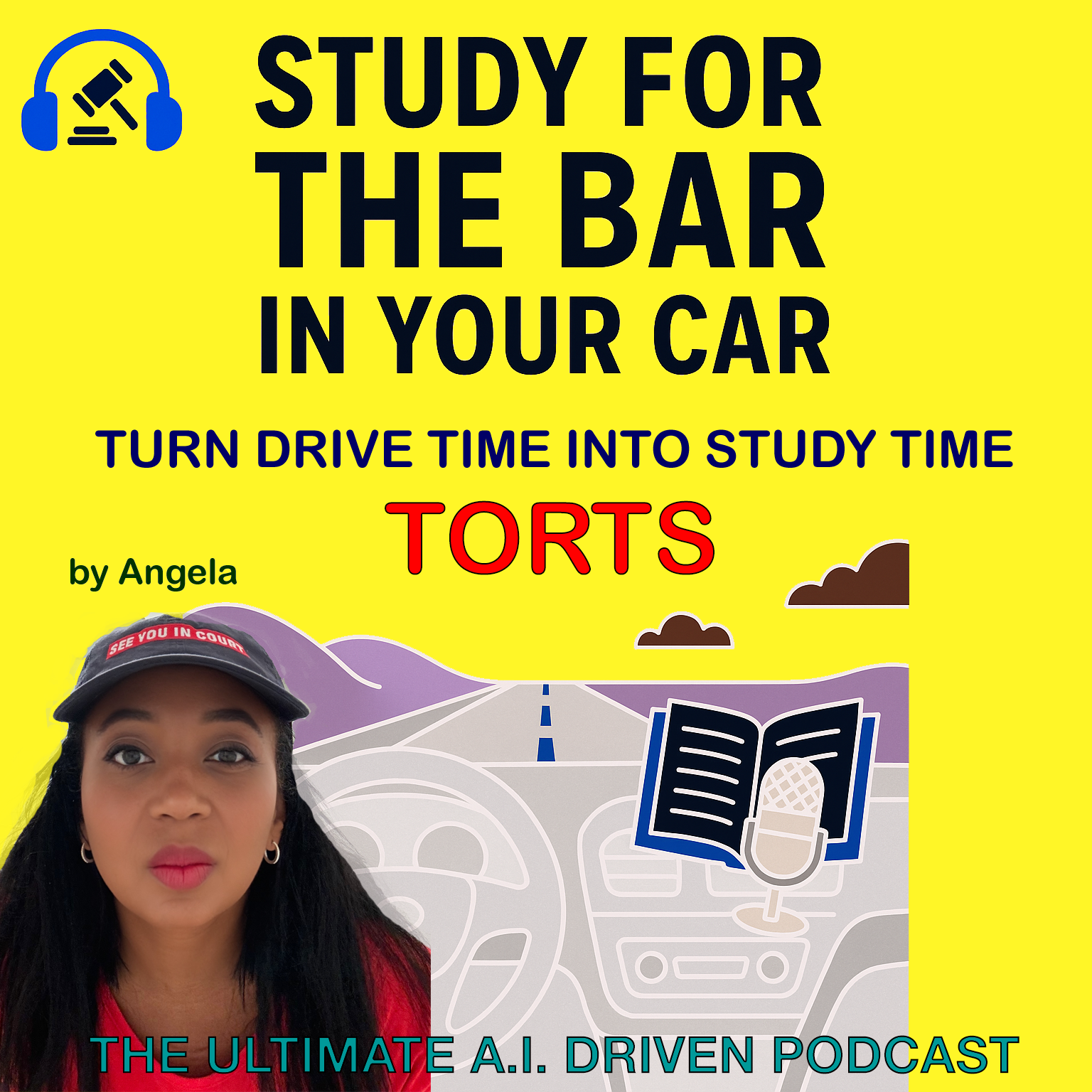
Study for the Bar in Your CarTorts - Wrap-Up and Review (No Negligence)Embark on a comprehensive journey with AI hosts Claude and Ma in Episode 20 of the Study for the Bar in Your Car podcast! This grand wrap-up of tort law draws from Angela's meticulous notes, providing a vital framework for your bar exam preparation.This episode distills centuries of legal thinking into actionable insights, covering the entire spectrum of civil wrongs. Dive into intentional torts, understanding how "intent" differs from criminal law. Explore key concepts like battery (harmful/offensive contact, nominal damages), assault (apprehension of imminent battery), false imprisonment (confinement to a bounded area), and Intentional Infliction of...
2025-07-131h 36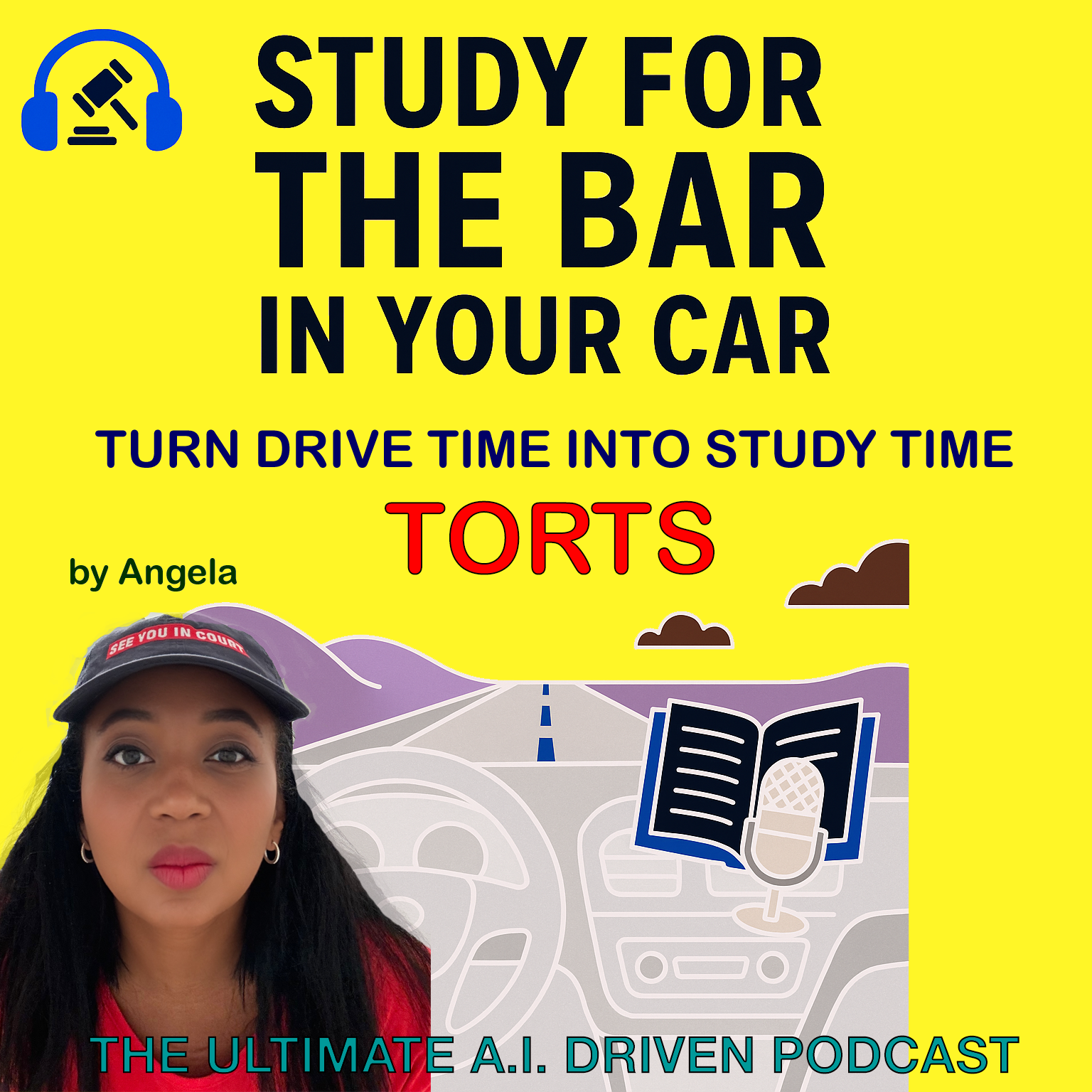
Study for the Bar in Your CarTorts - IIED - Blake Lively, Justin Baldoni and Hulk HoganGet ready to delve into the intense world of emotional distress torts with the latest "Study for the Bar in Your Car" podcast! In Episode 10, your AI hosts, Claude and Ma, drawing from Angela's meticulously compiled law school notes, take a deep dive into Intentional Infliction of Emotional Distress (IIED). This is a critical area for bar exam success, focusing on the most egregious forms of conduct that cause profound emotional harm.We break down the four essential elements a plaintiff must prove for an IIED claim:Extreme and Outrageous Conduct: This isn't about mere rudeness...
2025-07-0333 min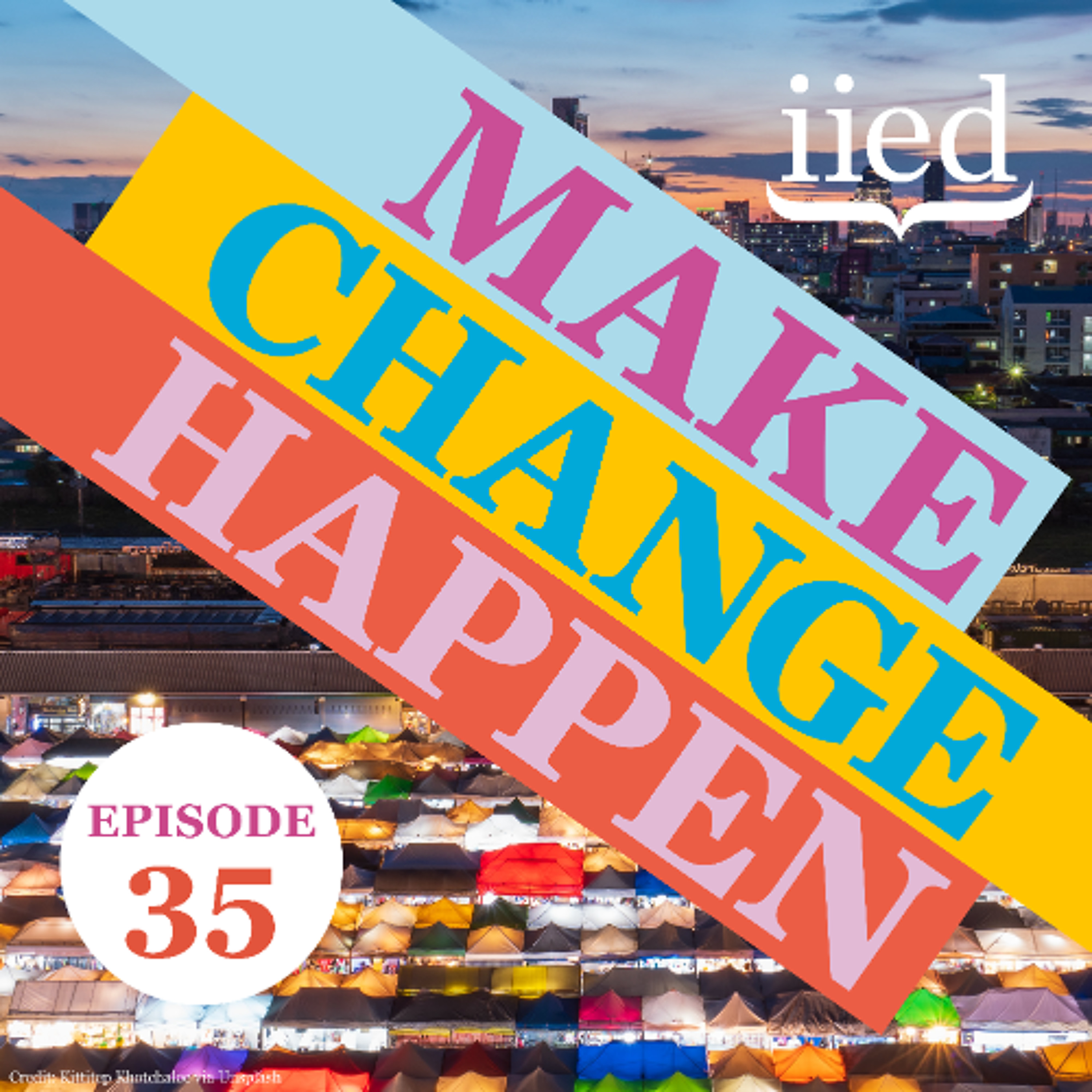
Make Change Happen35. Time to reset the international development agendaIn this episode, IIED executive director Tom Mitchell discusses revitalising a commitment to international development and in the process, getting money to where it is needed most and can be used to best effect – to the local level.
2025-06-2514 min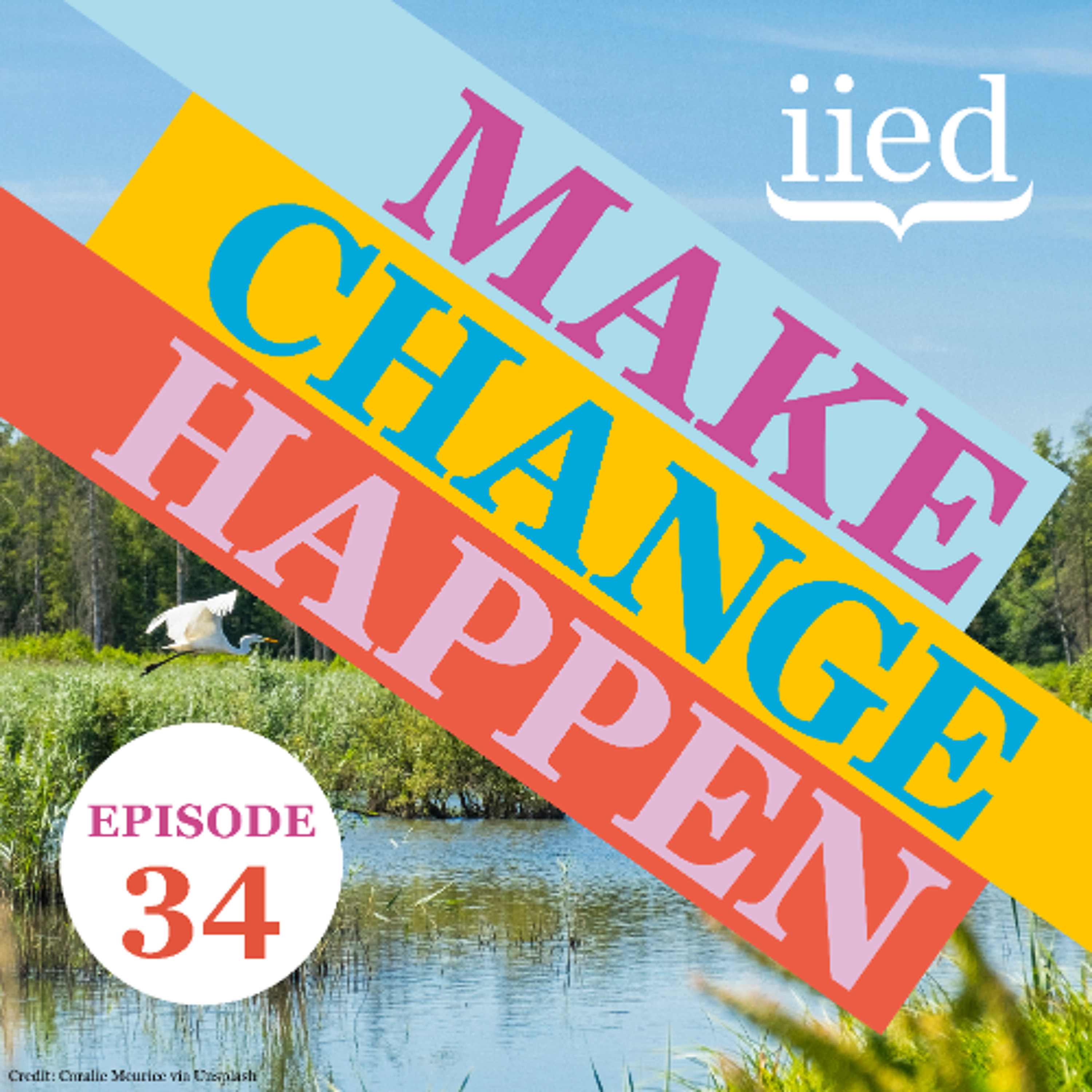
Make Change Happen34. Nature finance: what’s being done and is it working?In this episode, principal researcher Ebony Holland talks to Simon Cullen about the importance of nature finance and the need for changes in practice to make sure money for nature resilience gets to Indigenous Peoples and local communities.
2025-06-1113 min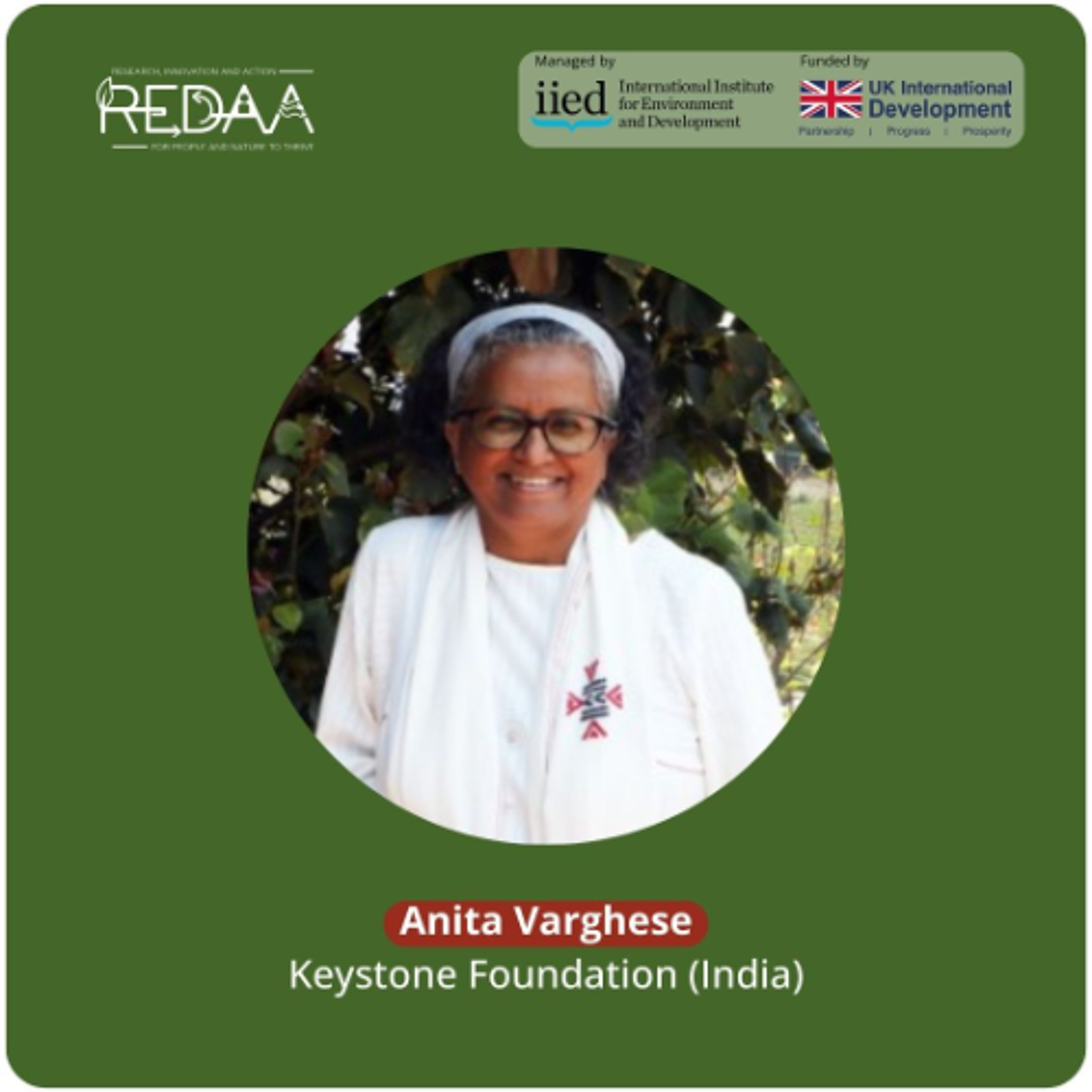
Make Change HappenAnita Varghese — Keystone Foundation, India | Who holds the power in nature restoration?This excerpt comes from REDAA’s webinar “Tackling the power and politics of locally led nature restoration”. This event examines how power and politics in South Asia and Southeast Asia, are- or are not - shaped to support, scale and sustain locally led action for nature restoration. Conversation lead, Anita Varghese, opens the discussion by asking whether we’re getting in right in terms of restoration governance. Who makes the decisions? Who shapes the policies? Whose priorities count?
2025-05-0800 min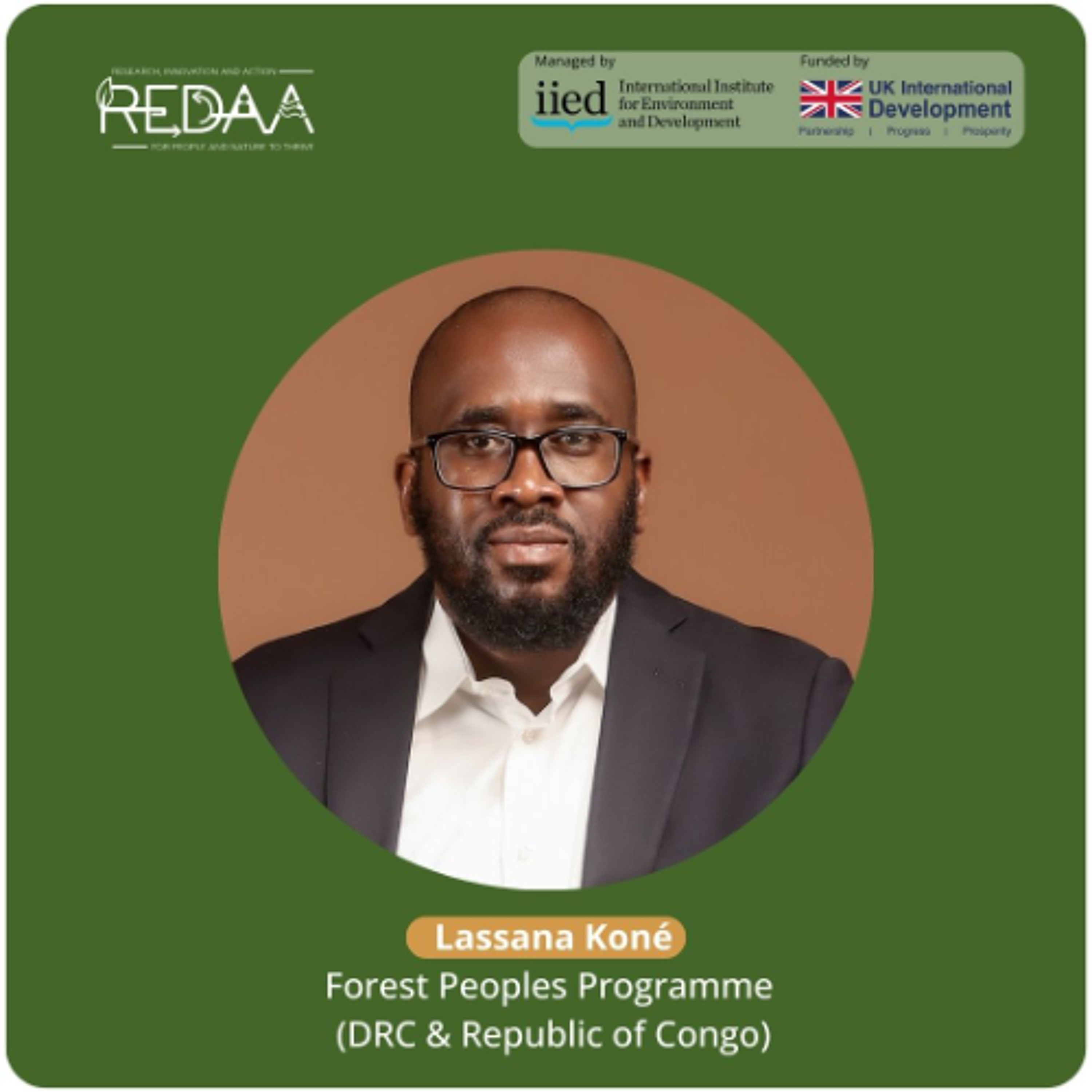
Make Change HappenLassana Koné — Forest Peoples Programme, Congo Basin | Indigenous rights and legal frameworksThis excerpt comes from REDAA’s webinar "Tackling the power and politics of locally led nature restoration”. This event examines how power and politics in sub-Saharan Africa, are- or are not - shaped to support, scale and sustain locally led action for nature restoration. Lassana Koné, of the Forest Peoples Programme, discusses the tension between statutory and customary law in the Congo basin, highlighting why Indigenous right must be at the centre restoration initiatives.
2025-05-0801 min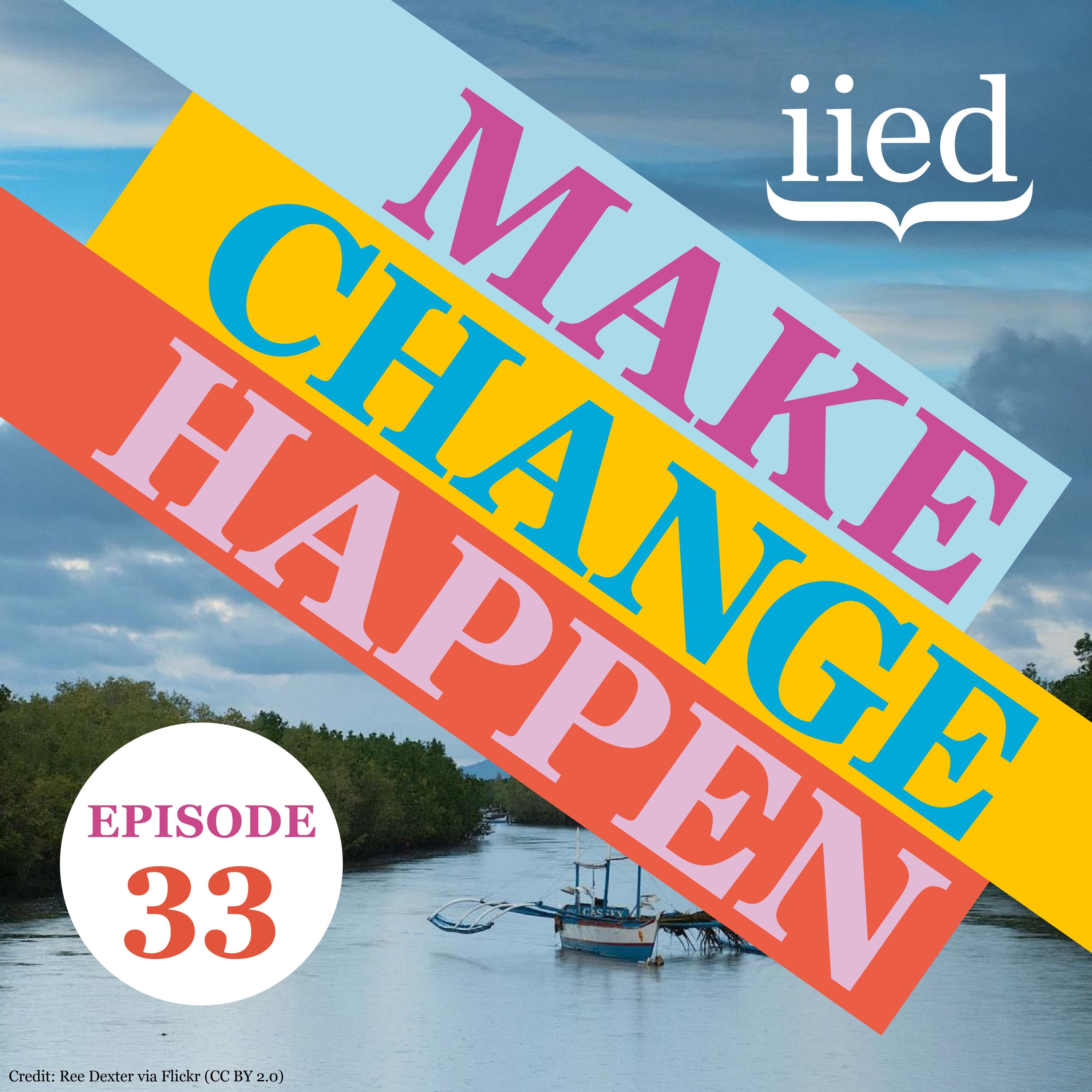
Make Change Happen33. Locally-led nature restoration: critical for a sustainable futureIn this episode, IIED researcher Francesca Booker and Ritchel Cahilig from the Haribon Foundation talk about the critical role local leadership plays not only in restoring nature itself but also in conserving local culture, identity and communities too.
2025-04-2223 min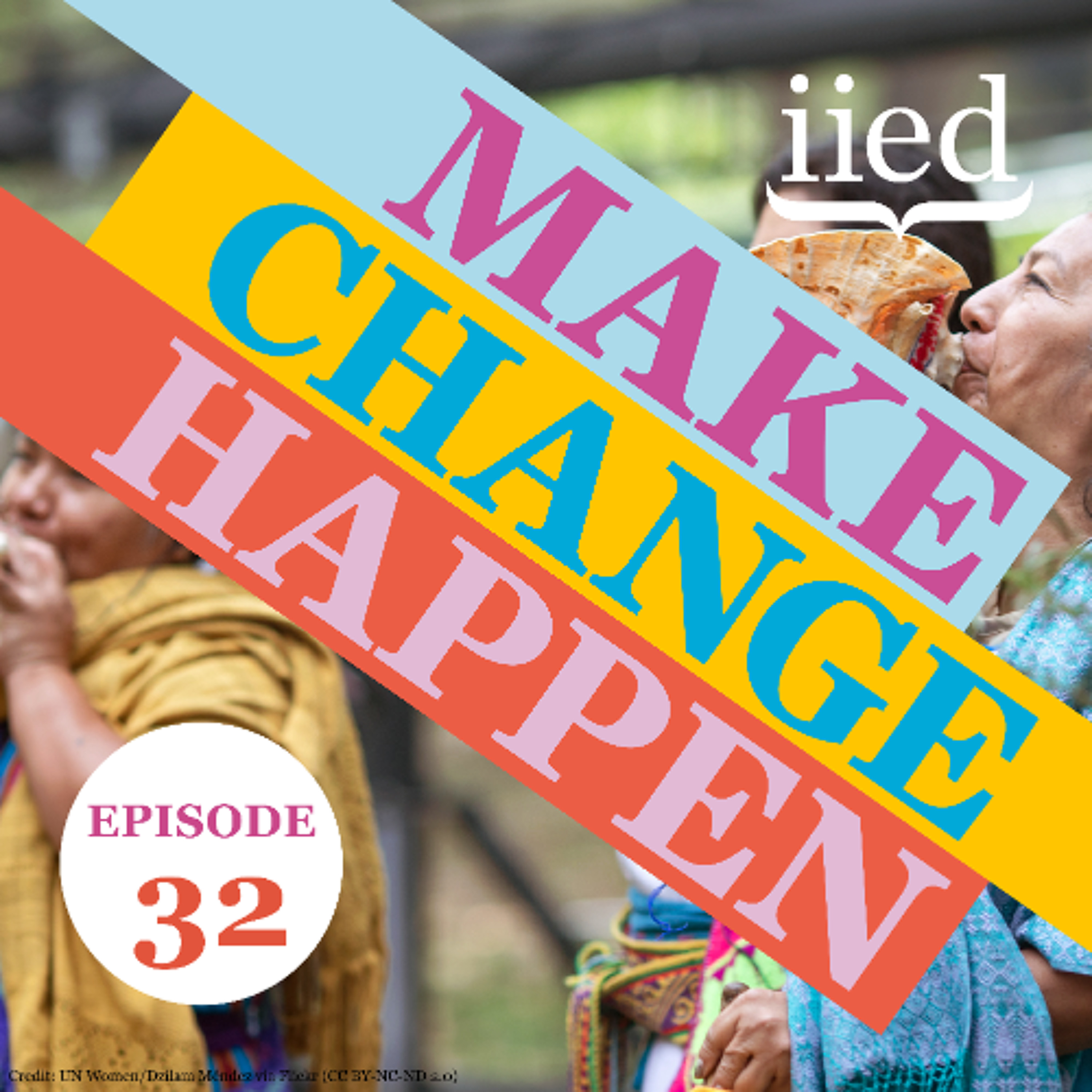
Make Change Happen32. Gender justice: why is progress so slow?In this episode, IIED’s senior researcher Karen Wong-Pérez talks to IIED’s senior press and PR manager, Simon Cullen, about global progress towards gender justice and why the journey towards gender-just environmental action isn’t moving quickly enough.
2025-04-1015 min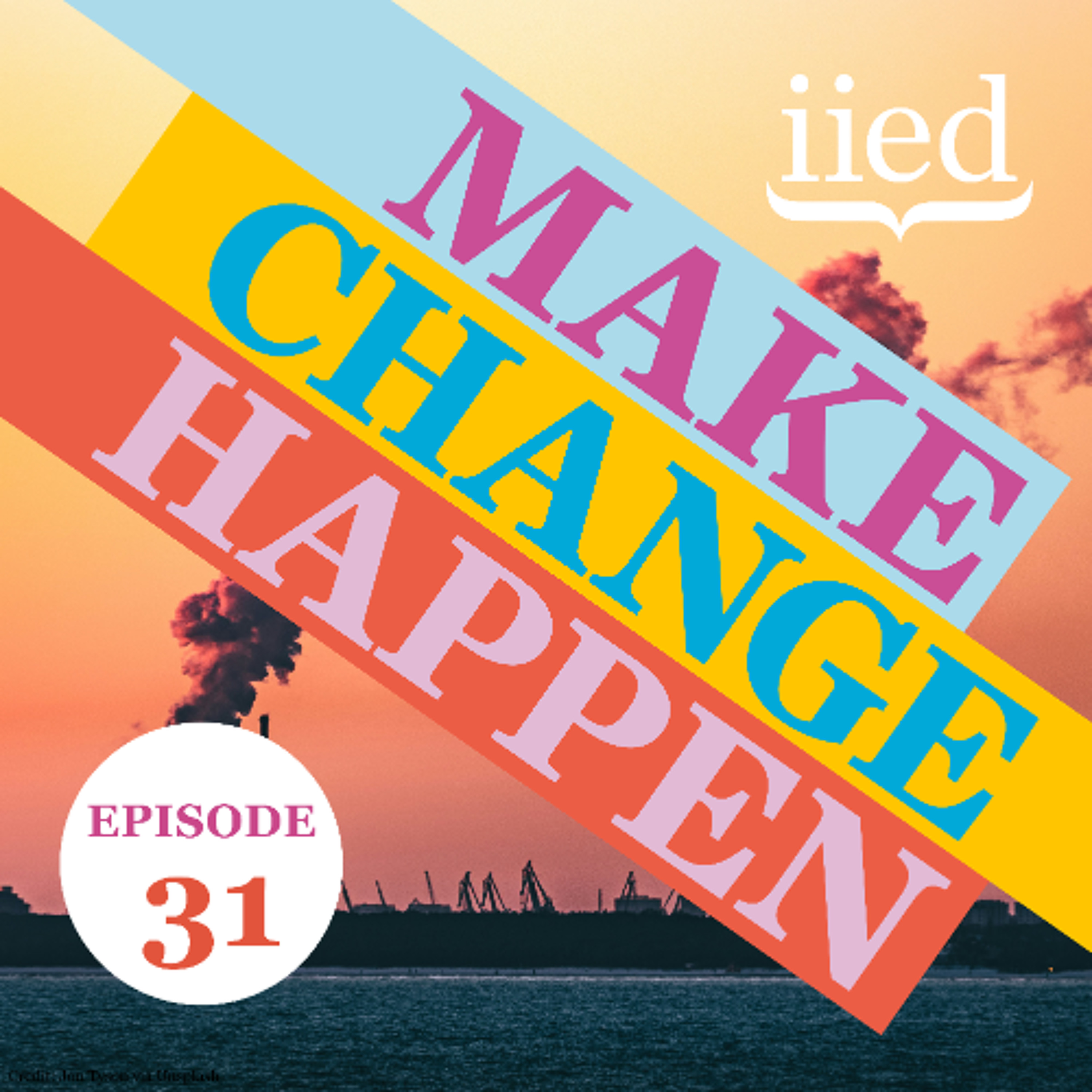
Make Change Happen31. Country climate targets: another missed deadlineIn this episode, IIED’s climate diplomacy researcher Camilla More and senior climate finance researcher Sejal Patel discuss why so many countries missed the recent deadline for submitting their 2035 climate targets – and the implications for global climate action.
2025-02-2014 min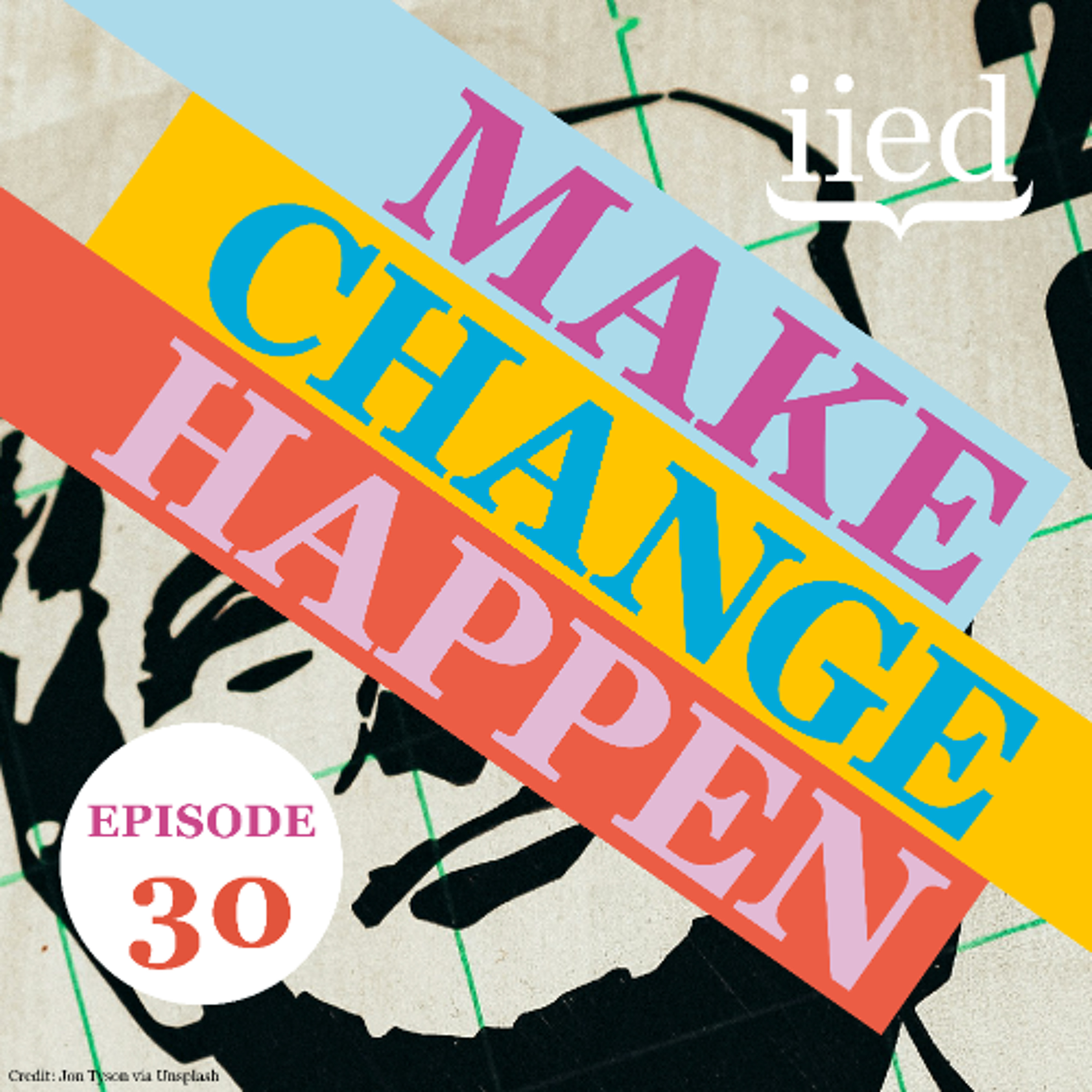
Make Change Happen30. Trump 2.0 and the future of global climate actionIn this episode, IIED’s head of global climate governance, Subhi Barakat, and IIED’s senior press and PR manager, Simon Cullen, discuss what Donald Trump’s recent return to the White House means for international climate action.
2025-01-3015 min
Malo Isem Podcast بودكاست مالو اسمThe Syrian Victory النصر السوريبالحلقة الأولى من "بودكاست مالو اسم"، منسافر ع قلب الحدث، ع سوريا الثورة.رح تسمعوا أصوات من قلب هالأيام، أصوات كتاب وصحفيين حطوا حياتهن ع كف عفريت ليحكوا للعالم شو عم يصير. متل ما وثّقت وعد الخطيب مأساة حلب بفيلم "من أجل سما" (Al-Kateab, 2019)، رح نشوف كيف الإعلام كان أداة لنحكي قصص المصالحة، متل ما بيشرحوا جيك لينش وآنابل مكغولدريك (2005) بمفهوم "صحافة المصالحة".منغوص كمان بكتاب "امرأة في تقاطع نيران" لسمر يزبك (2012)، لنشوف كيف عاشت هالكاتبة هالتجربة، وكيف قدرت توثق بشجاعة مشاعر الخوف والأمل بقلب كل سوري. ومنفكر سوا بدور التكنولوجيا بهالثورة: كيف كانت سلاح بإيد الناس لتوصل صوتها، وبنفس الوقت كيف صارت أداة لمراقبة كل خطوة، متل ما بيوصف ديفيد ليون (2006) بمفهوم "البانوبتيكون الرقمي". ومنشوف كيف منصات متل "أوشاهيدي" يلي هي أداة مفتوحة المصدر لجمع المعلومات من الناس ممكن تكون مصدر الهام لصحافة سوريا بالمستقبلبهالحلقة رح تكتشفوا كيف كل صورة وكل كلمة انكتبت كانت جزء من معركة كبيرة، معركة من أجل الحقيقة. تعوا نسمع، نفهم، ونتأمل سواانضمولي برحلة "نصر سوريا"، ولا تنسوا تشاركوا الحلقة مع اللي بتحبوهن. وخليكن معي ب"بودكاست مالو اسم" لنستكشف سوا أفكار وتساؤلات بتشغلنا كلنا. Host, Script, Research, Editing, Audio Production, Cover Art: NourSegment Intros Music: Janty (Chicho) المراجعAl-Kateab, W. (2019). For Sama [Film]. Channel 4; Frontline.International Institute for Environment and Development. (2011). Ushahidi, or 'testimony': Web 2.0 tools for crowdsourcing crisis information. IIED. https://www.iied.org/sites/default/files/pdfs/migrate/G02842.pdfLyon, D. (2006). Theorizing surveillance: The panopticon and beyond. Willan Publishing.Lynch, J., McGoldrick, A. (2005). Peace journalism. Hawthorn Press.Ushahidi. (n.d.). Ushahidi: The open source platform for community voices. Retrieved December 27, 2024, from https://www.ushahidi.com/Yazbek, S. (2012). A woman in the crossfire: Diaries of the Syrian revolution. Haus Publishing. الكلمات المفتاحية: الثورة السورية، إعلام، أدب، تكنولوجيا، صحافة المصالحة #Podcast (#بودكاست) #ArabicPodcast (#بودكاست_عربي) #NamelessPodcast (#بودكاست_مالو_اسم) #Media (#الإعلام) #Technology (#التكنولوجيا) #Literature (ا#لأدب) (#مالو_اسم) #syria (#سوريا) #arabcontent #حرية #الثورة_السورية #الهوية_الوطنية #سوريا_الحرة #الأمل #عدالة #سلام #دمشق #الثورة #سوريا_الجديدة #syrianrevolution #SyriaFreedom #justice #hope #PeaceForSyria #freesyria #SyrianIdentity #freedom
2025-01-0612 min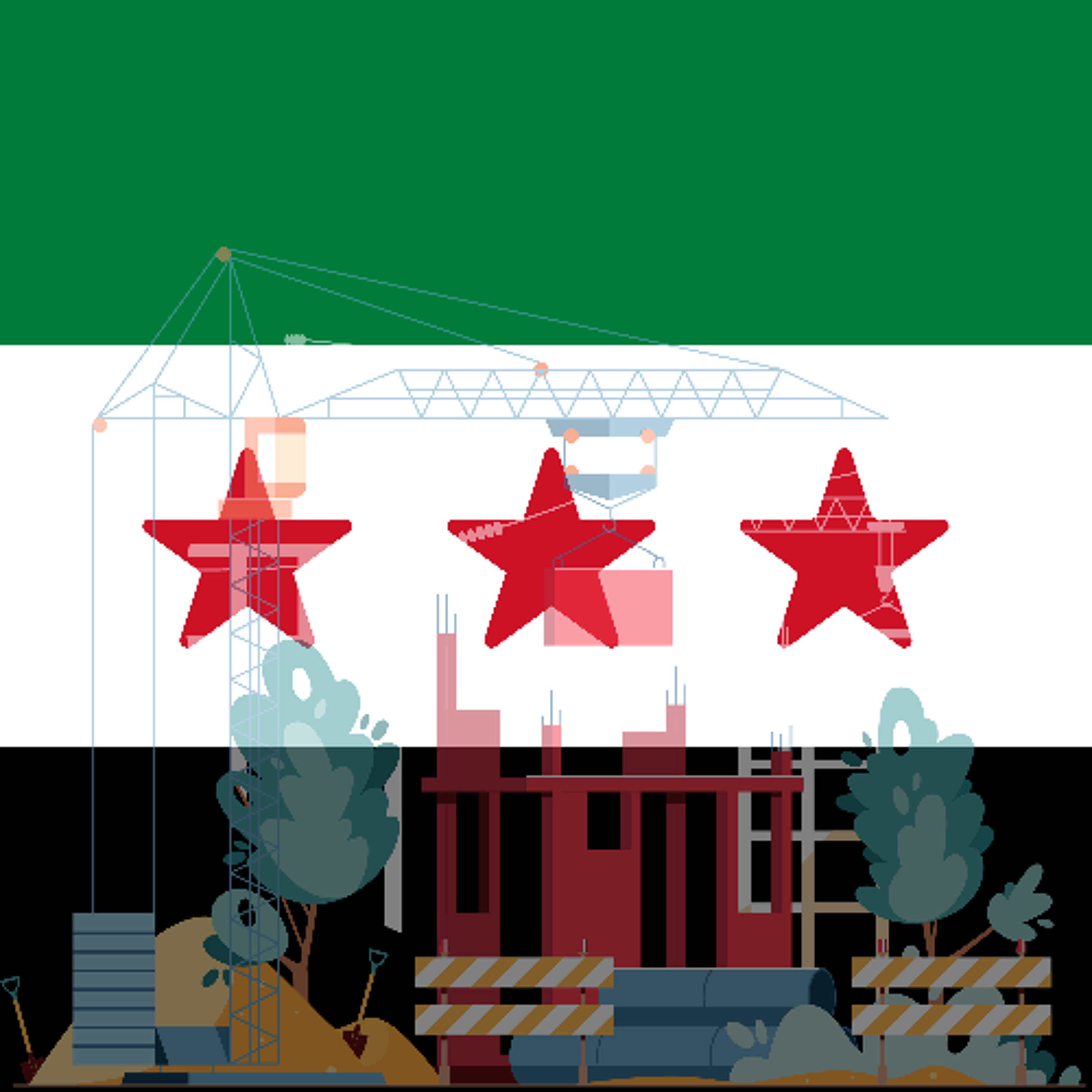
Malo Isem Podcast بودكاست مالو اسمThe Syrian Victory النصر السوريبالحلقة الأولى من "بودكاست مالو اسم"، منسافر ع قلب الحدث، ع سوريا الثورة.
رح تسمعوا أصوات من قلب هالأيام، أصوات كتاب وصحفيين حطوا حياتهن ع كف عفريت ليحكوا للعالم شو عم يصير. متل ما وثّقت وعد الخطيب مأساة حلب بفيلم "من أجل سما" (Al-Kateab, 2019)، رح نشوف كيف الإعلام كان أداة لنحكي قصص المصالحة، متل ما بيشرحوا جيك لينش وآنابل مكغولدريك (2005) بمفهوم "صحافة المصالحة".
منغوص كمان بكتاب "امرأة في تقاطع نيران" لسمر يزبك (2012)، لنشوف كيف عاشت هالكاتبة هالتجربة، وكيف قدرت توثق بشجاعة مشاعر الخوف والأمل بقلب كل سوري. ومنفكر سوا بدور التكنولوجيا بهالثورة: كيف كانت سلاح بإيد الناس لتوصل صوتها، وبنفس الوقت كيف صارت أداة لمراقبة كل خطوة، متل ما بيوصف ديفيد ليون (2006) بمفهوم "البانوبتيكون الرقمي". ومنشوف كيف منصات متل "أوشاهيدي" يلي هي أداة مفتوحة المصدر لجمع المعلومات من الناس ممكن تكون مصدر الهام لصحافة سوريا بالمستقبل
بهالحلقة رح تكتشفوا كيف كل صورة وكل كلمة انكتبت كانت جزء من معركة كبيرة، معركة من أجل الحقيقة. تعوا نسمع، نفهم، ونتأمل سوا
انضمولي برحلة "نصر سوريا"، ولا تنسوا تشاركوا الحلقة مع اللي بتحبوهن. وخليكن معي ب"بودكاست مالو اسم" لنستكشف سوا أفكار وتساؤلات بتشغلنا كلنا.
Host, Script, Research, Editing, Audio Production, Cover Art: Nour
Segment Intros Music: Janty (Chicho)
المراجع
Al-Kateab, W. (2019). For Sama [Film]. Channel 4; Frontline.
International Institute for Environment and Development. (2011). Ushahidi, or 'testimony': Web 2.0 tools for crowdsourcing crisis information. IIED. https://www.iied.org/sites/default/files/pdfs/migrate/G02842.pdf
Lyon, D. (2006). Theorizing surveillance: The panopticon and beyond. Willan Publishing.
Lynch, J., & McGoldrick, A. (2005). Peace journalism. Hawthorn Press.
Ushahidi. (n.d.). Ushahidi: The open source platform for community voices. Retrieved December 27, 2024, from https://www.ushahidi.com/
Yazbek, S. (2012). A woman in the crossfire: Diaries of the Syrian revolution. Haus Publishing.
الكلمات المفتاحية: الثورة السورية، إعلام، أدب، تكنولوجيا، صحافة المصالحة
2025-01-0612 min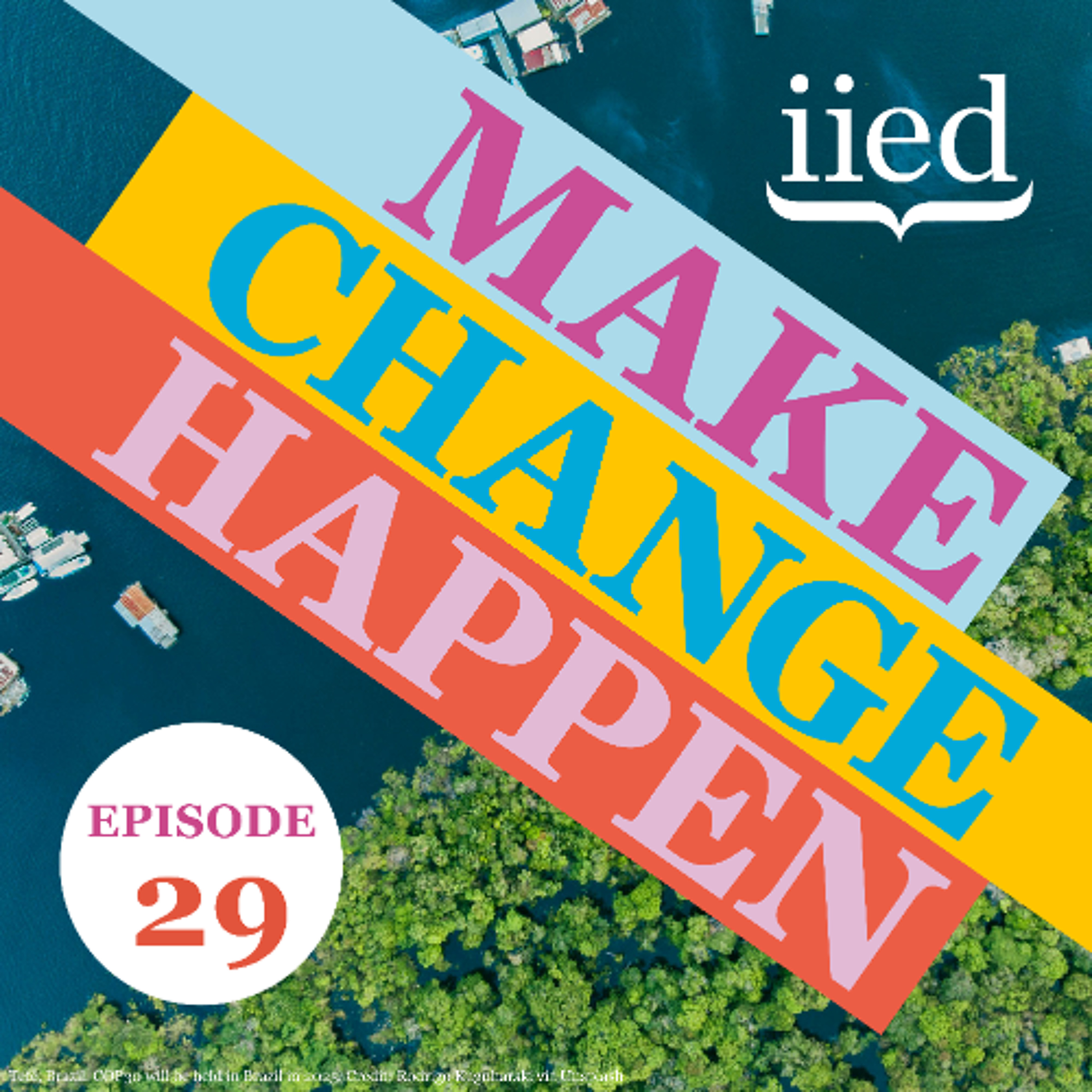
Make Change Happen29. Taking stock – opportunities for action in 2025Our latest episode revisits the key themes covered on Make Change Happen during 2025, including critical minerals, climate action and reform of the international financial architecture.
As well as reflecting on the progress made, our hosts – IIED’s Simon Cullen and Lindlyn Moma – highlight the big opportunities for global action in 2025, discussing what it will take to see change in the nature, climate and inequality crises.
2024-12-1227 min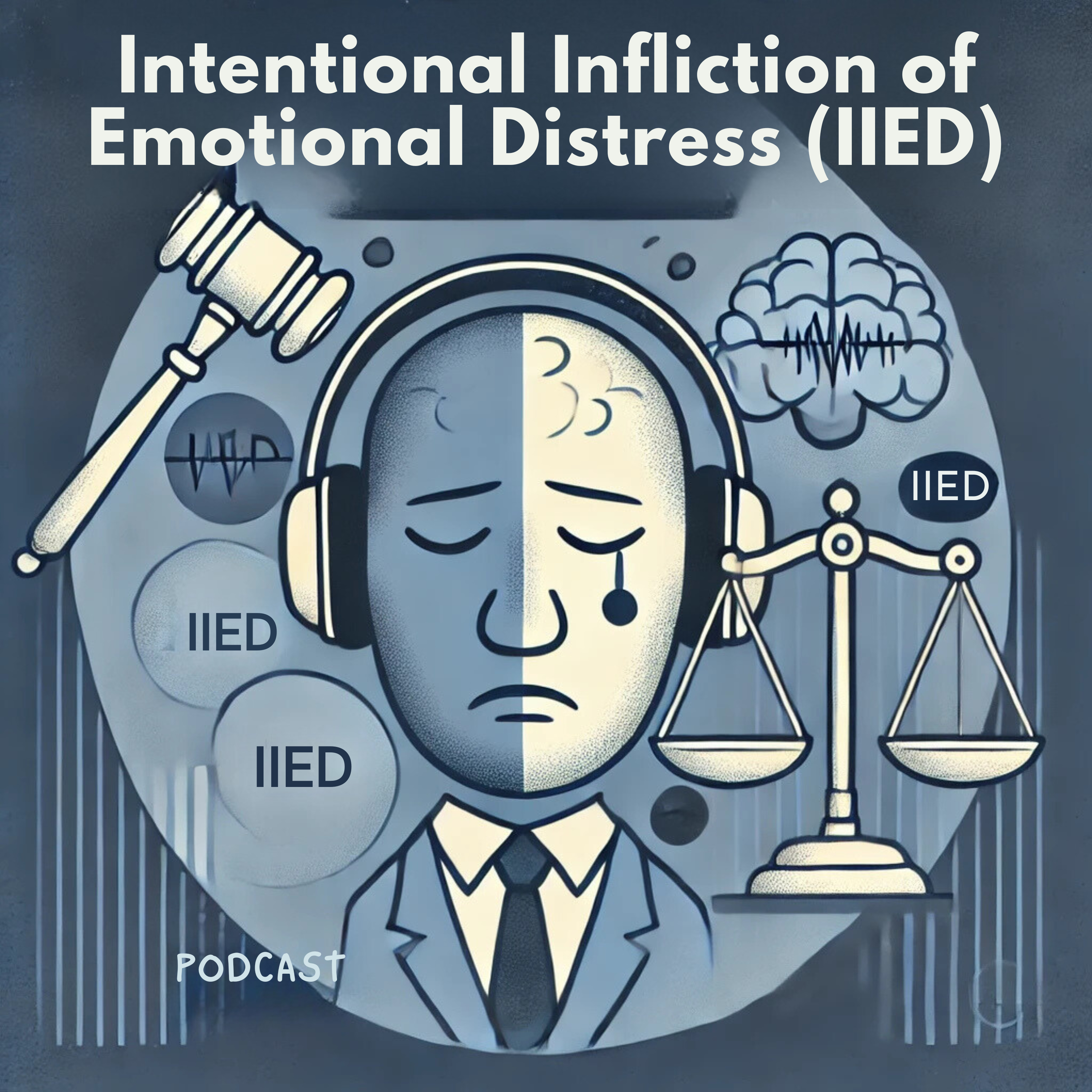
Law SchoolIntentional Infliction of Emotional Distress (IIED)Intentional Infliction of Emotional Distress (IIED)
Source: Excerpts from "Intentional Infliction of Emotional Distress (IIED)"
Main Themes:
Definition and elements of IIED
Examples of outrageous conduct
Requirements of intent or recklessness
Defenses against IIED claims
Application of IIED in specific circumstances (public figures, workplace)
Limitations and challenges of IIED claims
Most Important Ideas/Facts:
1. Definition and Elements:
IIED allows recovery for severe emotional suffering caused by outrageous and intentional conduct.
Four elements must be proven...
2024-11-0618 min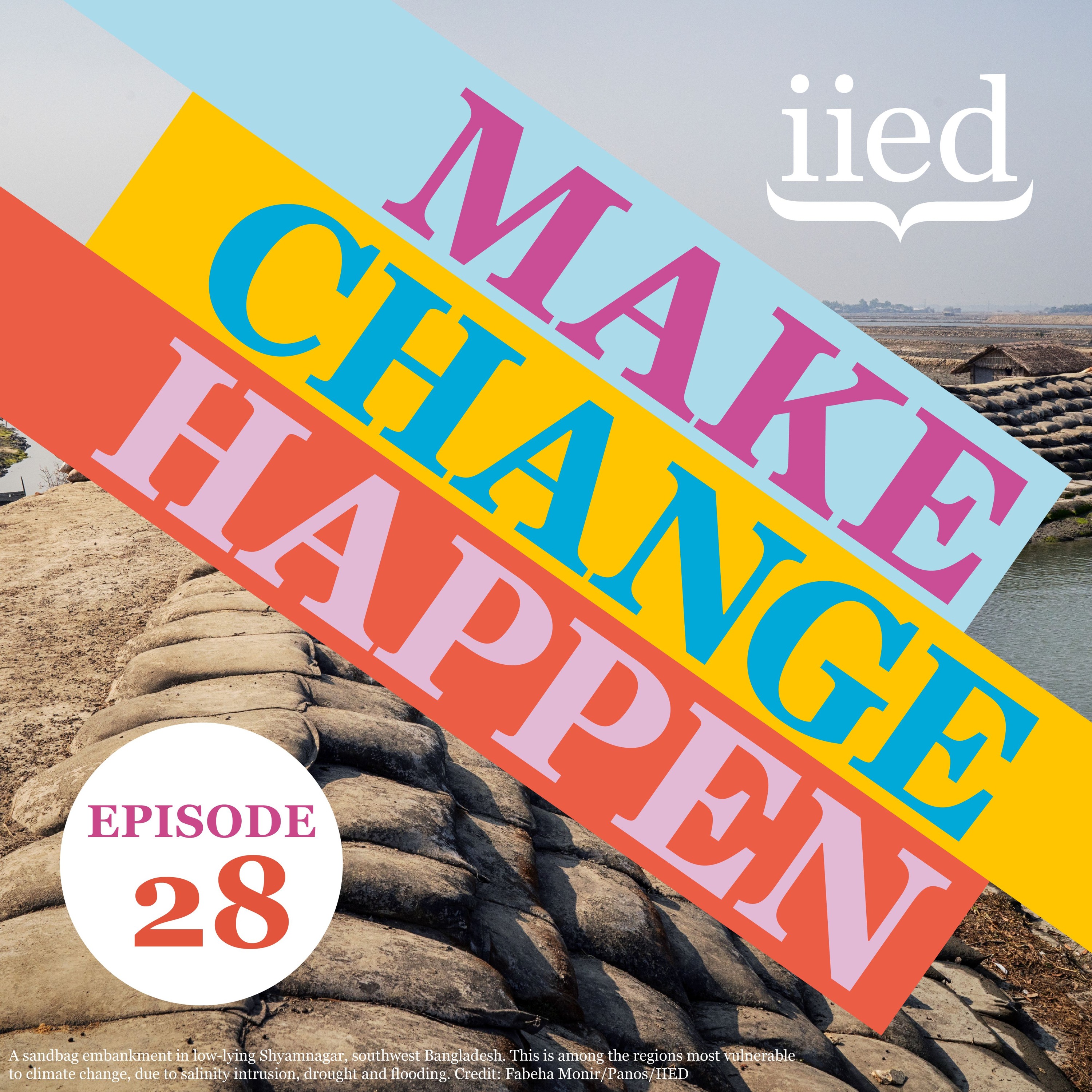
Make Change Happen28. Money, politics and power – reforming the international financial architectureThere is a critical need to reform the international financial architecture (IFA) – the framework of institutions, policies, rules and practices that govern the global financial system.
In the episode, IIED’s Laura Kelly and Mohsen Gul set the scene by explaining why the IFA needs to be fit for purpose and work for everyone, including the least developed countries (LDCs), and why discussions around IFA reforms must include the voices of lower-income countries, LDCs and Small Island Developing States (SIDS).
IIED’s chief economist Paul Steele then outlines three priorities for reform of the IFA. We also hear from IIED’s Ritu B...
2024-09-3024 min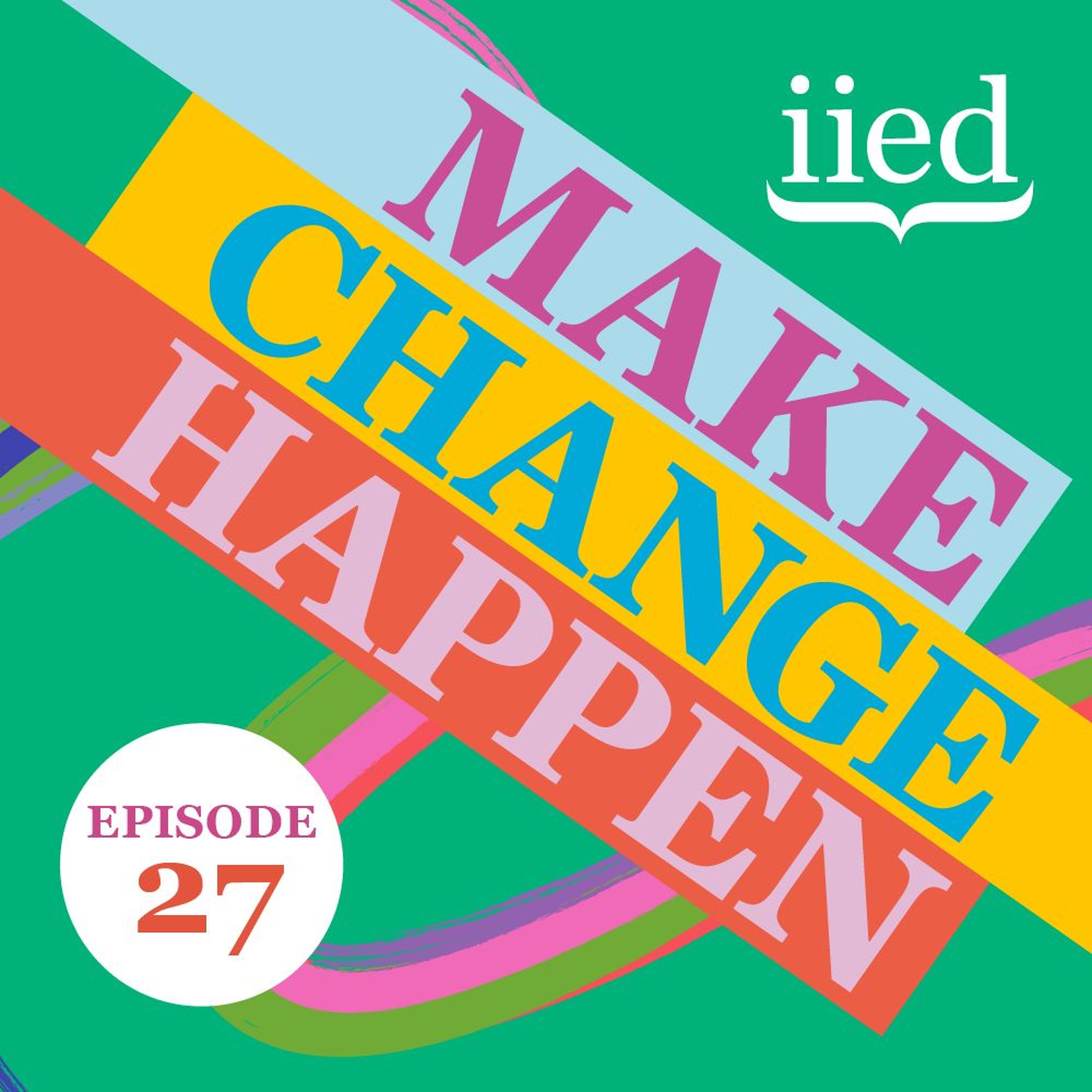
Make Change Happen27. Confronting injustice with collective action – IIED's new manifestoIIED has launched a 'Manifesto for a thriving world’ and the need for new responses to a range of compounding crises, greater uncertainty and growing injustice.
In this episode, the chair of IIED's board of trustees Tara Shine and trustee John Taylor discuss the intitute's plans for the future and changing ways of working.
Tom Mitchell, IIED's executive director, stresses the importance of IIED being outward looking and being grounded in evidence and including the knowledge and voices of Indigenous Peoples and local communities.
And Crissy Guerrero of the Non-Timber Forest Products Exchange Programme in Asia gives a practical example, ou...
2024-07-2522 min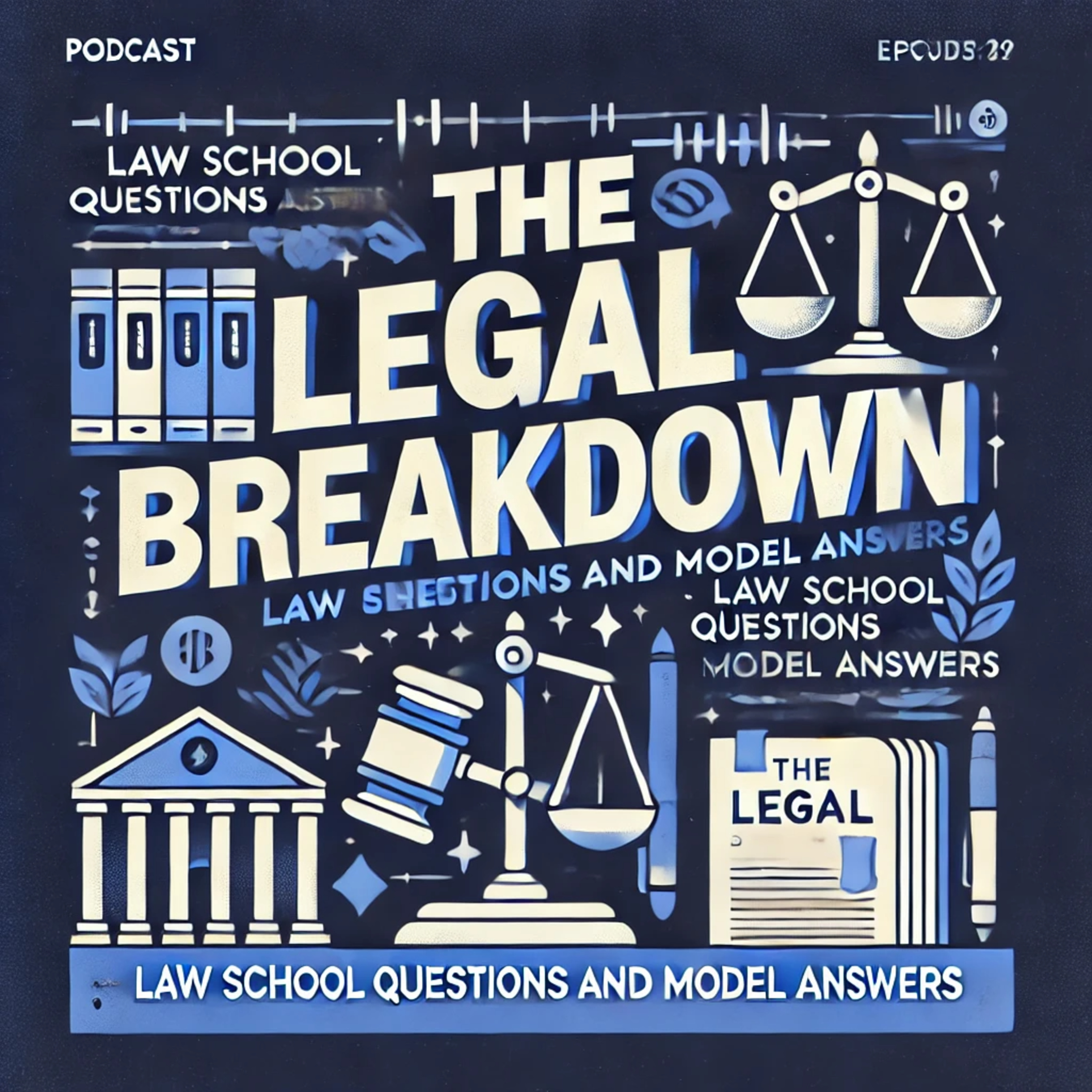
Law SchoolES1: The Legal Breakdown (Law school style questions and model answers)Welcome to "The Legal Breakdown," where we focus on law school-style questions and deliver model answers to help you excel in your studies and beyond.
Each episode, we present a challenging legal question, dissect its complexities, and provide a detailed model answer, guiding you through the reasoning process.
Tort Law Exam Question: Jane and Bob are having a heated argument in a park. During the argument, Jane raises her fist and yells, "I'm going to punch you right now!" Bob, fearing imminent harm, steps back. At that moment, Jane's friend Mike, without permission, takes Bob's...
2024-07-0418 min
Law SchoolTorts Chapter 2: Intentional Torts (Part 1)Summary of Chapter 2: Intentional Torts.
Chapter 2 of the Tort Law Hornbook delves into the category of intentional torts, which involve deliberate actions that cause harm to others. The key intentional torts discussed include battery, assault, false imprisonment, intentional infliction of emotional distress (IIED), trespass to land, trespass to chattels, and conversion.
Battery: Defined as intentional and harmful or offensive physical contact with another person without consent. Key elements include intent, contact, and the harmful or offensive nature of the contact. Defenses include consent, self-defense, and defense of others.
Assault: Involves creating a reasonable...
2024-06-2635 min
Law SchoolTorts Chapter 2: Intentional Torts (Part 2)Summary of Chapter 2: Intentional Torts.
Chapter 2 of the Tort Law Hornbook delves into the category of intentional torts, which involve deliberate actions that cause harm to others. The key intentional torts discussed include battery, assault, false imprisonment, intentional infliction of emotional distress (IIED), trespass to land, trespass to chattels, and conversion.
Battery: Defined as intentional and harmful or offensive physical contact with another person without consent. Key elements include intent, contact, and the harmful or offensive nature of the contact. Defenses include consent, self-defense, and defense of others.
Assault: Involves creating a reasonable...
2024-06-2636 min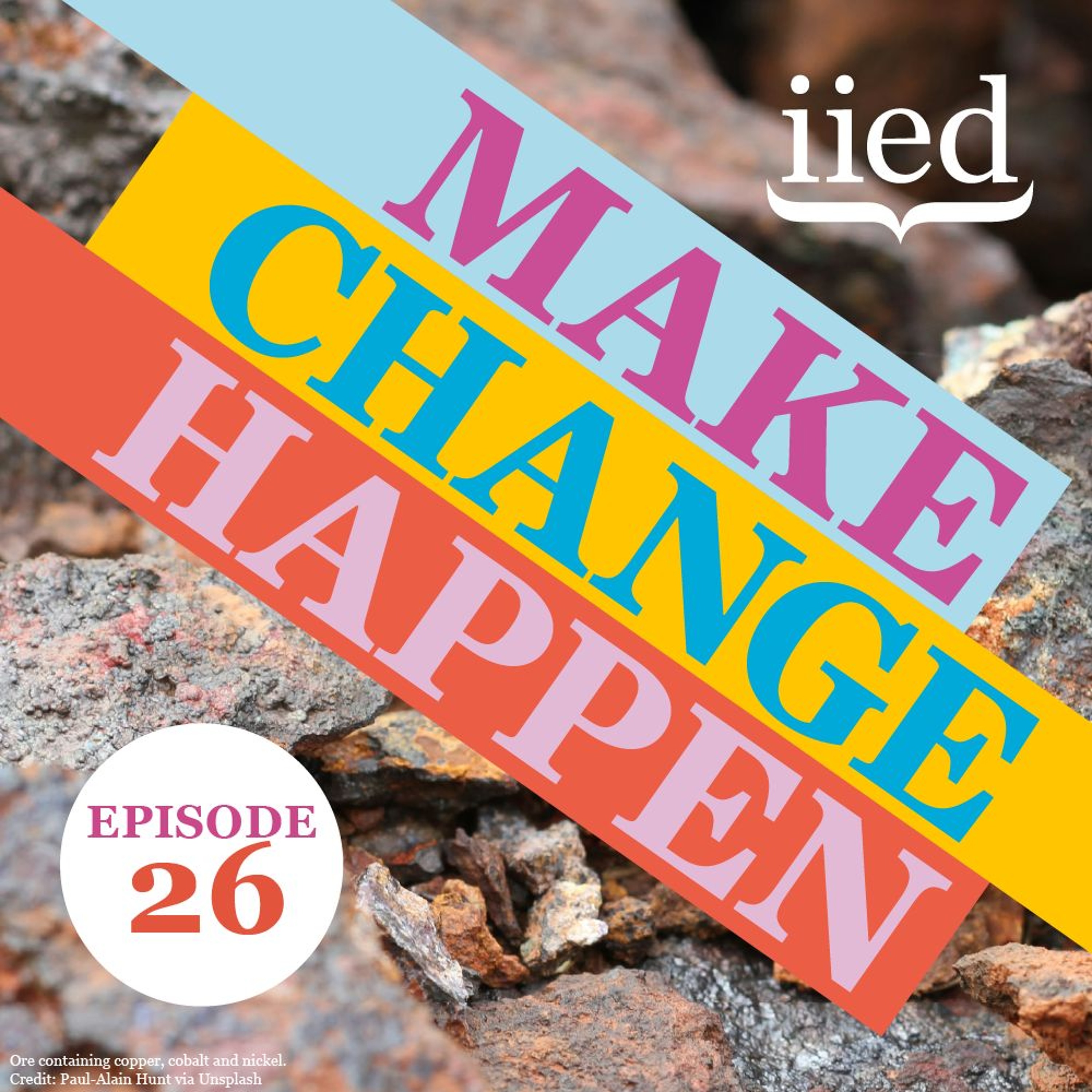
Make Change Happen26. Critical minerals and the green energy transitionCritical minerals – such as cobalt, lithium and copper – are in the headlines, attracting global attention for their potential in supporting the green energy pathway and accelerating the shift away from fossil fuels.
They make green technologies including electric vehicles, solar panels and wind turbines possible. The opportunities are huge and demand is booming.
But this doesn't come without issues. If not managed well, extraction can have negative impacts on communities, ecosystems and local economies.
This episode is a conversation between IIED senior researcher Eric Bisil and executive director of Africa Resources Watch (Afrewatch) Emmanuel Umpula. They discuss the potential of crit...
2024-05-2322 min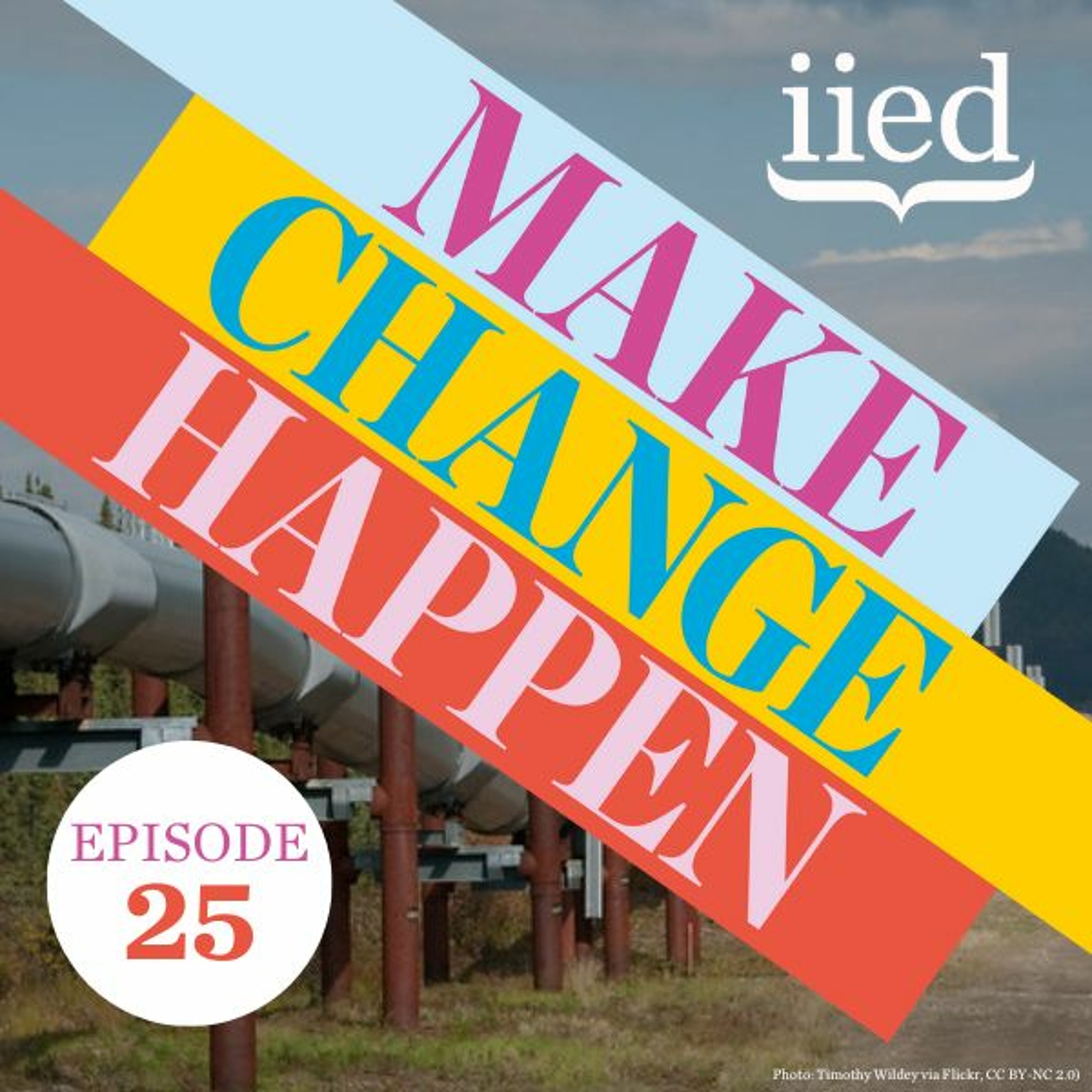
Make Change Happen25. Hidden handbrakes – what’s holding back climate action?Despite global efforts to tackle the impacts of climate change, we are failing to achieve critical climate objectives. IIED’s Hidden Handbrake campaign aims to reveal and explain the bureaucratic, political, legal and practical barriers to countries taking effective action in response to climate change.
Progress on mitigation and adaptation measures and anticipatory actions to reduce the potential of loss and damage is drastically slowed where these barriers exist. They must be brought out into the open, challenged and removed.
This episode is a conversation between Tom Mitchell, executive director of IIED, and Sejal Patel, a senior researcher in IIED fo...
2024-01-3125 min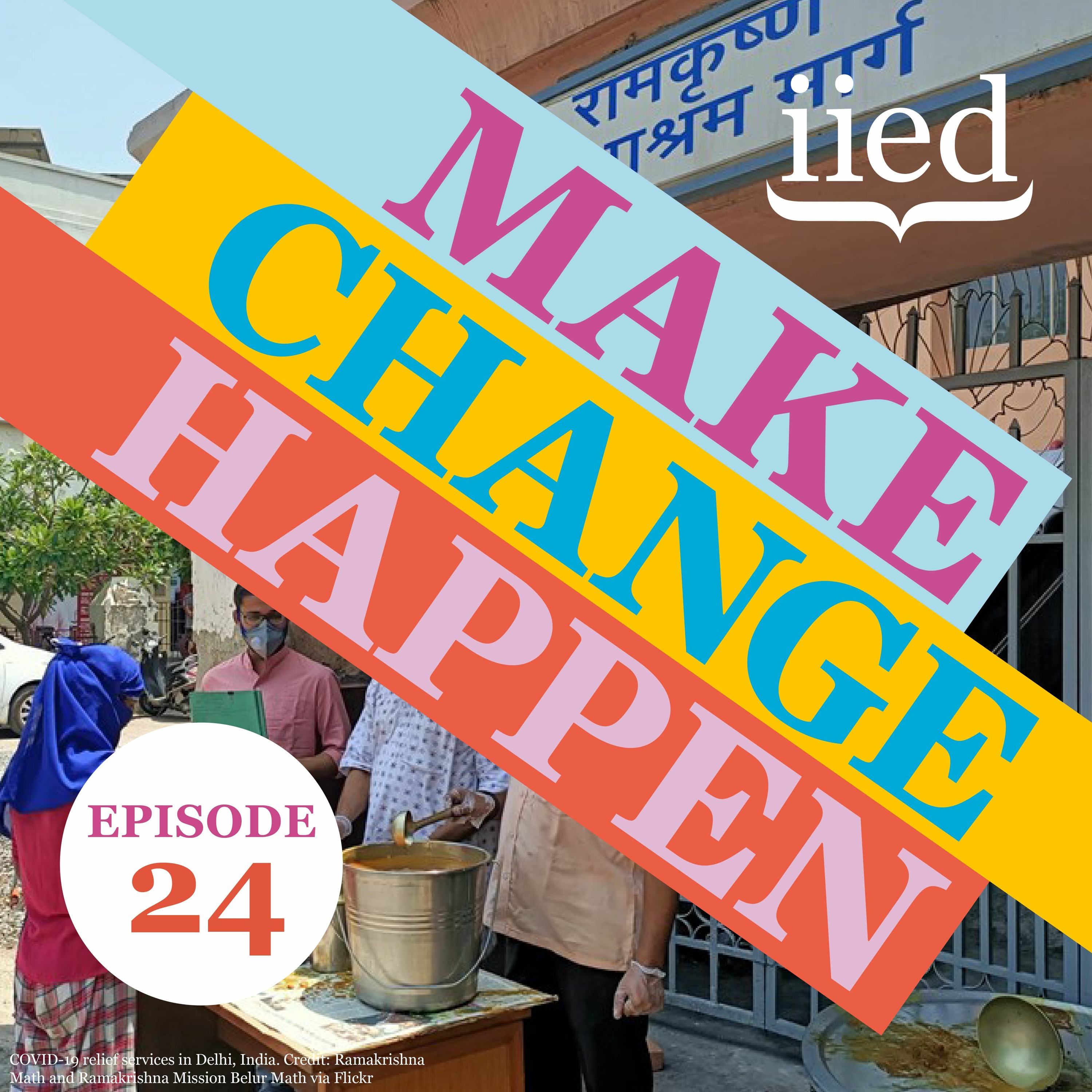
Make Change Happen24. Filling in the gaps: how Delhi organisations provided food relief during COVID-19This special guest episode, produced by the Indian Institute for Human Settlements (IIHS) looks at the work of a social network in Delhi that delivered food relief during the COVID-19 pandemic. The Delhi Coordinated Relief Network succeeded in reaching some of the most vulnerable neighbourhoods in the city during an unprecedented crisis.
This episode of Make Change Happen is hosted by Rashee Mehra of the Indian Institute for Human Settlements, with guests Juhi Jain, deputy director of the Centre for Advocacy and Research and Dr Gautam Bhan, the associate dean of the School of Human Development at IIHS.
2023-10-1849 min
The Clinker FactorClimate Change Impact and AdaptationIn the latest episode of the Clinker Factor, Ian Riley speaks to Tom Mitchell, Executive Director of the International Institute for Environment and Development (IIED), on the potential of the Loss and Damage Fund, the pressures that climate-vulnerable developing countries face, and the innovative approaches we can take to combat climate change.
2023-09-0428 min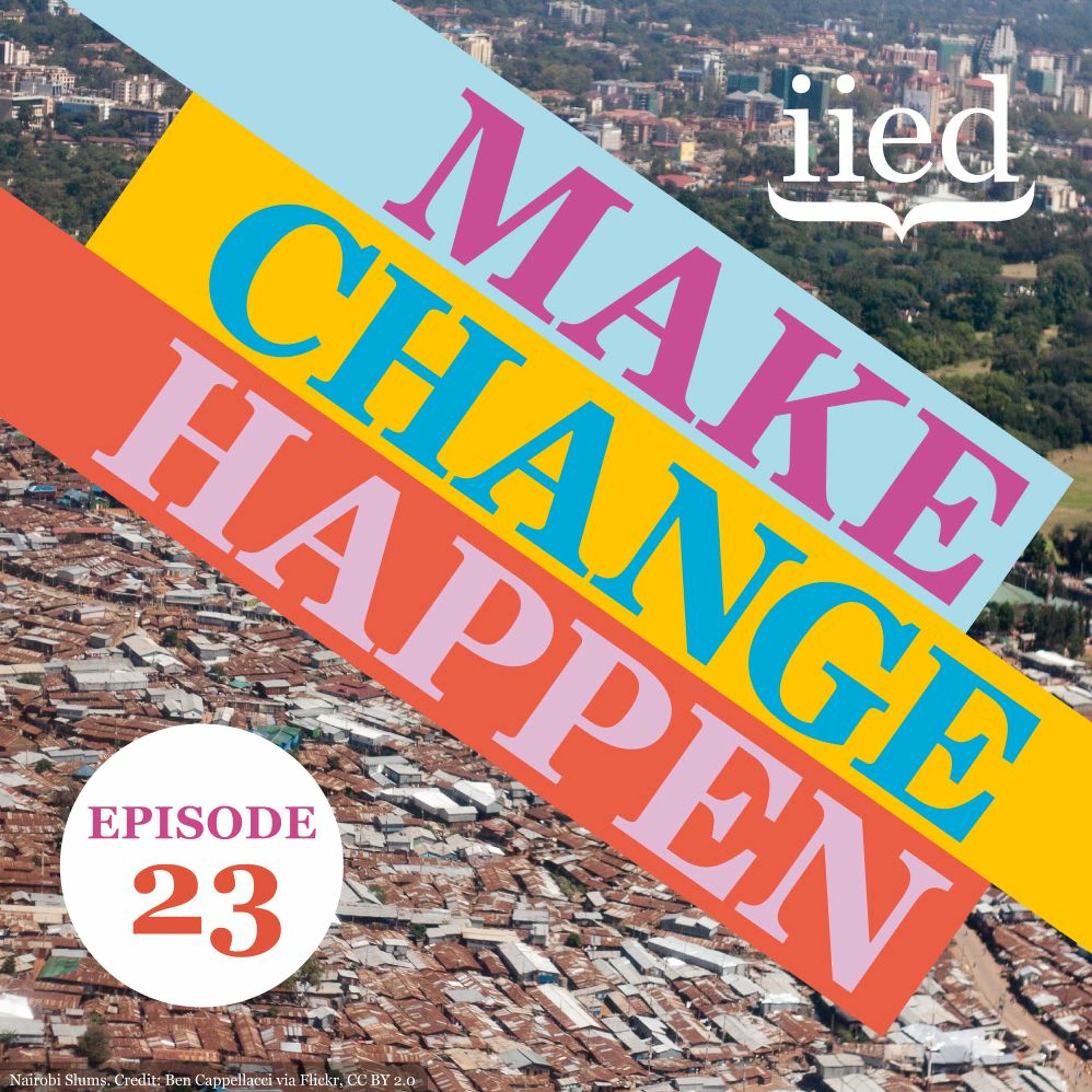
Make Change Happen23. Help cities help people – bringing everyone together in the refugee responseAccording to UNHCR, the global number of people forcibly displaced by conflict, violence, human rights abuses, and other forms of persecution has reached 110 million. When asked to imagine the living conditions of refugees and internally displaced people (IDPs), rows of white tents or temporary structures often come to mind. In fact, around 60% of refugees and IDPs live in towns and cities.
This episode of Make Change Happen is hosted by Lucy Earle, director of IIED's Human Settlements research group, and features Nassim Majidi, co-founder and executive director of Samuel Hall; Jack Makau, associate director of Slum Dwellers International in Kenya...
2023-08-1731 min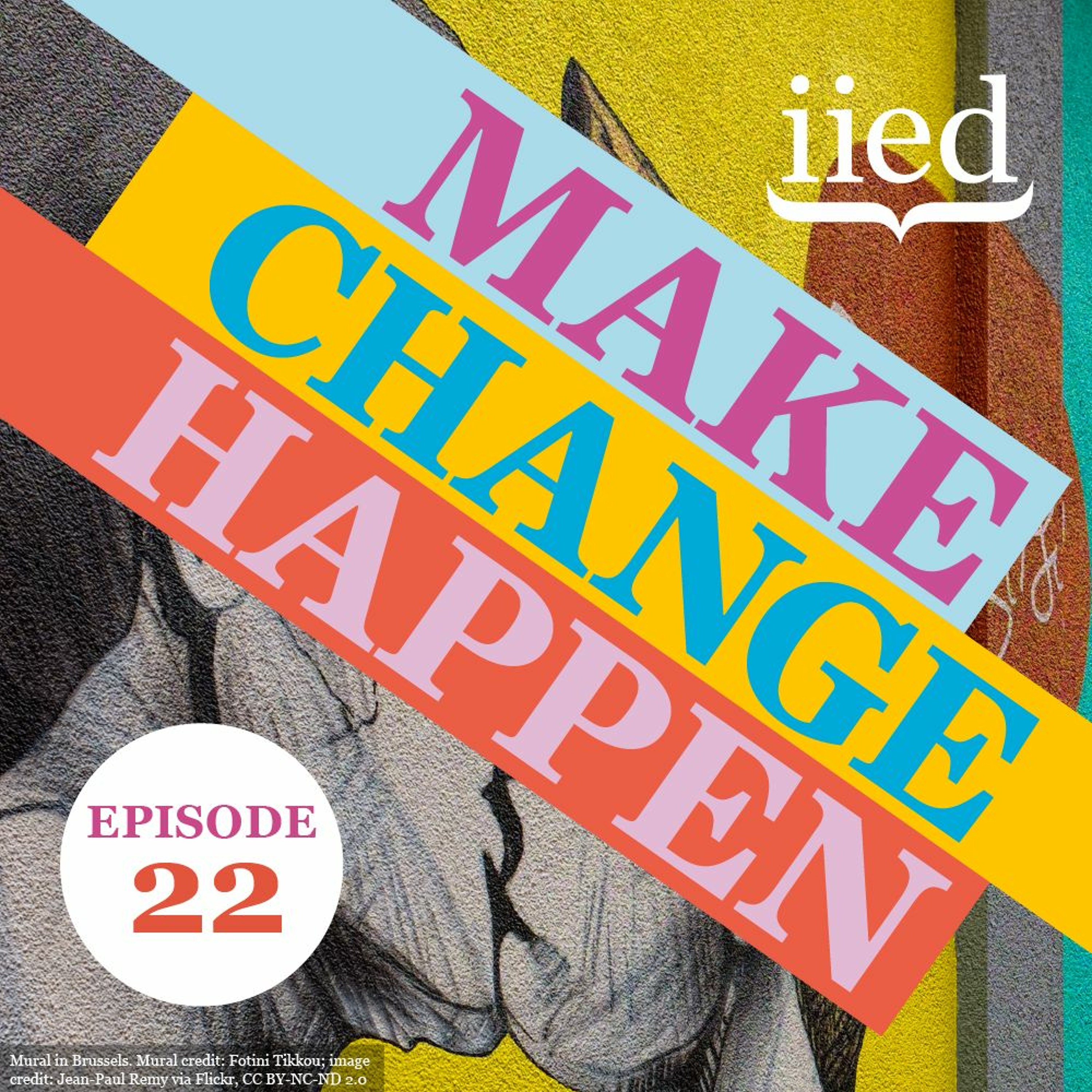
Make Change Happen22. Challenging queer erasure in climate action and urban developmentIn this episode of Make Change Happen, marking LGBTQI+ Pride month, we want to spark conversations about how urban development and climate action can be truly inclusive of queer communities. What can we learn from queer thinking and practice? How can we challenge LGBTQI+ erasure in decision making to deliver stronger and more equitable change?
Hosted by Tucker Landesman, senior researcher in IIED’s Human Settlements research group, this podcast features lawyer and urban planner Rodrigo Faria G. Iacovini, working with the Instituto Pólis in Sao Paul, Brazil and queer activist Sarah Louis Montgomery, project coordinator at the global netw...
2023-06-2637 min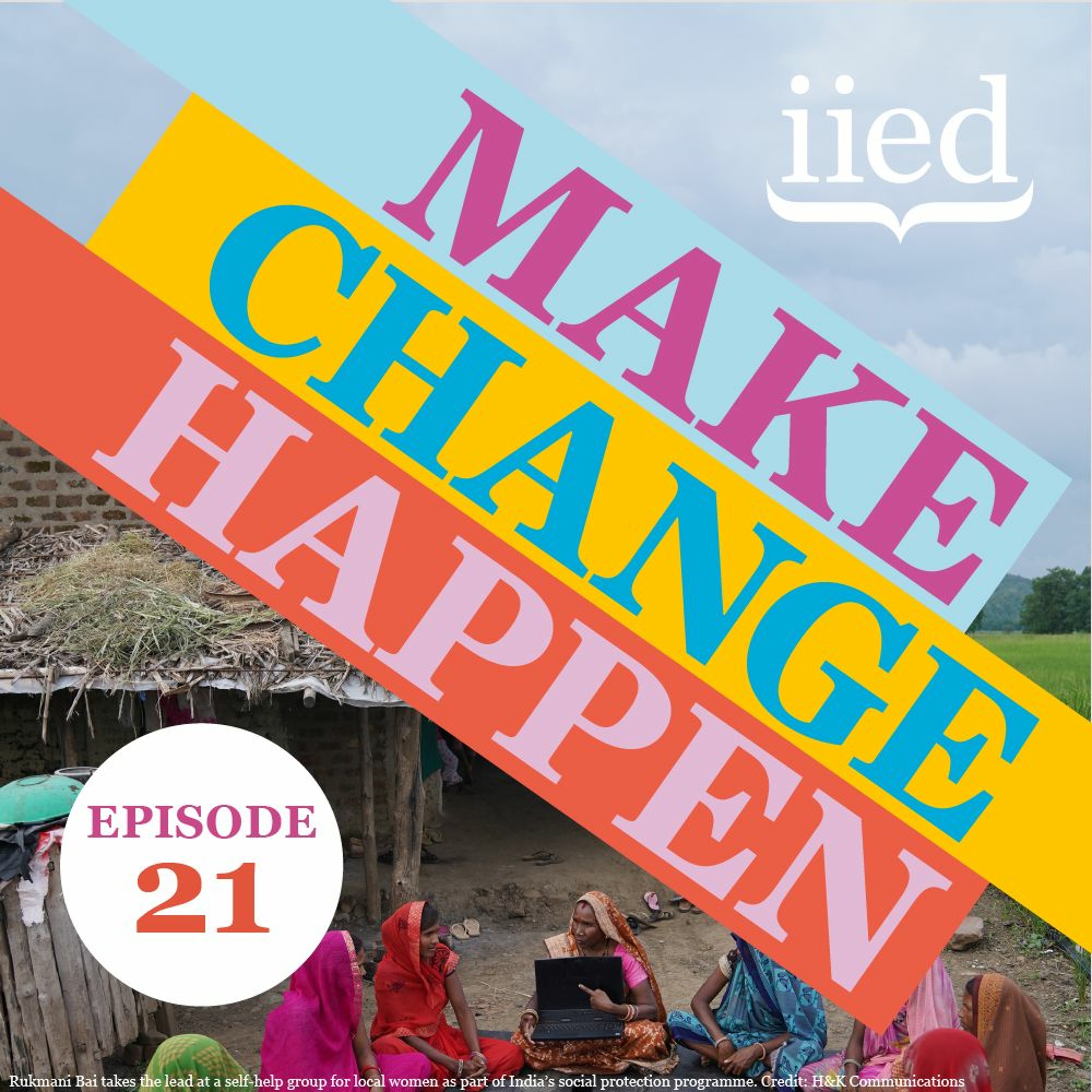
Make Change Happen21. Ripple effects and revolutions: women leaders in climate and biodiversityIn this episode, launched to coincide with International Women’s Day, an all-women panel share the transformative change driven by women as they take on leadership roles at every level – from remote rural villages to international conventions.
Hosted by James Persad, director of IIED’s Communications group, this podcast features Ritu Bharadwaj, principal researcher in IIED’s Climate Change research group; Omaira Bolaños, director of the Latin America and Gender Justice programmes at Rights and Resources Initiative; and Ivonne Higuero, secretary-general of CITES.
Participants discuss what women leadership looks like, why spaces must be created for women leaders in climate a...
2023-03-0732 min
9 to 5 with Avi & Anita“Take it or leave it” and other hiring manager idiomsToday on the podcast we talk to Lucy Earle, who is Director (interim), Human Settlements at the International Institute for Environment and Development. We talk taking risks, how treating new hires badly backfires and the unmitigated pleasure of travelling alone for work. Lucy’s work focuses on the intersections of urbanisation, urban poverty and humanitarian crises, in particular forced displacement in urban areas. Prior to joining IIED, Lucy was an urban advisor at the UK’s Department for International Development (DFID) and was seconded to the International Rescue Committee (IRC) to support a programme on improving humanitarian respo...
2023-02-0132 min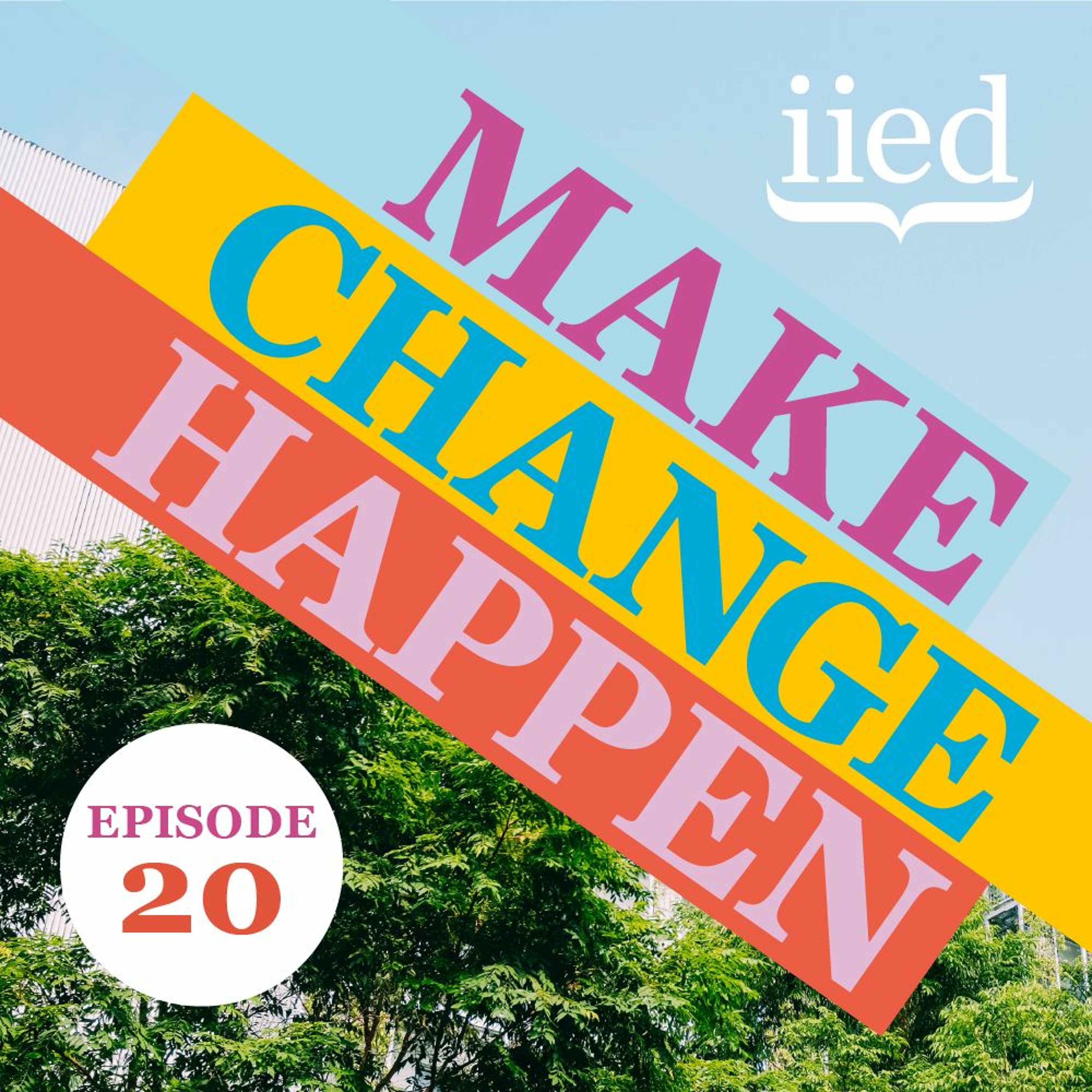
Make Change Happen20. Can mitigation deliver better cities in the global South?Our last episode of 2022 brings together experts from across the world to explore how far climate mitigation action can respond to pervasive urban poverty in the global South – seen in a lack of housing and basic services such as water, sanitation and energy – and contribute to more just and equitable cities.
This special episode is hosted by Anna Walnycki, principal researcher in IIED’s Human Settlements research group. Alongside two IIED colleagues, principal researcher Aditya Bahadur and researcher Tucker Landesman, she is joined by two experts working on urban mitigation projects. Bijal Brahmbhatt is executive director of the Mahila Housing Trust...
2022-12-1926 min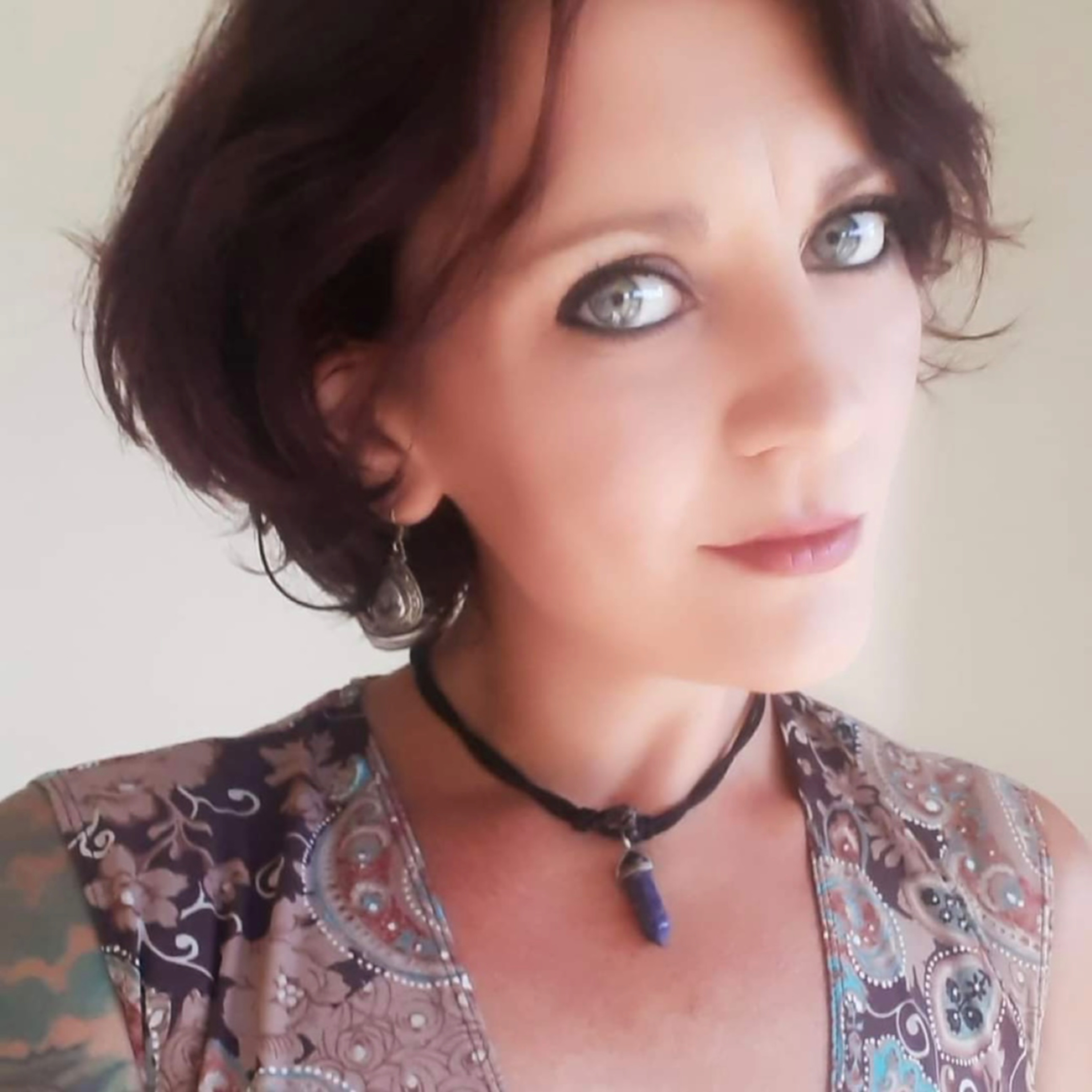
Slam the GavelCadence Harper Speaks Out On Her Group, USA Family Court Class Action On Facebook And Your 5th Amendment Rights Slam the Gavel welcomes Cadence Harper, a 34 year-old Mother who grew up in Family Court and unfortunately is still in it. She is the Mother of a wonderful 13 year-old daughter. She is also an Army Veteran and Business owner of Farm Fairy, LLC.
Cadence is also an advocate of a social media platform on Facebook, called: USA Family Court: Class Action Team. We discussed her platform and how she has been wanting Family Court to just do the right thing. Cadence states she does have CPTSD and Attachment issues and has been trying to fix what was done to her a...
2022-12-1753 min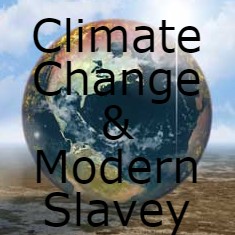
The Doctor Is IN! Discussions about Health & Human TraffickingClimate Change and Modern SlaveryI discuss the connection between climate change and modern slavery. Is the former causing the latter? What should we be considering when thinking about these two huge issues? The links to people, books, and reports I mentioned, as well as a lot more that are on several sides of this issue so you can form your own conclusions.
Michael Shellenberger https://shellenberger.org/
Bjorn Lomborg https://www.lomborg.com/
https://publications.iom.int/system/files/pdf/mecc_infosheet_climate_change_nexus.pdf
https://www.iied.org/climate-change
https://ourworldindata.org...
2022-12-0638 min
The Times Of India PodcastA fund to recover from disastersTOI's Vishwa Mohan rounds up the big outcomes from the latest climate change summit and IIED's Ritu Bharadwaj explains why the loss and damage fund isn't reason for cheer just yet
2022-11-2327 min
Slam the GavelMarineka Bowman And Nick Giles Discuss Kangaroo Courts And What Really Is IIED Slam the Gavel welcomes back Marineka Bowman and Nick Giles to the podcast. They were last on Season 3, Episode 159. We discussed several topics including the definition of a Kangaroo Court as well as what Family Court puts families through, using them as pawns for money, traumatizing children.
Also discussed was the subject of IIED. Intentional Infliction of Emotional Distress. This is a civil tort from common law and is a gap filler tort. IIED is an acronym for Intentional Infliction of Emotional Distress sometimes called tort of outrage. There is also what is called negligent infliction of emotional distres...
2022-11-2256 min
Slam the GavelMarineka Bowman And Nick Giles Discuss Kangaroo Courts And What Really Is IIED Slam the Gavel welcomes back Marineka Bowman and Nick Giles to the podcast. They were last on Season 3, Episode 159. We discussed several topics including the definition of a Kangaroo Court as well as what Family Court puts families through, using them as pawns for money, traumatizing children. Also discussed was the subject of IIED. Intentional Infliction of Emotional Distress. This is a civil tort from common law and is a gap filler tort. IIED is an acronym for Intentional Infliction of Emotional Distress sometimes called tort of outrage. There is also what is called negligent infliction of emotional distre...
2022-11-2256 min
African CitiesNavigating Freetown's housing challengesWhat is ACRC’s research in Freetown all about? How does housing connect with land, youth employment and the rising costs of imported materials? How do political systems both help and hinder meaningful change? What attention is paid to informal settlements? Does the government’s agenda intersect with residents’ needs, and where are the gaps? And how can these gaps be explored and understood, to drive forward urban reform processes?These are some of the key questions explored as part of a recent radio segment on Radio Democracy 98.1 FM’s Freetown Urban Talk, which brought together key ACRC res...
2022-11-1057 min
Solarpunk PromptsThe Great Infrastructure ProjectThe Great Infrastructure Project
Maintaining infrastructure is hard even when your governments are stable. In this episode we explore the reality of crumbling infrastructure on a small town and envision an optimistic future where collaboration overcomes the challenges.
Transcript: https://wiki.tomasino.org/writing/Solarpunk-Prompts---The-Great-Infrastructural-Project
Links mentioned:
http://pubs.iied.org/10710IIED.html?k=acccrn&r=p
https://www.mottmac.com/views/leaving-a-social-legacy-from-infrastructure
Fediverse address - @SolarpunkPrompts@podcast.tomasino.org
Music from:
Bathroom Plants - New Unity Dawning - https://globalpattern.bandcamp.com/album/solarpunk-a-brighter-perspective
2022-11-0612 min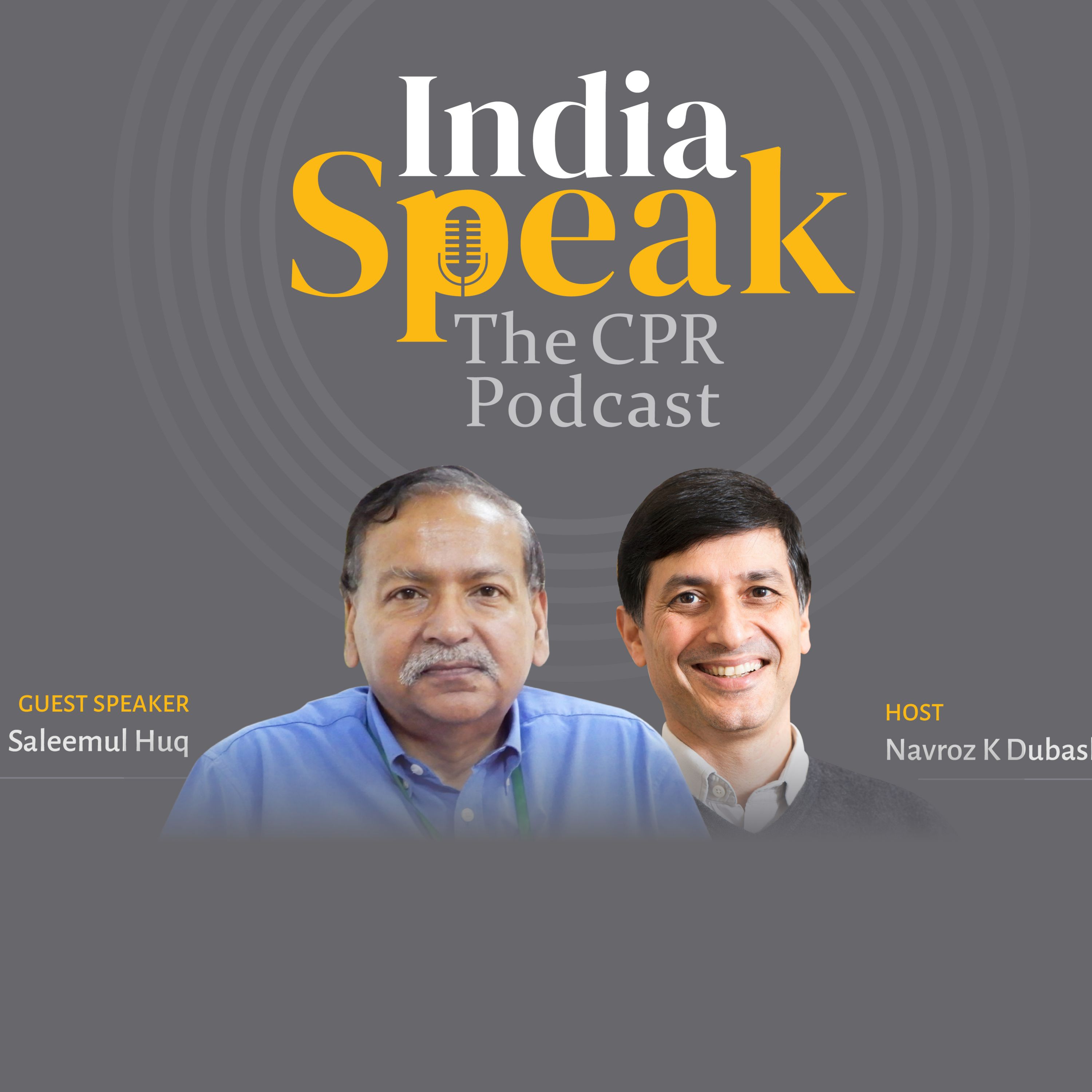
India Speak: The CPR PodcastEpisode 37: Road to COP27: The Loss and Damage AgendaIn the second episode of Road to COP27, a special series as part of India Speak: The CPR Podcast, Navroz K. Dubash speaks to Saleemul Huq, Director of the International Centre for Climate Change and Development (ICCCAD) in Bangladesh, on the loss and damage debate that is expected to play a substantial role on the agenda. This series will bring leading experts in the lead up to Conference of the Parties (COP) 27, taking place from 6-18 November 2022 at Sharm el-Sheikh, Egypt. They discuss the growing calls from developing countries for financial support to deal with the impacts of extreme climate e...
2022-10-2751 min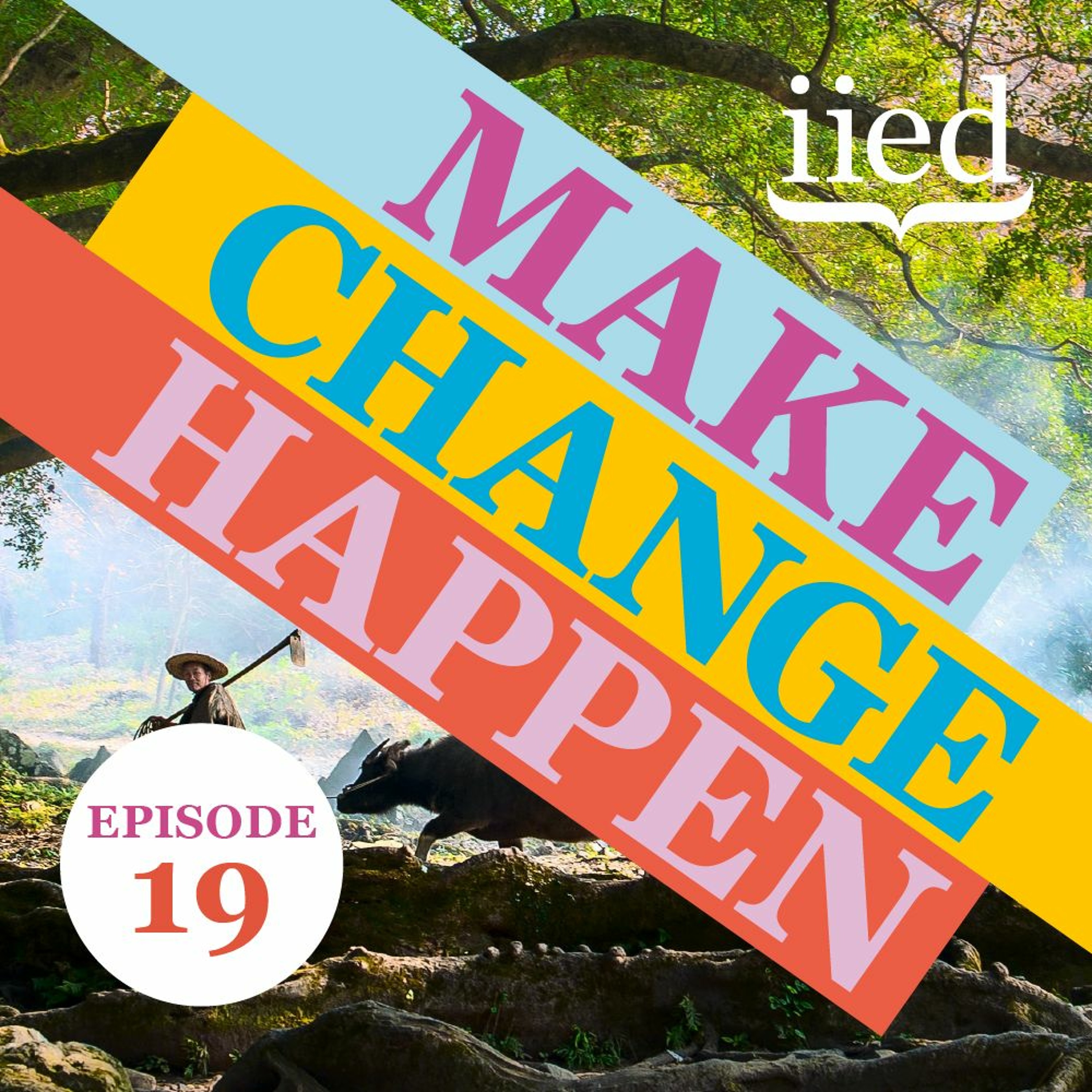
Make Change Happen19. A spur to action – getting money to the local level for nature and climateAt COP26, political leaders called for more action to address biodiversity loss and climate change together. In this episode of Make Change Happen, we discuss how this must be financed and the possible mechanisms for spurring actions on the ground.
Hosted for the first time by James Persad, IIED’s new director of communications, this episode features Mandy Barnett from the South African National Biodiversity Institute (SANBI), Moses Egaru of the International Union for Conservation of Nature (IUCN), Yiching Song from the Farmers’ Seed Network China and Xiaoting Hou Jones, senior researcher at IIED's Natural Resources research group.
2022-09-2138 min
The Times Of India PodcastDecoding Pakistan's floods and the lessons for IndiaIslamabad-based climate risk expert Ali Sheikh explains the worries after Pakistan's massive floods and IIED's Aditya Bahadur lists the lessons for India
2022-09-0125 min
EXALT PodcastUsman Ashraf - Who could lose from planting billions of trees in Pakistan?This month we were delighted to be joined by fellow University of Helsinki, Global Development Studies doctoral researcher, Usman Ashraf. Usman moved from the natural sciences to the social sciences and his research focuses on Chinese investment in Pakistan’s forestry sector. In particular we talked about the Billion Tree Tsunami Afforestation project and the subsequent 10 Billion Tree Tsunami Afforestation project. We touched on the landscape changes that attend this kind of project and the impacts that these projects have on the human and other than human beings in the affected areas. He gives us insight into how the im...
2022-08-2658 min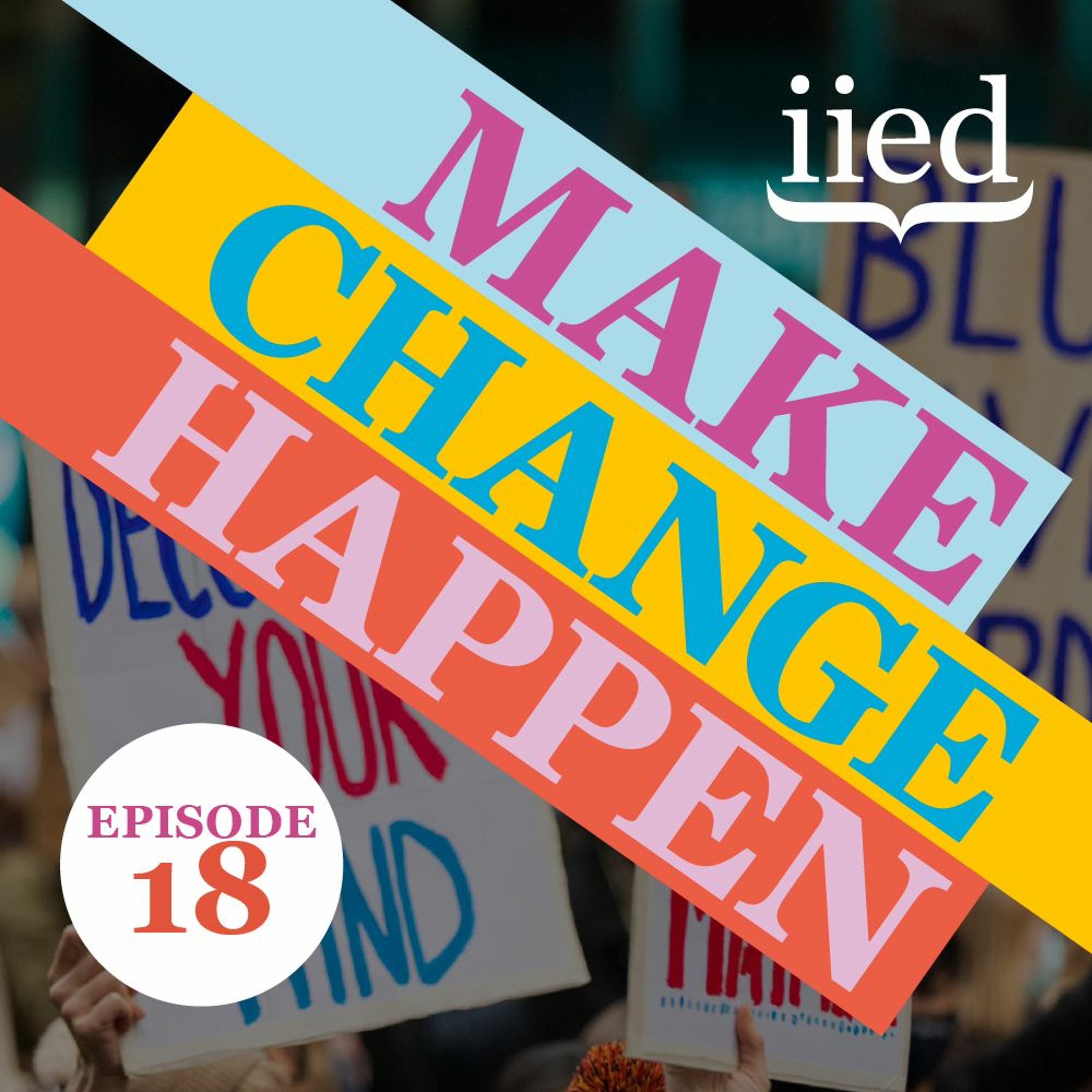
Make Change Happen18. Uncomfortable conversations? Confronting development’s White gazeIn this episode of Make Change Happen, we discuss racism and decolonisation in the development sector.
Hosted by Liz Carlile, IIED’s outgoing director of communications, this episode features Natalie Lartey, IIED’s advocacy and engagement manager; Maryam Mohsin, head of media and communications at Bond; and Mpho Tapela, executive director of Youth Unlimited Network in Botswana.
We explore how development organisations have responded to the Black Lives Matter movement, with a particular focus on language and narratives.
2022-07-2041 min
Beneath the BaobabSupporting Sustainable Livelihoods ft. Dr Dilys Roe and Sam ShabaIn this episode of Beneath the Baobab, Gordon Buchanan takes a look at the human dimensions of conservation. Dr Dilys Roe @dilysroe and Sam Shaba share examples of models for supporting livelihoods and wildlife to thrive in shared spaces, from ecotourism and carbon credit schemes to incentivisation of the sustainable use of natural resources. Dilys is Chair of the Sustainable Use and Livelihoods (SULi) specialist group at the International Union for Conservation of Nature (IUCN). This global volunteer network aims to mobilise cross-sector expertise to support sustainable use models that also meet human nee...
2022-07-1458 min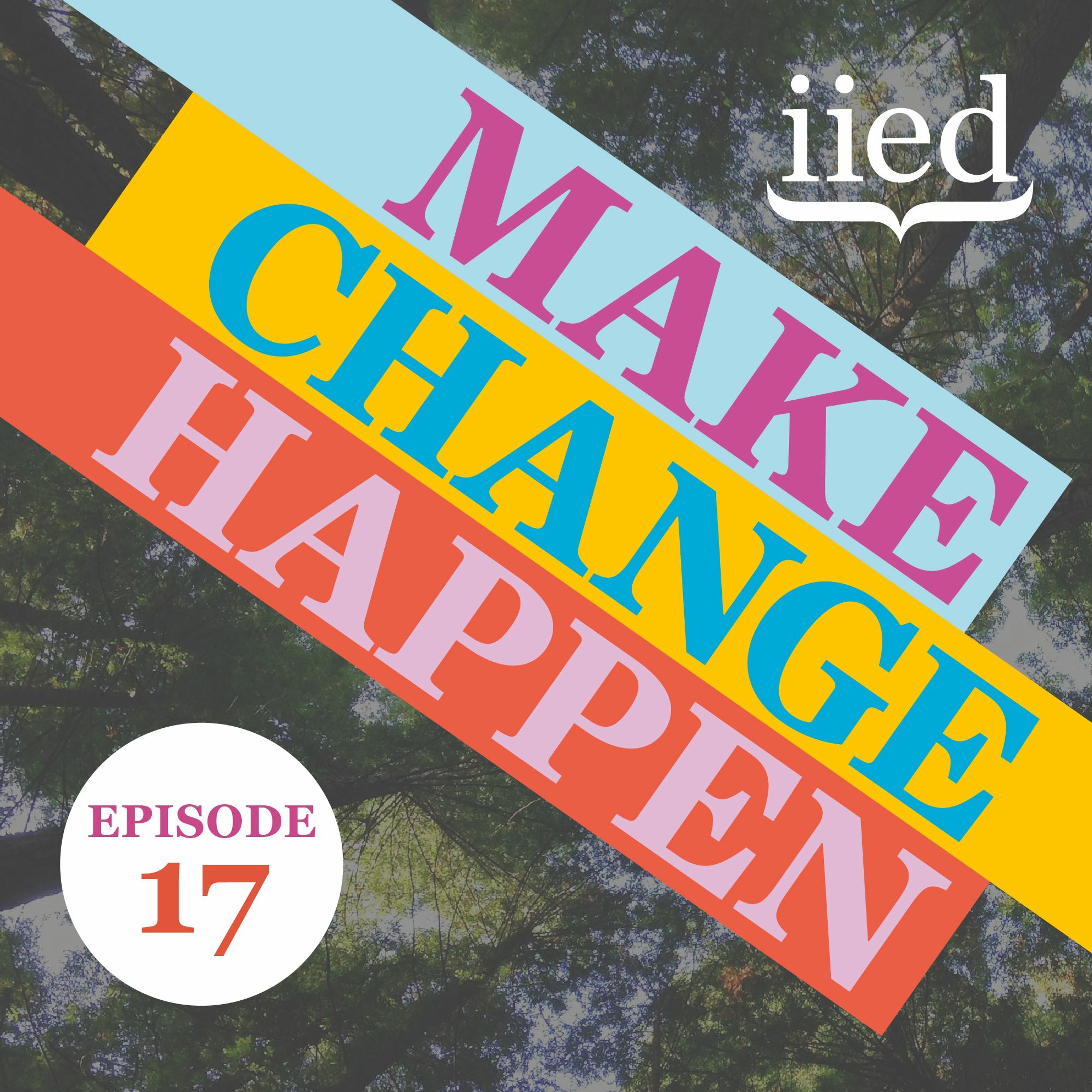
Make Change Happen17. Making sustainable development a reality: movements that inspire changeAs IIED celebrates its 50th birthday, this episode of Make Change Happen brings together four established members of the IIED family to reflect on key movements in the journey towards sustainable development.
Host Liz Carlile, IIED's director of communications, is joined by ex-colleagues Steve Bass, now a consultant in sustainable development; Saleemul Huq, director of the International Centre for Climate Change and Development (ICCCAD); and former IIED director Camilla Toulmin, who is now a professor at the University of Lancaster’s Environment Centre and an associate at the Institute for New Economic Thinking. All three are also senior associates working wi...
2022-06-2144 min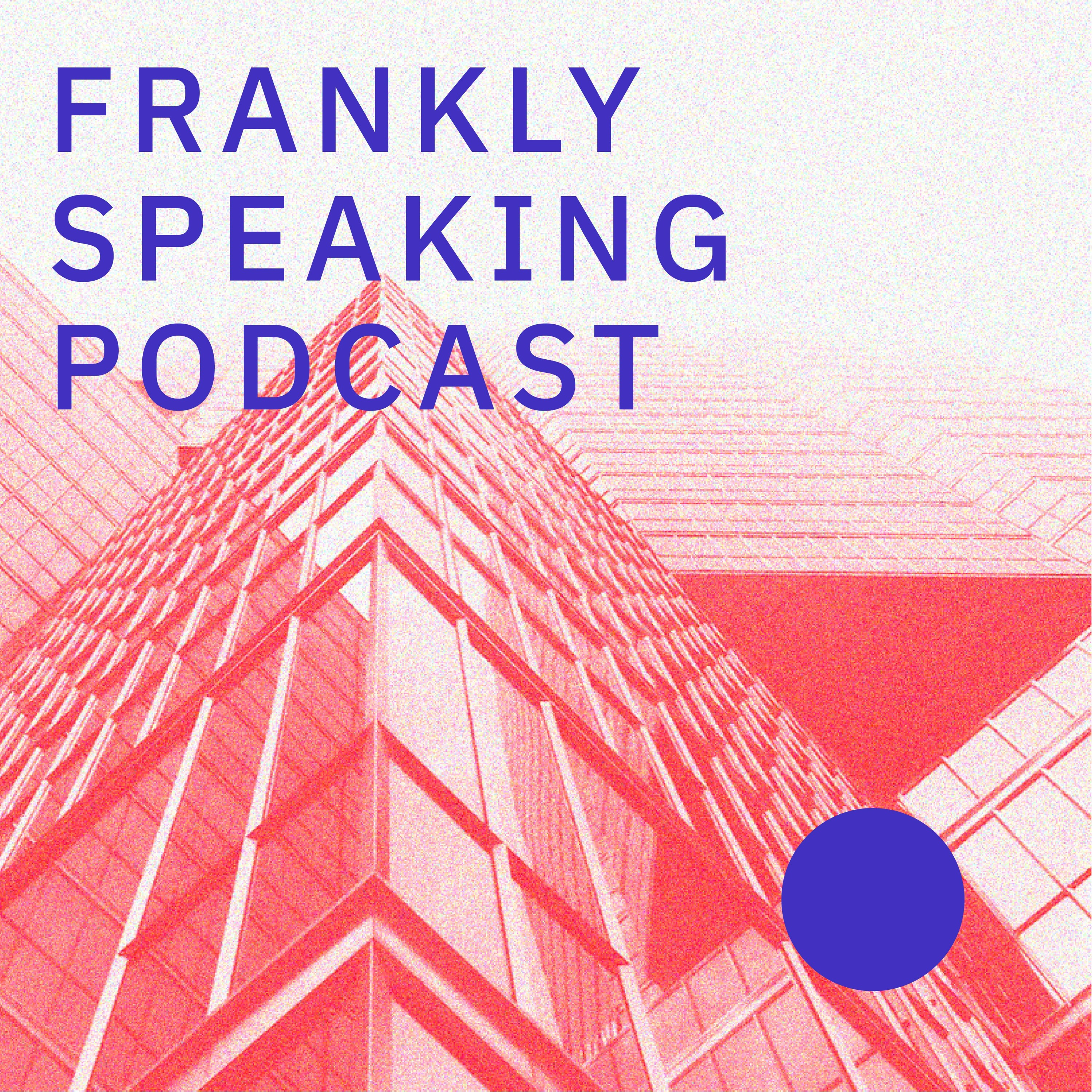
Friends of Europe podcastsFrankly Speaking | Turkey ruffles its feathers over food supplies and Finland19 May 2022: In Episode 13 of Friends of Europe’s Frankly Speaking Podcast special on the war in Ukraine host, Tracey D’Afters is joined by Paul Taylor, Senior Fellow from Peace, Defence and Security and guest speaker Camilla Toulmin who is a British economist and former Director of the International Institute for Environment and Development (IIED) and our senior fellow in sustainable energy. Camilla joins live from the Sustainable Energy for All Forum in Kigali, Rwanda, where she is representing the Africa Europe Foundation (AEF).
Note about the AEF
The Africa-Europe Foundation is co-founded by Friends of Europe and the Mo Ibra...
2022-05-2025 min
Connecting Citizens to ScienceS4E2 - Intersections between Research and ActivismIn this week’s episode we will be discussing the intersections between research and activism for social change. With our guests Vinodkumar Rao and Joseph Kimani, we will be seeking to understand how lessons from activist approaches can be applied within research and vice versa. We will also explore how power, participation and social justice fits within the wider research agenda when seeking to engage communities in informal settings. Key points we hear from Kimani and Vinod include: How slum federations in India and Kenya lead data collection with support from NGOs and researchers so they can demand rig...
2022-04-1436 min
The Times Of India PodcastClimate change now turbo-chargedCEEW's CEO Arunabha Ghosh and IIED's Aditya Bahadur help make sense of the latest IPCC report, what it means for us and what you can do.
2022-04-1122 min
The Climate PodClimate Citizen: Addressing Loss And DamageThis is Part Three of our four-part series, Climate Citizen, in collaboration with Global Citizen. This week, we look at the critical need to reckon with the loss and damage created by the climate crisis and hold accountable the nations most responsible for human-caused climate change as a result of the massive rise in greenhouse gas emissions. To discuss this topic, Professor Saleemul Huq, who has many roles including the Director of the International Centre for Climate Change and Development (ICCCAD) in Bangladesh, Professor at the Independent University Bangladesh (IUB) and Associate of the International Institute on Environment and...
2022-03-3054 min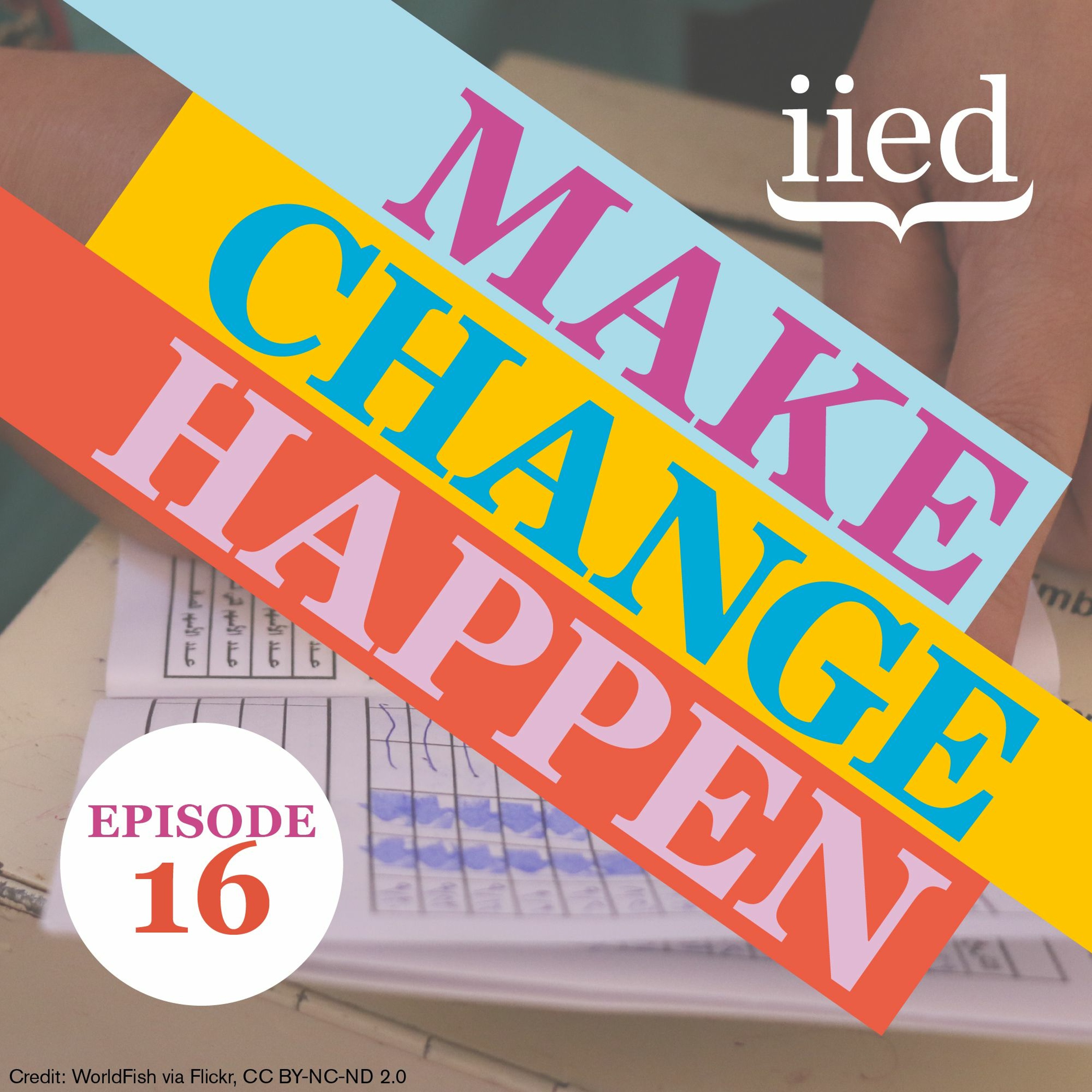
Make Change Happen16. Shifting the power – climate justice means gender justiceTo reflect on International Women’s Day, and the 2022 theme ‘Gender equality today for a sustainable tomorrow’, this episode of Make Change Happen discusses how gender equity and intersectionality approaches are central to climate justice, and that means putting people’s rights, lived experiences and priorities at the centre of every response.
Heather McGray, director of the Climate Justice Resilience Fund, Vitumbiko Chinoko, project manager at the Open Forum on Agriculture and Technology in Nairobi, and IIED’s Tracy Kajumba join host Liz Carlile.
We explore what is meant by the term ‘climate justice’, and unpack how through shifting the dynamics of op...
2022-03-2936 min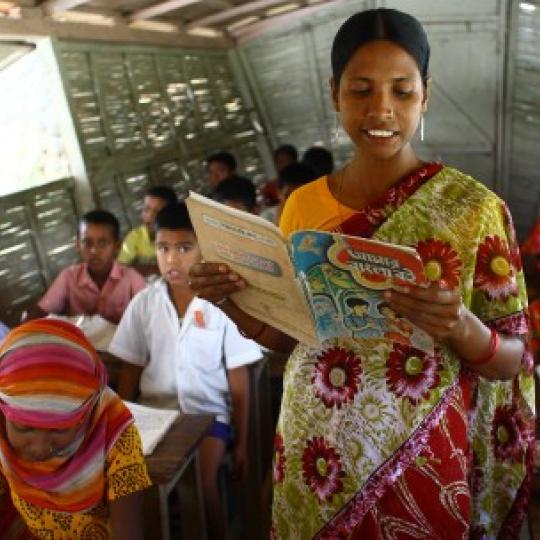
Climate Action ShowThe best climate science you never heardClimate Action Radio showProduced by Vivien LangfordMarch 14th 2022The best climate science you never heardThis is an edited recording of the press briefing from Covering Climate Now and Scientific American February 2nd 2022.It highlights a " little-known scientific development that carries paradigm-shifting implications for how people, especially young people, feel about the climate crisis and how governments and societies respond to it".The Best Climate Science You've Never Heard Of — Covering Climate Now We also hear responses to the recent IPCC report from Dr Kathryn Bowen and Dr Atul K Shah GuestsMichael Mann - Distinguished Professor of Atmospheric Science at Penn State Univ...
2022-03-1400 min
Save Our PlanetBiocultural Heritage: Preserving Indigenous Knowledge and Food SourcesAgriculture is one of the primary drivers of deforestation and displacement of Indigenous communities worldwide, but do all agricultural practices have such negative effects? Globally, Indigenous communities have begun protecting traditional food sources through biocultural heritage territories. Join our conversation with Krystyna Swiderska about this groundbreaking initiative. Krystyna Swiderska is an expert in traditional knowledge and biocultural heritage of Indigenous peoples and local communities at the International Institute for Environment and Development (iied).
2022-02-1723 min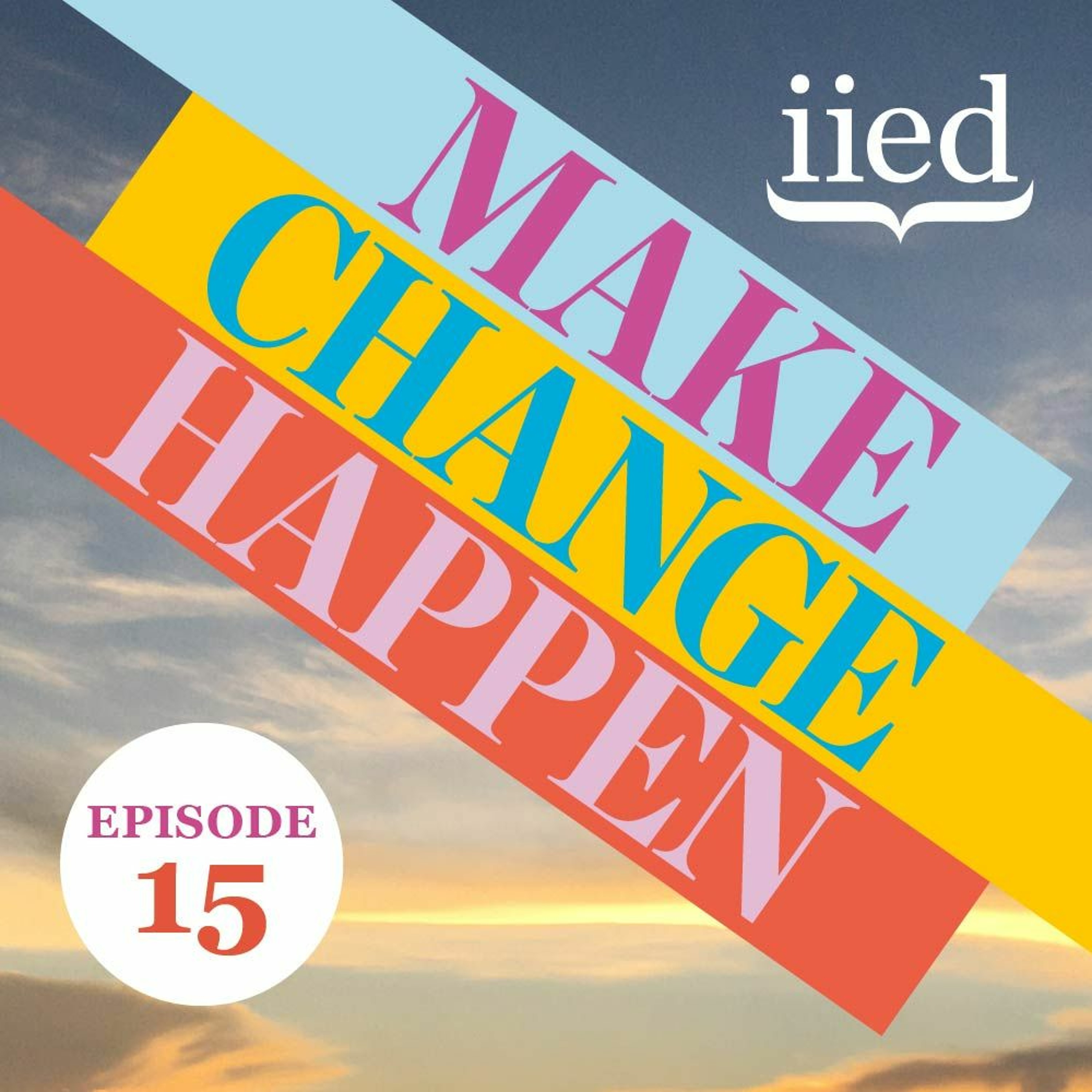
Make Change Happen15. IIED at 50: reflecting on the past, looking to the futureIn the year IIED celebrates 50 years of working for a fairer and more sustainable world, we invite two eminent former colleagues to look back at where we came from, how we have developed, and where we should be going.
Achala Abeysinghe, Asia regional director for the Global Green Growth Institute and ex-IIED vice-president David Runnalls, a fellow with the International Institute for Sustainable Development in Canada, join host Liz Carlile for the discussion.
Among the issues that arise are climate finance, partnerships and how to support the poorest and the most vulnerable to ensure their voices are heard and they...
2022-01-1045 min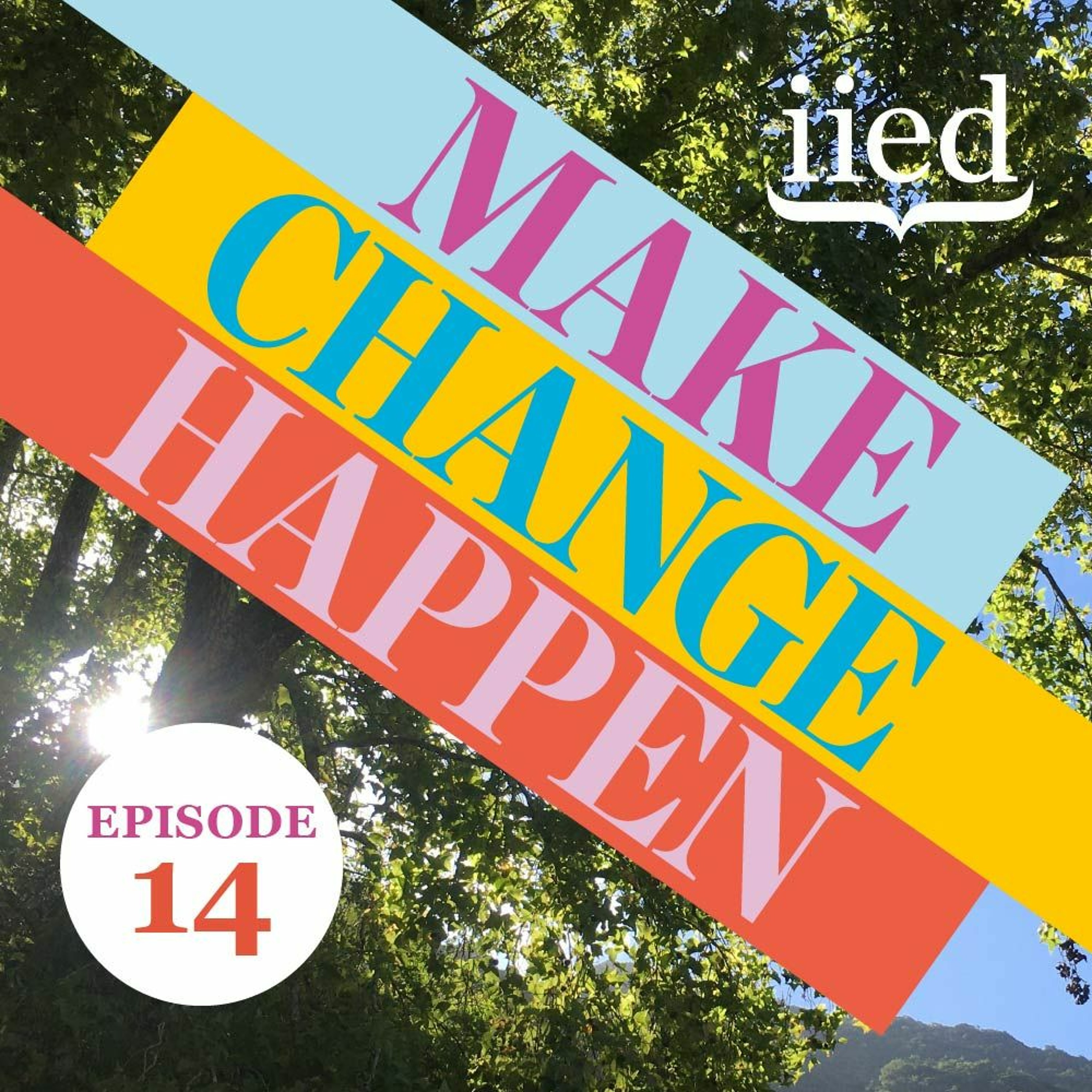
Make Change Happen14. Walking the talk of climate ambition: why that walk needs nature tooExperts discuss the connections between the climate emergency, loss of biodiversity and rising inequalities, and why it is important to include nature in Nationally Determined Contributions (NDCs) to address these crises globally.
The latest episode of the Make Change Happen podcast focuses on why and how developing countries are incorporating nature-based solutions in their NDCs to increase and deliver their climate ambitions.
Guests include Nathalie Seddon, professor of biodiversity and director of the Nature Based Solutions initiative at the University of Oxford; Bob Natifu, acting commissioner on climate change in the Ministry of Water and Environment in Uganda; Maria Caballero...
2021-11-0140 min
PodClimate NewsPodClimate News Especial Rumo a Glasgow #2 - As principais negociações de GlasgowDemos uma pausa nas notícias para falar de tudo que você precisa saber sobre a COP 26. 🌎
O Climate Reality Project Brasil, unindo forças com os Líderes da Realidade Climática e especialistas da área, montou um guia prático para vocês acompanharem a COP 26 bem informados e por dentro do assunto. Disponível no nosso canal do YouTube e também por aqui, em formato de podcast e com apresentação de Sérgio Besserman.
Nesse episódio Clima na Real: Rumo a Glasgow vamos tratar do tema As principais negociações de Glasgow. Conh...
2021-09-1439 min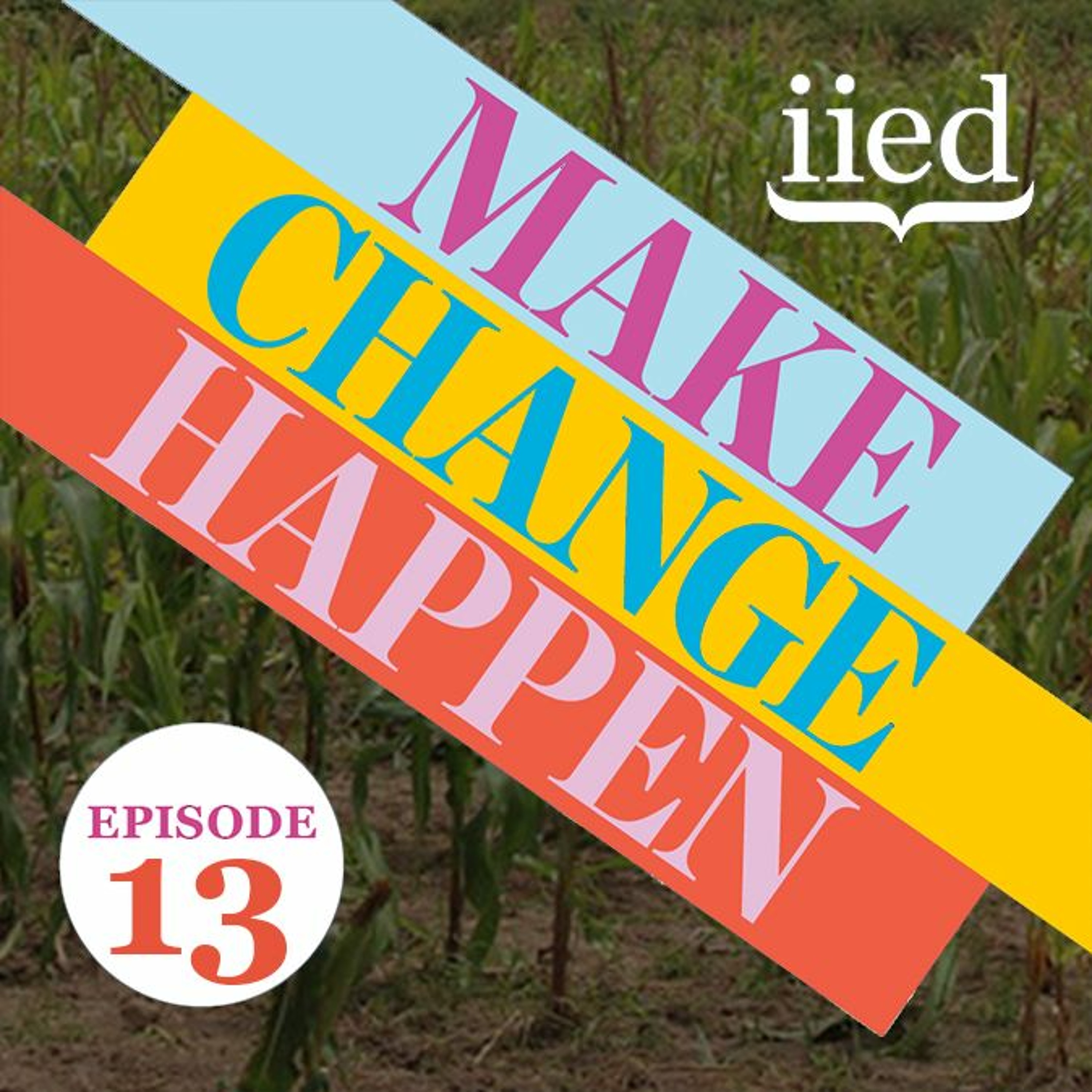
Make Change Happen13. Getting climate resilience right: the case for backing smallholder organisationsForest and farm smallholders are fighting for their livelihoods and food security. New research shows producers’ practical measures for climate resilience have impact, but barriers remain to scaling the work up and out.
In this ‘super year’ of climate and nature, the latest episode of the Make Change Happen podcast hosts a discussion on what support smallholders need, and who should provide it.
Guests include Ugandan young agriprenuer Elizabeth Nsimadala, IIED Climate Change director Clare Shakya and Duncan Macqueen, leader of IIED's forest team and an expert on locally controlled forestry, climate-resilient forest enterprises and forest governance approaches.
2021-09-1340 min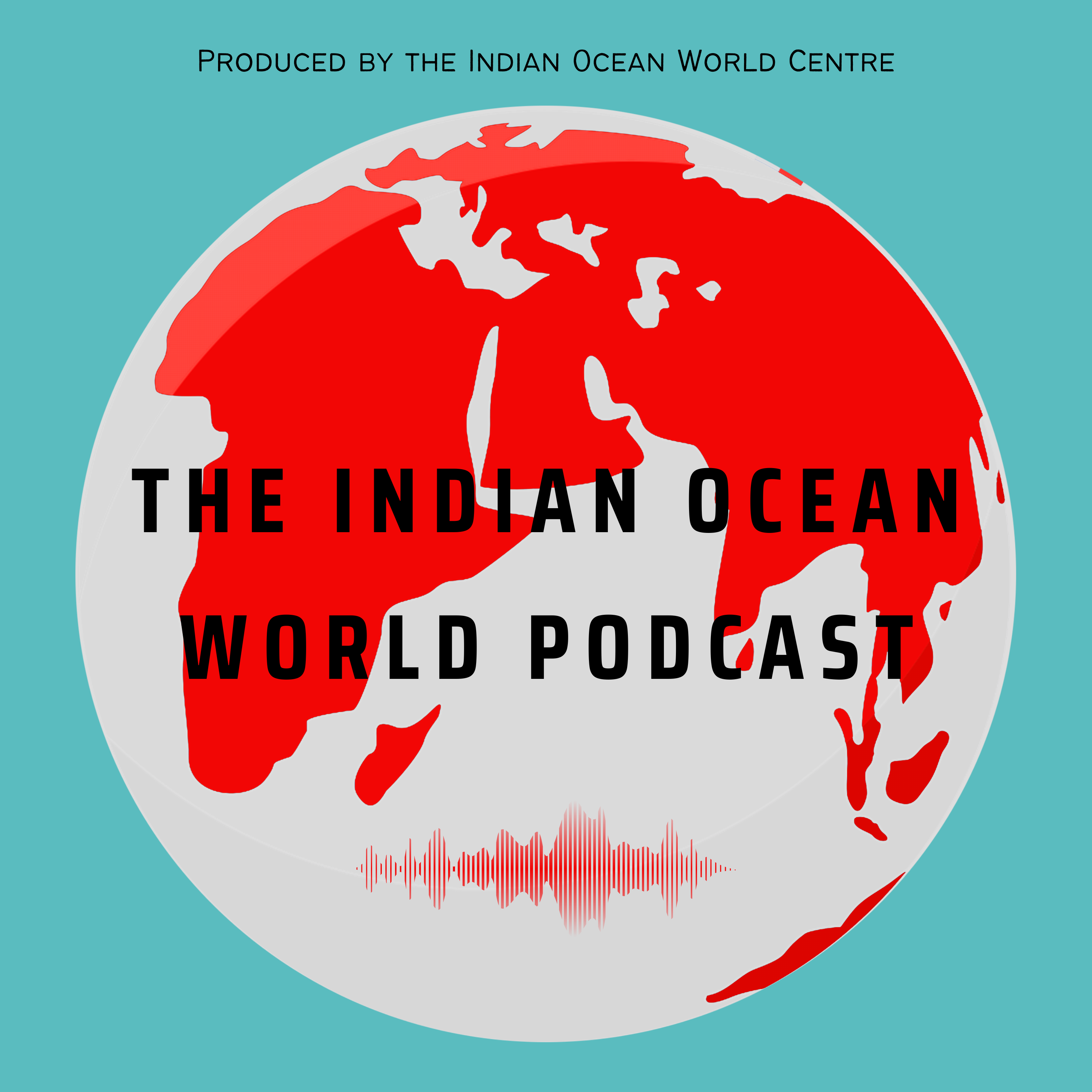
The Indian Ocean World PodcastChandni Singh & Roger Few - Recovery with Dignity in South AsiaIn this podcast, Dr Chandni Singh (Indian Institute for Human Settlements, Bangalore, India) and Prof. Roger Few (University of East Anglia) discuss the different meanings of recovery from disasters and highlight how disasters are caused as much by physical hazards as they are socially generated. Using case studies from the southern Indian state of Tamil Nadu, Singh and Few argue that long-term recovery from disasters should focus not only on the measurable, tangible impact (roads, buildings), but also on rebuilding the well-being of communities. Differential access to resources and assets - e.g., loans to rebuild a house, or...
2021-07-2839 min
Planet PantryMaple Syrup Part 2: Opportunity Makes the ThiefThis week we continue to look at maple syrup and some amazing stories behind it. We explore the greatest heist in Canadian history, the origins of maple syrup and more! Don't forget to check out planet pantry pod on Instagram and Patreon or email me with questions or whatever else at planetpantrypod@gmail.com. Some Sources (contact for more): https://nationalpost.com/news/canada/sweet-revenge-for-quebec-maple-syrup-producers-thief-gets-five-years-for-role-in-18-7-million-heist
https://globalnews.ca/news/3413782/maple-syrup-theft-sentence/
https://www.nytimes.com/2012/12/20/business/arrests-made-in-maple-syrup-theft-from-quebec-warehouse.html
https://theeconreview.com/2019/11/05/sweet-nothings-the-cruel-irony-of-quebecs-maple-syrup-gold-rush/
https://www.vpr.org/programs/2019-04-22/inside-the-global-strategic-maple-syrup-reserve
https://pubs.iied.org/sites/default/files/pdfs/migrate...
2021-07-2742 min
Tyndall TalksClimate Change, Inequality, and ConservationFor this episode of the Tyndall Talks, we have the highlights of a recorded seminar on the topic of Climate Change, Inequality, and Conservation with guests Dr. Karen Wong-Perez of IIED and Prof. Patrcia Balvanera of UNAM, hosted by Dr. Rachel Carmenta.Whilst climate conservation interventions present an opportunity for tackling climate change, conservation and development, they may also pose risks to local communities. Given the increasing interest in nature based solutions in the international policy arena, it is imperative that interventions do not extenuate the vulnerabilities of rural populations and instead enhance the resilience and well-being o...
2021-07-0533 min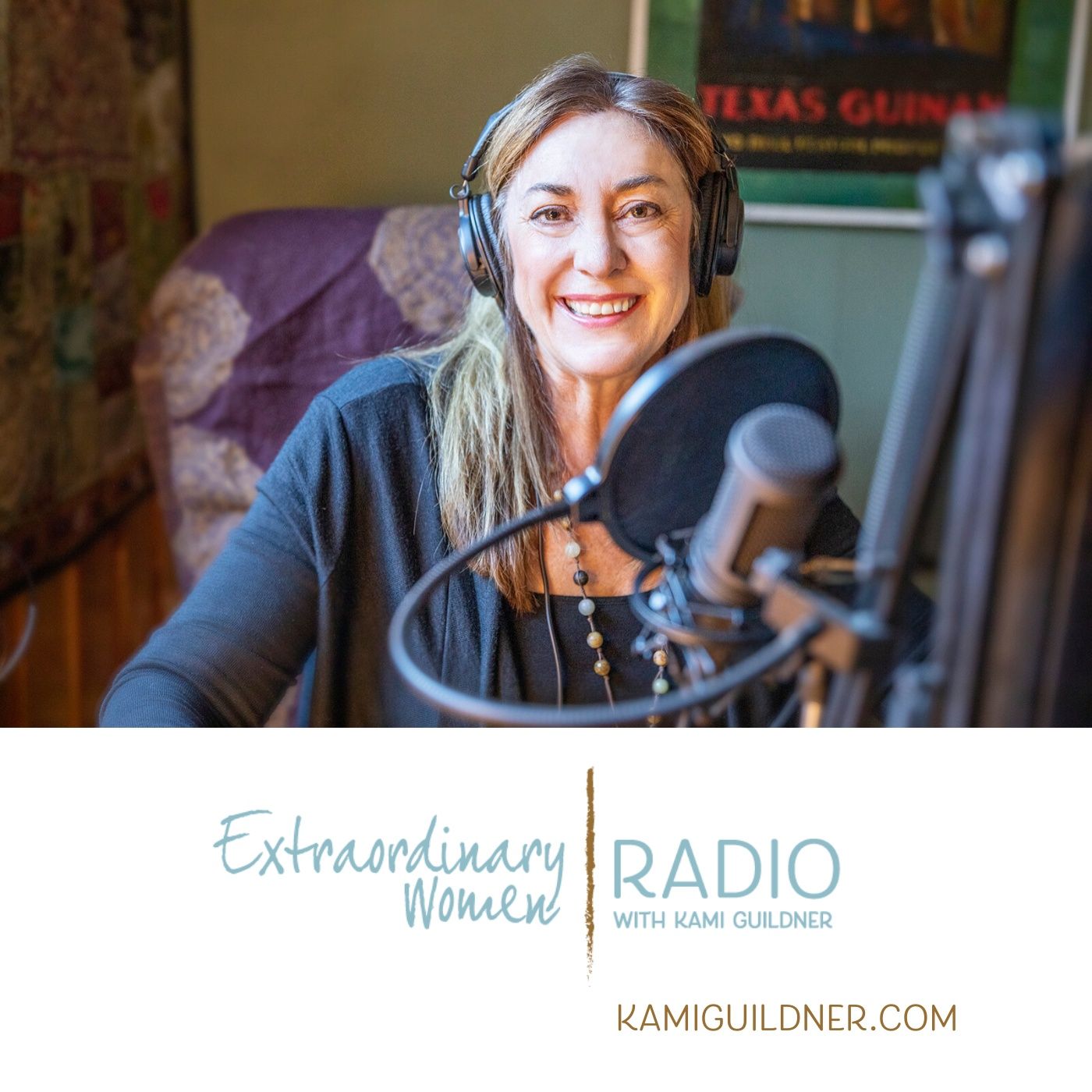
Extraordinary Women Radio with Kami GuildnerRebeca Grynspan – Ibero-American Secretary-General, United Nations Conference on Trade and Development Secretary-General and former VP of CoToday on Extraordinary Women Radio, I am so honored to introduce you to Rebeca Grynspan, the Ibero-American Secretary General, the United Nations Conference on Trade and Development Secretary General and a former Vice President of Costa Rica.In this Episode:The conception of Ibero-American, and how it continues to bind seventeen countries of Latin-American descent, and the discourse of sustainable development goals for 2021.Rebeca recalls her experience of being the only woman in a state-sponsored “meeting of minds” and her first connection to a life of governance.She shares her journey as the person occupying the...
2021-07-0142 min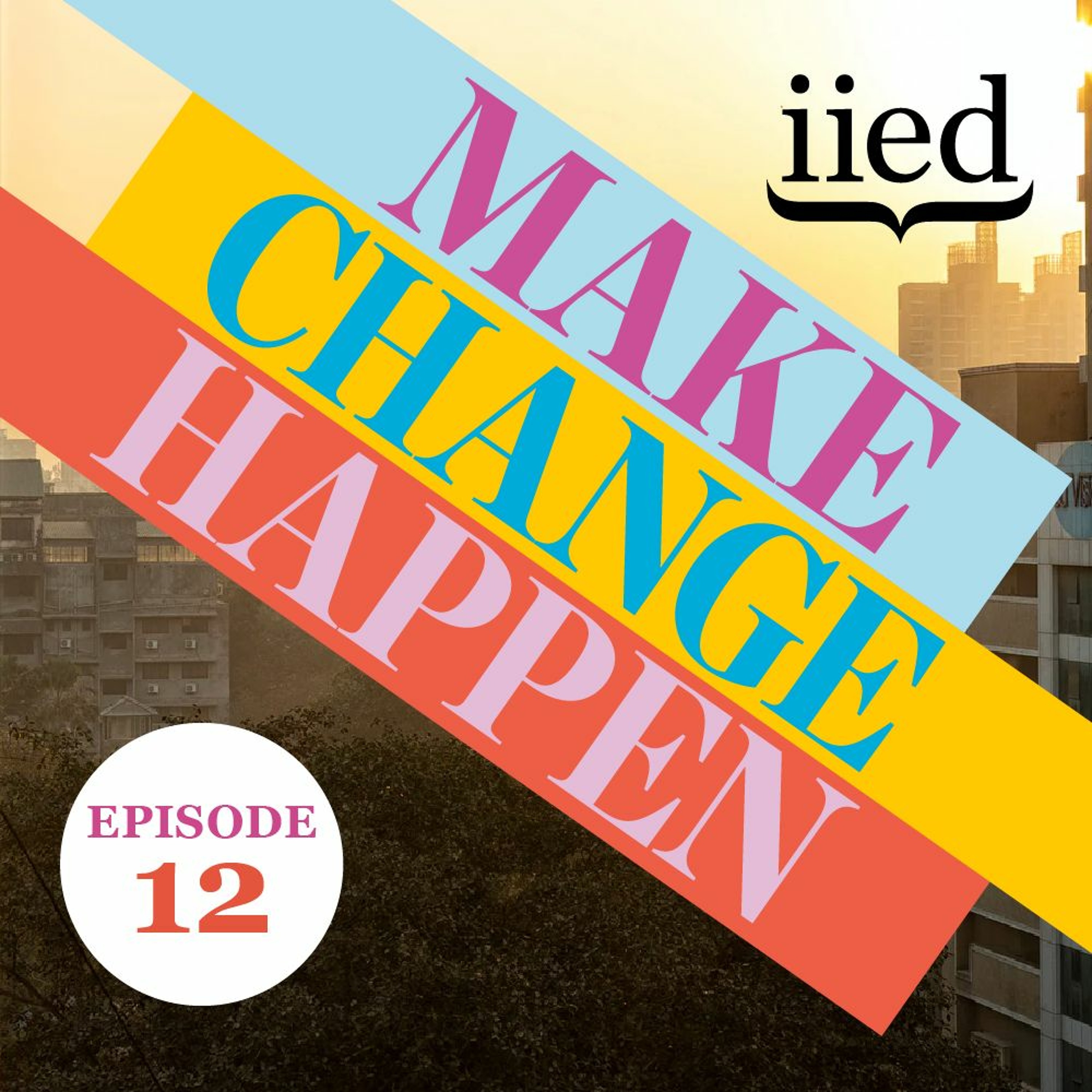
Make Change Happen12. Wanted: an inclusive vision of urban recovery from COVID-19The urban dimensions of COVID-19 have been largely ignored and yet the economic impacts of the pandemic are especially severe in cities and towns in the global South, where low-income residents have been disproportionately affected.
In this episode of Make Change Happen, expert practitioners discuss the effects of the pandemic in urban areas, and they share a range of inclusive, locally led responses from the global South.
2021-06-2131 min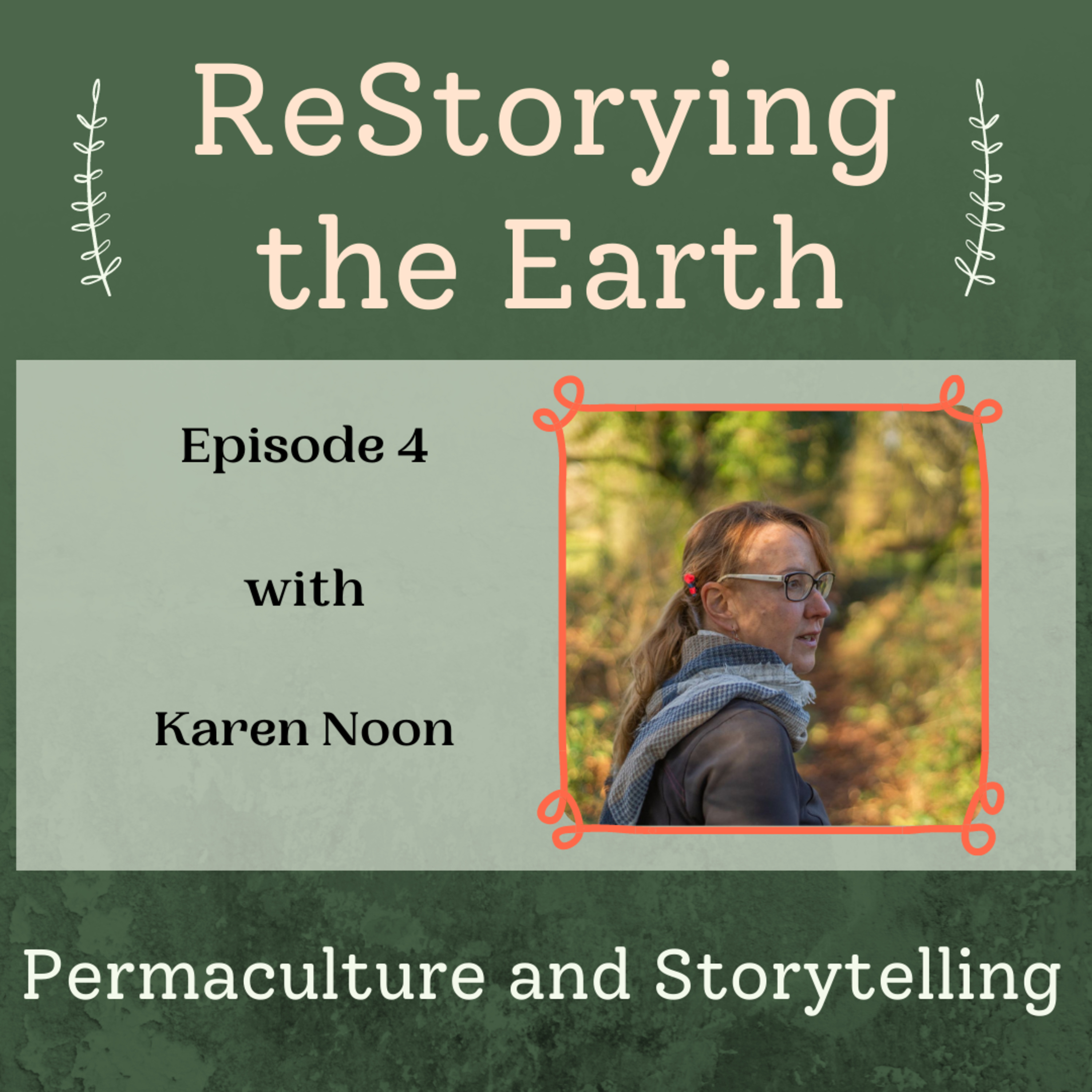
Restorying the EarthKaren Noon - Personal Storytelling and Permaculture EducationIn this episode, I speak to permaculture educator Karen Noon. Karen originally hails from South Africa, but now lives on a small farm in Brittany, France. Karen comes from a corporate background, but ten years ago that all changed. Today I speak with Karen about the importance of personal storytelling in transformative education and how she sees permaculture as a way of re-storying ourselves, our gardens and our world. She shares her 'river of life' story and the event in her life that led her to put people's voices at the heart of everything she does. She outlines how to d...
2021-06-1024 min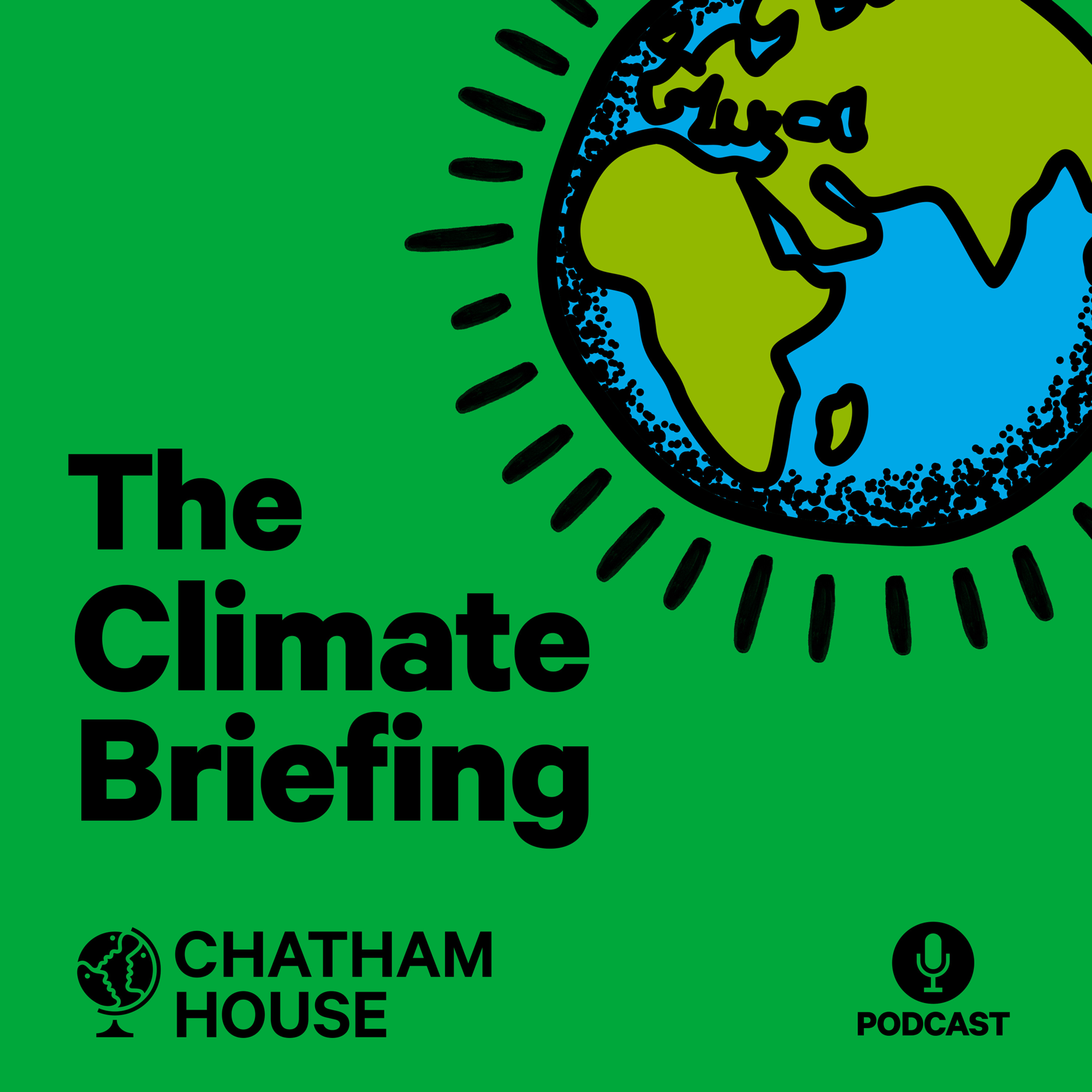
Chatham HouseEpisode 12: Managing the impacts of climate changeThis week the Climate Briefing turns its attention to how societies are can deal with the real-time effects of climate change. While mitigation remains a central focus of the international climate negotiations, vulnerable states and communities are calling for greater cooperation on addressing the fallout from climate-related environmental devastation. To discuss this, Anna is joined by H.E. Saida Muna Tasneem, Bangladesh's High Commissioner to the UK and Ambassador to Ireland and Liberia. They discuss the international politics around climate adaptation, and the contested issue of 'loss and damage'. Then Ben discusses how governments and aid agencies can improve adaptation p...
2021-04-281h 14
The Climate BriefingManaging the impacts of climate changeThis week the Climate Briefing turns its attention to how societies are can deal with the real-time effects of climate change. While mitigation remains a central focus of the international climate negotiations, vulnerable states and communities are calling for greater cooperation on addressing the fallout from climate-related environmental devastation. To discuss this, Anna is joined by H.E. Saida Muna Tasneem, Bangladesh's High Commissioner to the UK and Ambassador to Ireland and Liberia. They discuss the international politics around climate adaptation, and the contested issue of 'loss and damage'. Then Ben discusses how governments and a...
2021-04-281h 14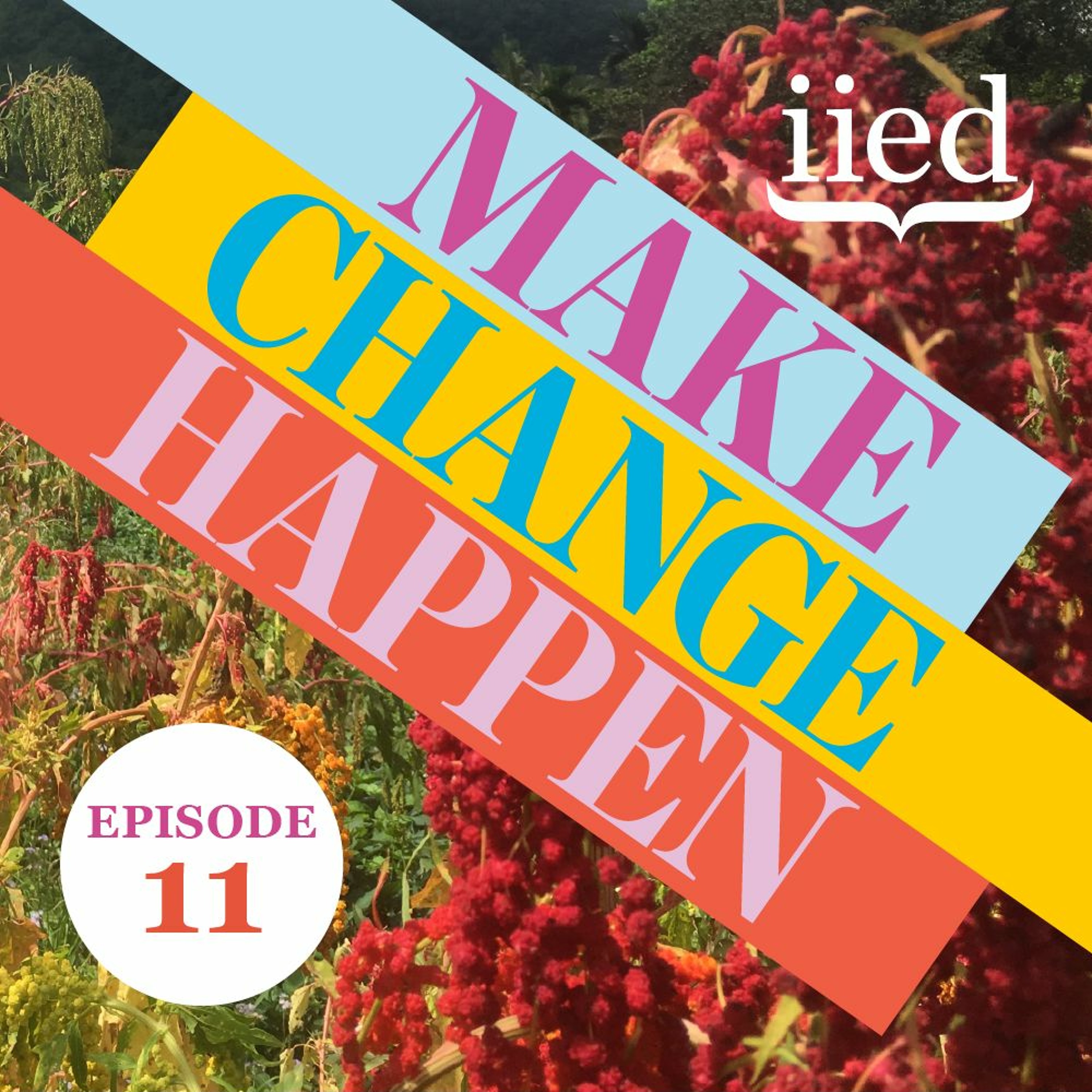
Make Change Happen11. Indigenous knowledge, people and nature – all crucial to KunmingIndigenous Peoples and Local Communities have been the guardians of biodiversity for thousands of years. As a result, today, they conserve the world’s richest biodiversity on their lands and territories.
In this Make Change Happen episode we learn about the term biocultural heritage, which comes from the lived experience of Indigenous Peoples, and is critical to the success of the post-2020 Global Biodiversity Framework up for negotiation in Kunming later this year.
Hosted by Liz Carlile, this podcast features IIED’s principal researcher Krystyna Swiderska; Alejandro Argumedo, Quechuan native from southern Peru and coordinator of the Mountain Indigenous People’s Netw...
2021-04-2639 min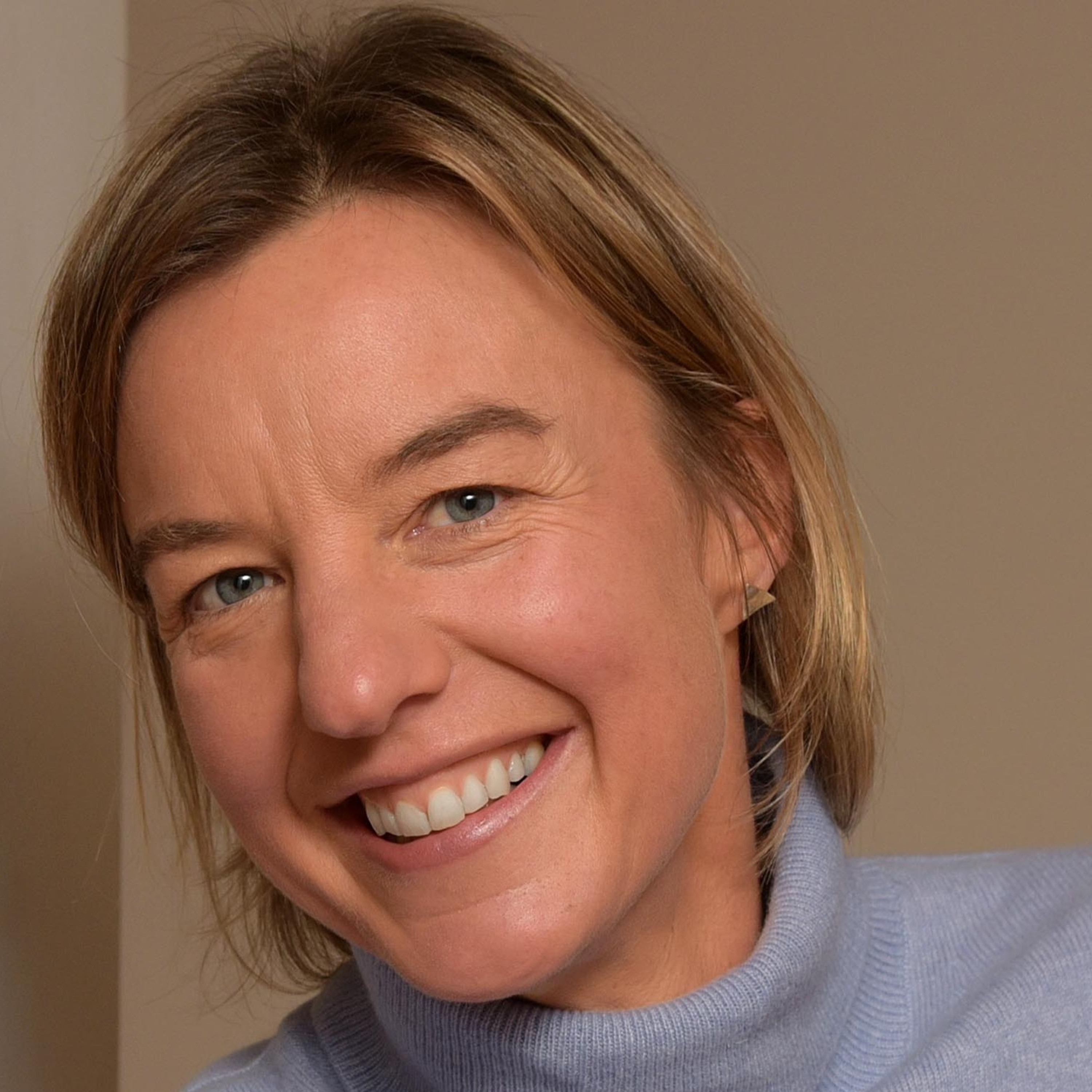
Social Impact PioneersTara Shine, Climate Justice AdviserThis podcast talks with Dr Tara Shine. Tara was formerly an international climate change negotiator and adviser to governments & world leaders on environment & development policy. During our conversation, Tara shares how business can ensure people are at the centre of climate action.
Tara was a Special Adviser to the Mary Robinson Foundation-Climate Justice and Climate Adviser to The Elders. Tara is co-founder and Director of Change by Degrees, which provides global sustainability and climate expertise to businesses and organisations to help them maximise their benefits to society. She is also Chair of the Board of Trustees of the International Institute...
2021-04-0618 min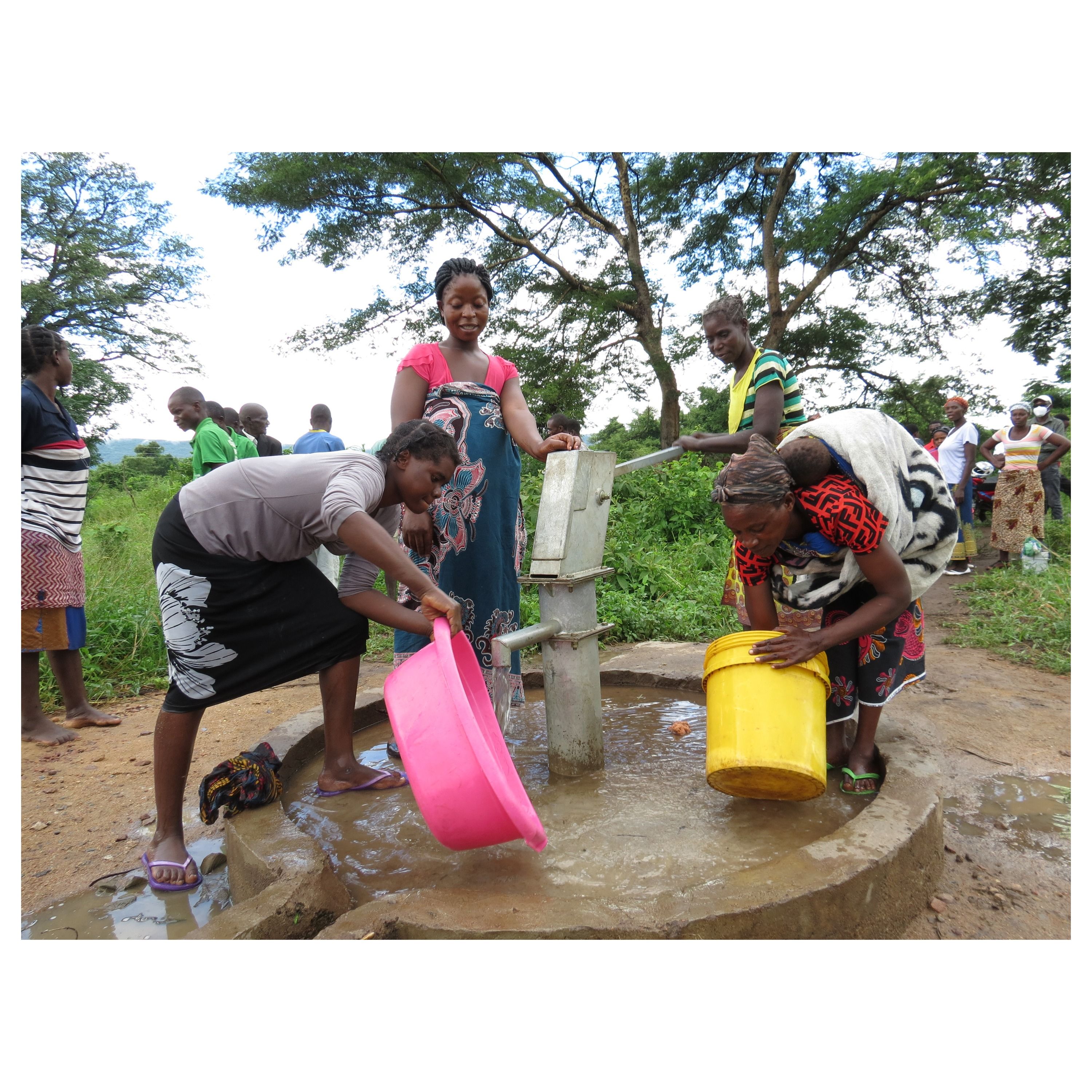
Memorandum of UnderstandingMoU carbon: Money grows on treesThe forest is a resource traditionally deemed more valuable dead, chopped down or transported away in trucks and boats. For decades, development donors and NGOs have appealed to the moral high ground, attempting to persuade the people who live in forest areas to safeguard it. But these people depend on forests to survive, so time and again, these efforts are met with the rational question, ‘what’s in it for me?’BioCarbon Partners (BCP) is an African social enterprise based in Zambia that shows more value and worth can accrue to communities by keeping trees in the ground...
2021-03-1538 min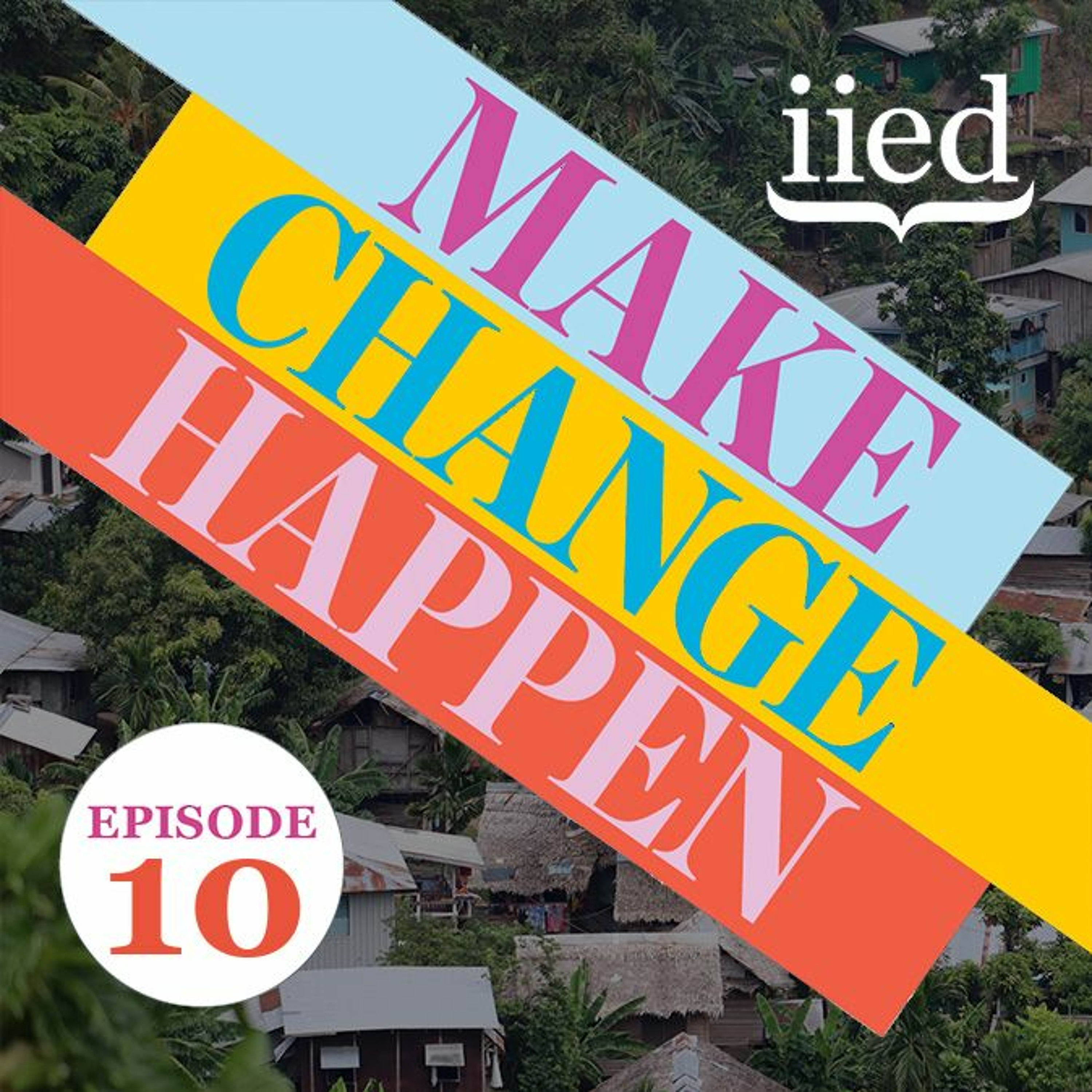
Make Change Happen10. Loss and damage – recognising the costs of climate changeClimate change has devastating impacts on our planet and people. Some impacts are very noticeable, but many go unmentioned.
In this episode of Make Change Happen, we acknowledge the untold loss and damage from climate change having devastating effects on culture and communities.
Hosted by Liz Carlile, this edition’s podcast features IIED’s senior associate director of the International Centre for Climate Change and Development (ICCCAD) in Bangladesh Saleem Huq, senior researcher in IIED’s Climate Change research group Brianna Craft, and Gladys Hub, a climate activist from the Solomon Islands, who is also a UNICEF Pacific Supporter and a full...
2021-03-0235 min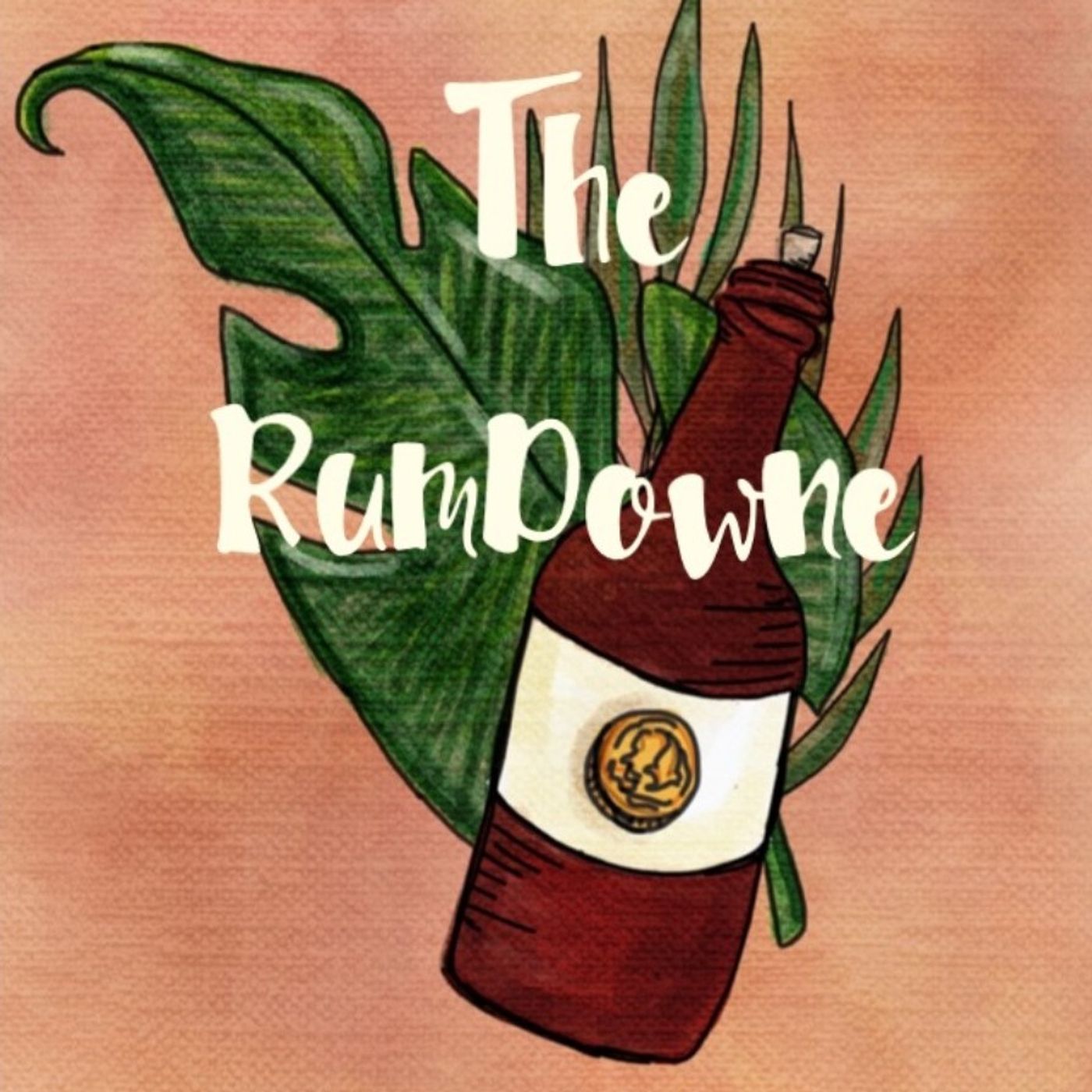
The RumDowneAfro-caribbeans that changed the gameAre we invisible? Have we not made history? Did we at least get an honorable mention? This one is for the mentioned, and the forgotten! It’s Black History Month! The Black Community has fought to be where we are now. We want to highlight a couple of people that participated in that fight. In today’s episode, we will be discussing the history made by Marcus Garvey and the ideas of Arthur Lewis. Useful links: Marcus Garvey: http://www.bbc.co.uk/history/historic_figures/garvey_marcus.shtmlhttps://www.researc...
2021-02-1847 min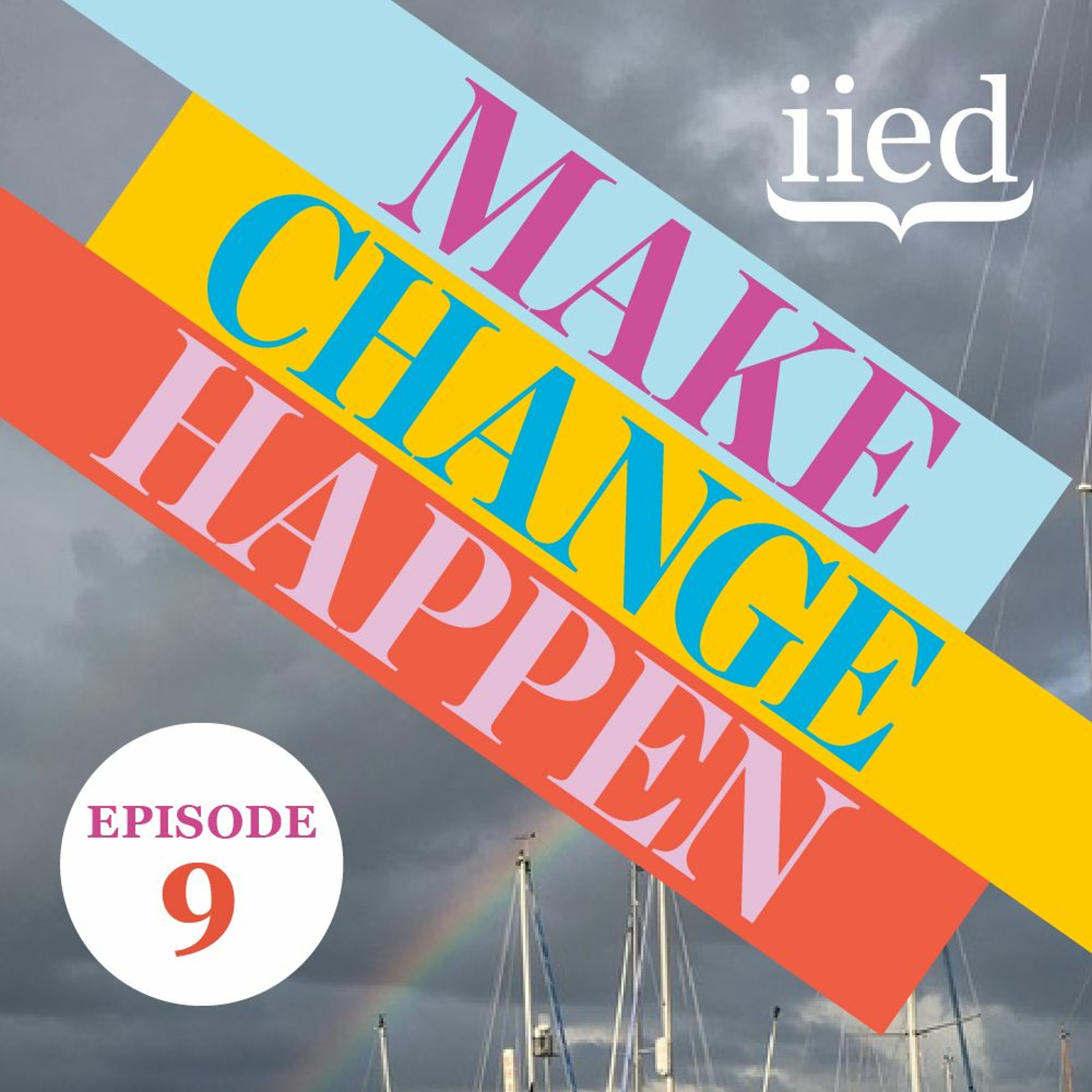
Make Change Happen9. No time to lose – collective action for our common future2020 set us back in achieving environment and development progress, leaving an unprecedented challenge ahead. But recovery is possible if we learn from last year and move ahead quickly.
In the first ‘Make Change Happen’ episode of 2021, we learn that early action, youth participation and collaborative policymaking are pivotal to making change happen and a better future for us all.
Hosted by Liz Carlile, this episode’s conversation features IIED director Andrew Norton; Ineza Umehoza Grace, founder and chief executive officer of the Rwandan organisation, The Green Fighter; and Dr Tara Shine, chair of the board of trustees of IIED and direct...
2021-01-0530 min
Earth to HumansETH 217: Biodiversity and Climate Change: 1 Coin 2 SidesRosalind Helfand was enamored with the wild hills of Simi Valley as a child. Their continuous destruction by human expansion ignited a quest for justice that has embedded Roz on the frontlines fighting for environmental and social issues her entire life. Recognition that human rights and the plights facing our natural ecosystems are intertwined has strengthened her resolve.Roz works as a consultant helping develop progressive policies for non-profit and governmental entities. A recent focus has been on the upcoming 2021 Convention on Biological Diversity where her efforts and those of many others have helped establish the...
2020-12-3048 min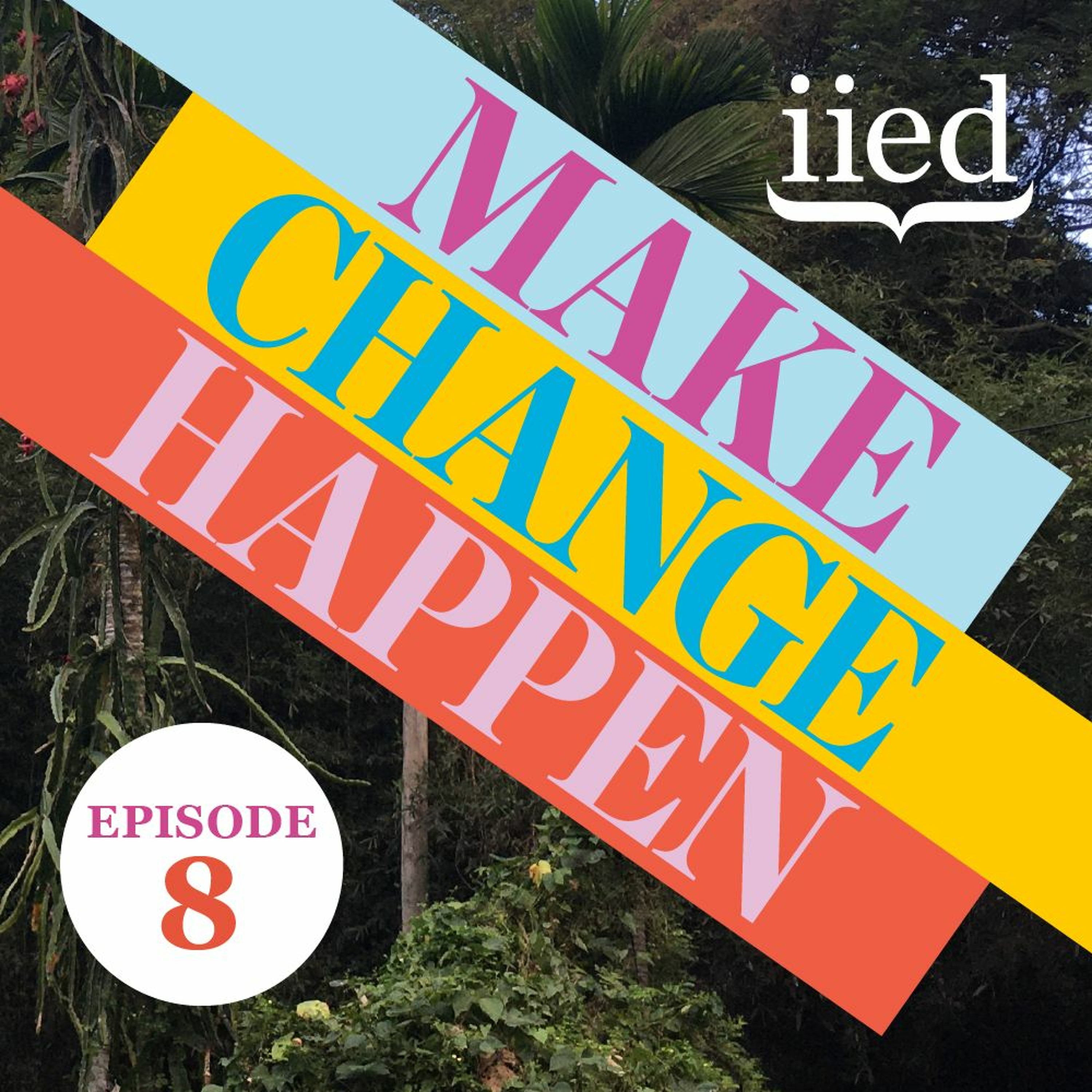
Make Change Happen8. Debt swaps for climate and nature: innovation for resilienceIn the aftermath of the COVID-19 pandemic, concerns over debt owed by developing nations are increasing substantially. The burden of developing country debt stands at eight trillion US dollars, so action on debt relief is now more pressing than ever.
Debt swaps for climate and nature could help relieve debt and offer great gains for the wellbeing of the planet. But they are a controversial idea.
In this episode of ‘Make Change Happen’, guests discuss the challenges and potential of debt swaps for climate and nature, highlight a lived example of a marine debt swap from the Seychelles, and analyse what...
2020-11-1235 min
Climate Action ShowBangladeshBangladeshi farmer in CovidTimes (repeat)CLIMATE CRISIS FRONTLINESEpisode 1- BANGLADESH13th July 2020Guests:Runa Khan - Founder of "Friendship" floating hospitals in Bangladeshhttps://friendship.ngo/floods-in-bangladesh-and-friendships-response/(link is external)https://friendship.ngo/about-us/leadership/runa-khan-founder-and-executive-director/(link is external)Dr Saleemul Huq - Scientist and Director of International Centre for Climate Change and Developmenthttps://www.iied.org/climate-covid-19-collaboration-we-need(link is external)COP is no longer fit for purpose :https://www.youtube.com/watch?list=PL1iUHL94bWo7kN34oPG6V_dny1BJ4hwEW&v=g3nuz1_Ani0(link is external)Music: Stand Up tall by Miguel Heatwole and the choirSound E...
2020-08-3100 min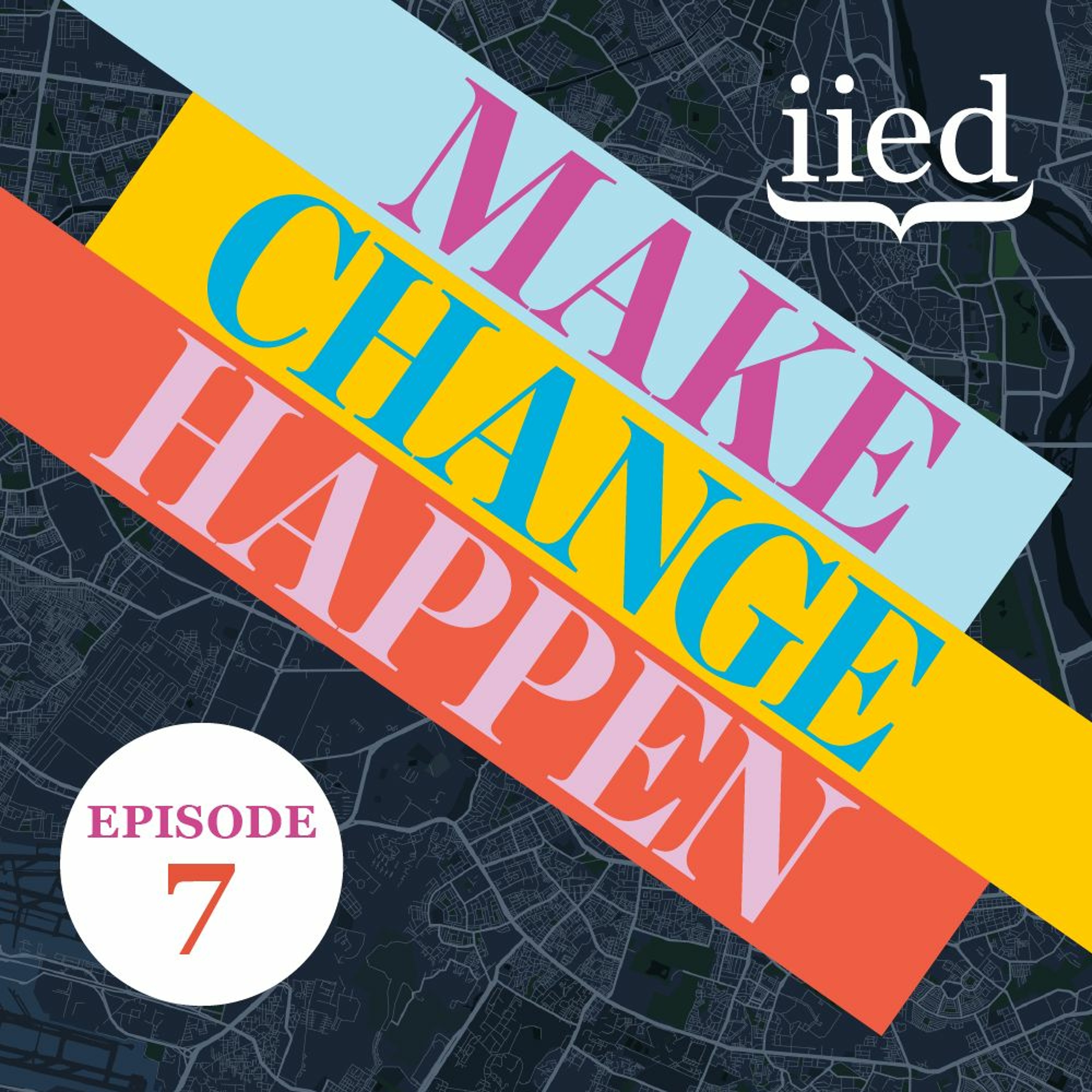
Make Change Happen7. Shared vulnerabilities? Connecting climate and health in citiesCities and towns are hugely impacted by both climate change and public health crises. This combined (and intertwined) threat weighs heaviest on the poorest urban communities. Health and climate specialists are already working hard on reducing urban risk and increasing resilience, but what has COVID-19 shown us about how these experts could learn from each other, and how they could work better with knowledgeable local actors?
Hosted by Anna Walnycki, senior researcher in the Human Settlements group of the International Institute for Environment and Development (IIED), the discussion features principal researcher Aditya Bahadur, climate change researcher Sarah McIvor, both also...
2020-08-0639 min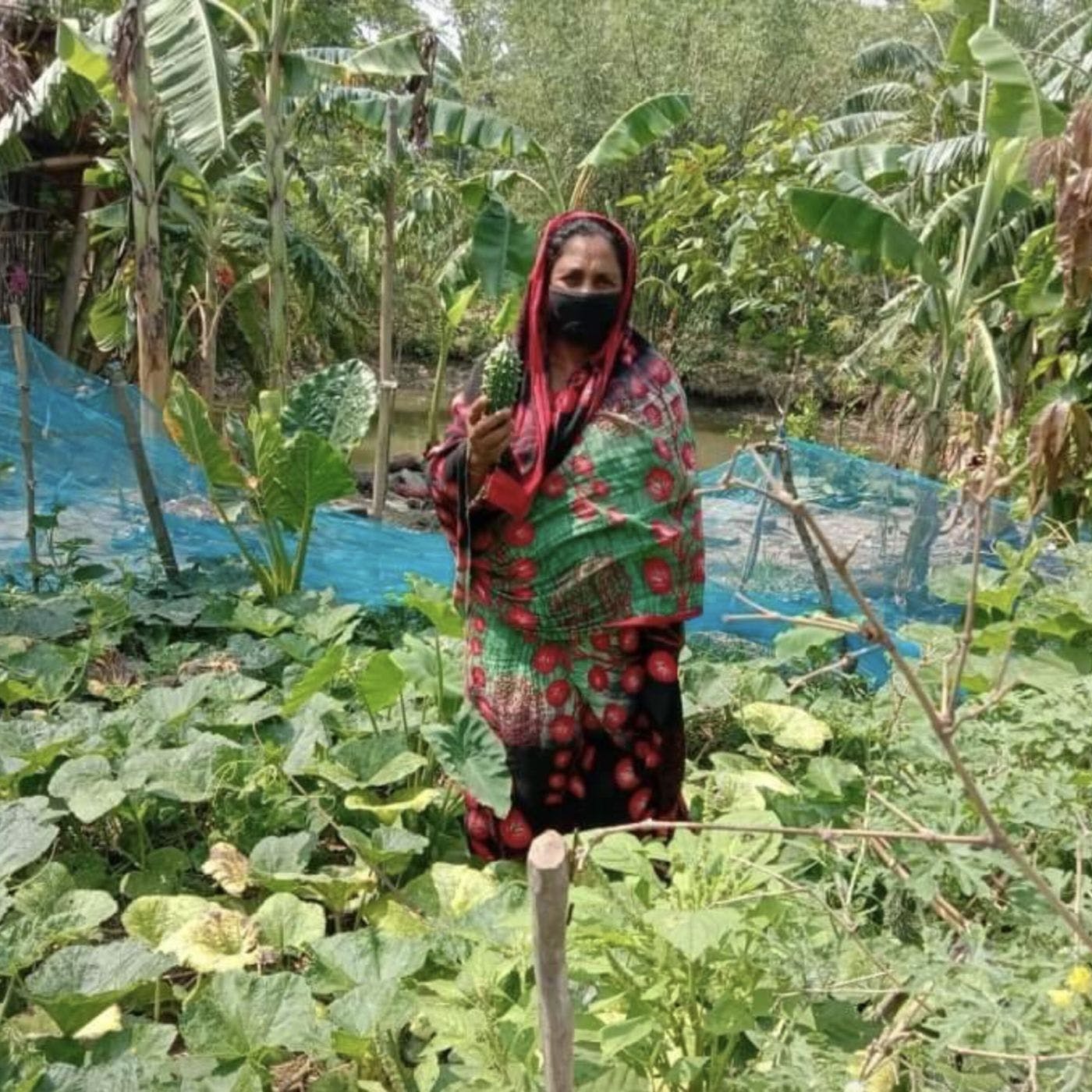
ClimacticBZE Community Show | Climate Crisis Frontlines Episode 1 | BangladeshGuest episode from the BZE Community radio show. Our thanks to the team for allowing us to share it with you. Also, we're announcing two new shows on the Climactic Collective. thEMPOWER and Sustainable You. Check out all the shows on the network at www.climactic.com.au.CLIMATE CRISIS FRONTLINESEpisode 1- BANGLADESH13th July 2020Guests:Runa Khan - Founder of "Friendship" floating hospitals in Bagladeshhttps://friendship.ngo/floods-in-bangladesh-and-friendships-response/https://friendship.ngo/about-us/leadership/runa-khan-founder-and-executive-director/Dr Saleemul Huq - S...
2020-07-2559 min
Climate Action ShowBANGLADESHBangladeshi farmer in CovidTimesCLIMATE CRISIS FRONTLINES Episode 1- BANGLADESH13th July 2020Guests: Runa Khan - Founder of "Friendship" floating hospitals in Bagladeshhttps://friendship.ngo/floods-in-bangladesh-and-friendships-response/https://friendship.ngo/about-us/leadership/runa-khan-founder-and-executive-director/Dr Saleemul Huq - Scientist and Director of International Centre for Climate Change and Developmenthttps://www.iied.org/climate-covid-19-collaboration-we-needCOP is no longer fit for purpose :https://www.youtube.com/watch?list=PL1iUHL94bWo7kN34oPG6V_dny1BJ4hwEW&v=g3nuz1_Ani0Music: Stand Up tall by Miguel Heatwole and the choirSound Effects : by Maqubul from Freesound "Be prepared" is the message from Bangladesh. Runa Khan de...
2020-07-1300 min
GDP - The Global Development Primer"Get Off Your Donkey": How to build a career in social entrepreneurship and international development."Working with communities", "social entrepreneurship", "consulting with the UN" are all terms students in International Development have heard and use. But how to get started? In this episode Soudeh Jamshidian joins Dr. Bob to chat about how she has worked on various social entrepreneurship initiatives as well as with the United Nations, and founding her own organization "Peace Geeks"? How to engage in global development through social entrepreneurship? It's easy, according to Soudeh. "Just get off your Donkey"....you'll see what she means.
Soudeh (B.Sc., M.Sc. in Natural Resources Engineering) is a social entrepreneur and envir...
2020-06-2321 min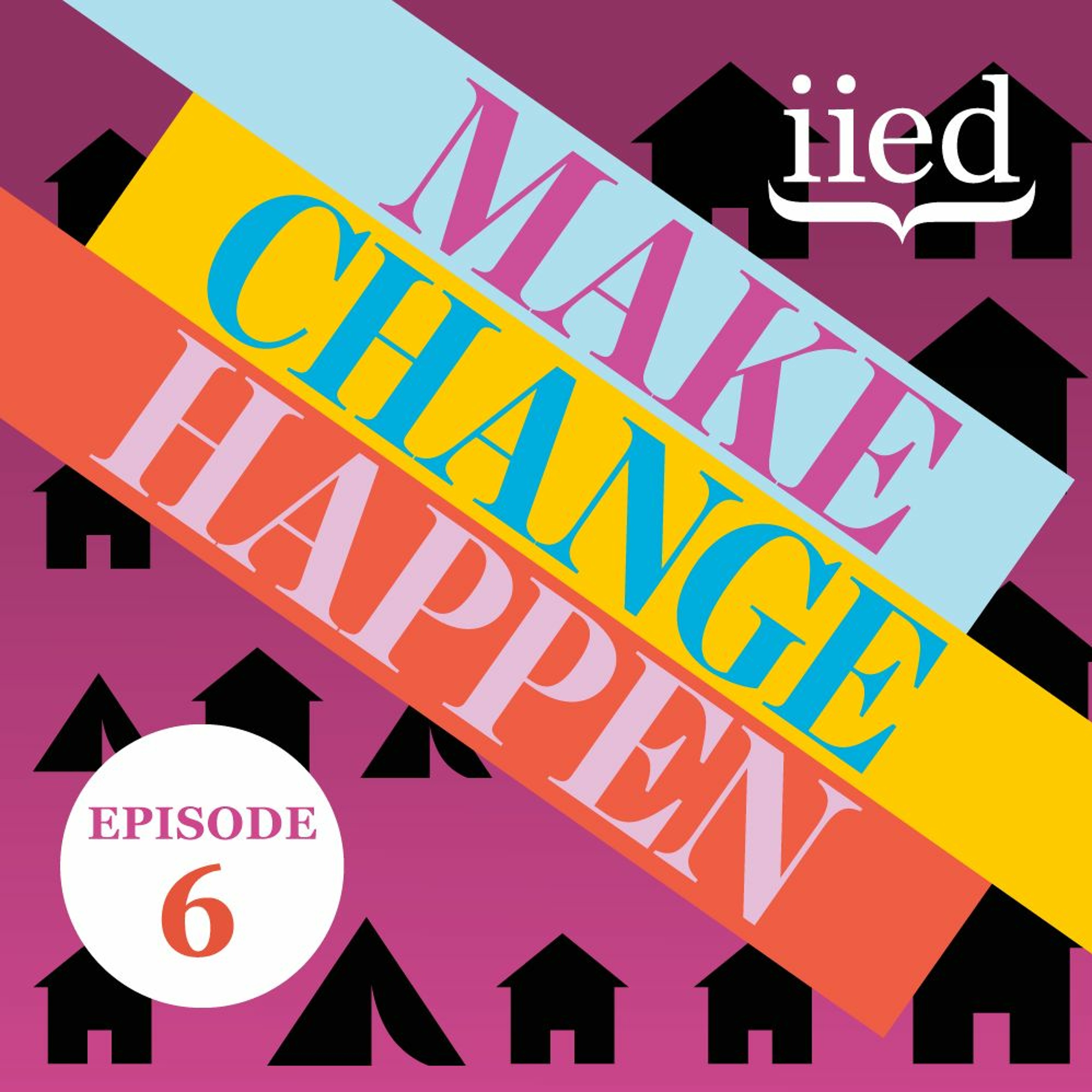
Make Change Happen6. Reimagining refugee futures: cities, not camps?Of the approximately 71 million people displaced by conflict and violence worldwide, nearly 26 million are considered refugees. But are more secure futures hindered by a collective failure to see refugees as diverse people, with skills to offer, and preferences about where they call home?
For World Refugee Day, we discuss new IIED research comparing refugees’ experiences of life in urban areas to that in camps, examining Afghanistan, Ethiopia, Jordan and Kenya. And we hear about an energy access project that captures some of the complexity of working with displaced people.
Hosted by Liz Carlile, IIED’s director of communications, the discussion feat...
2020-06-1948 min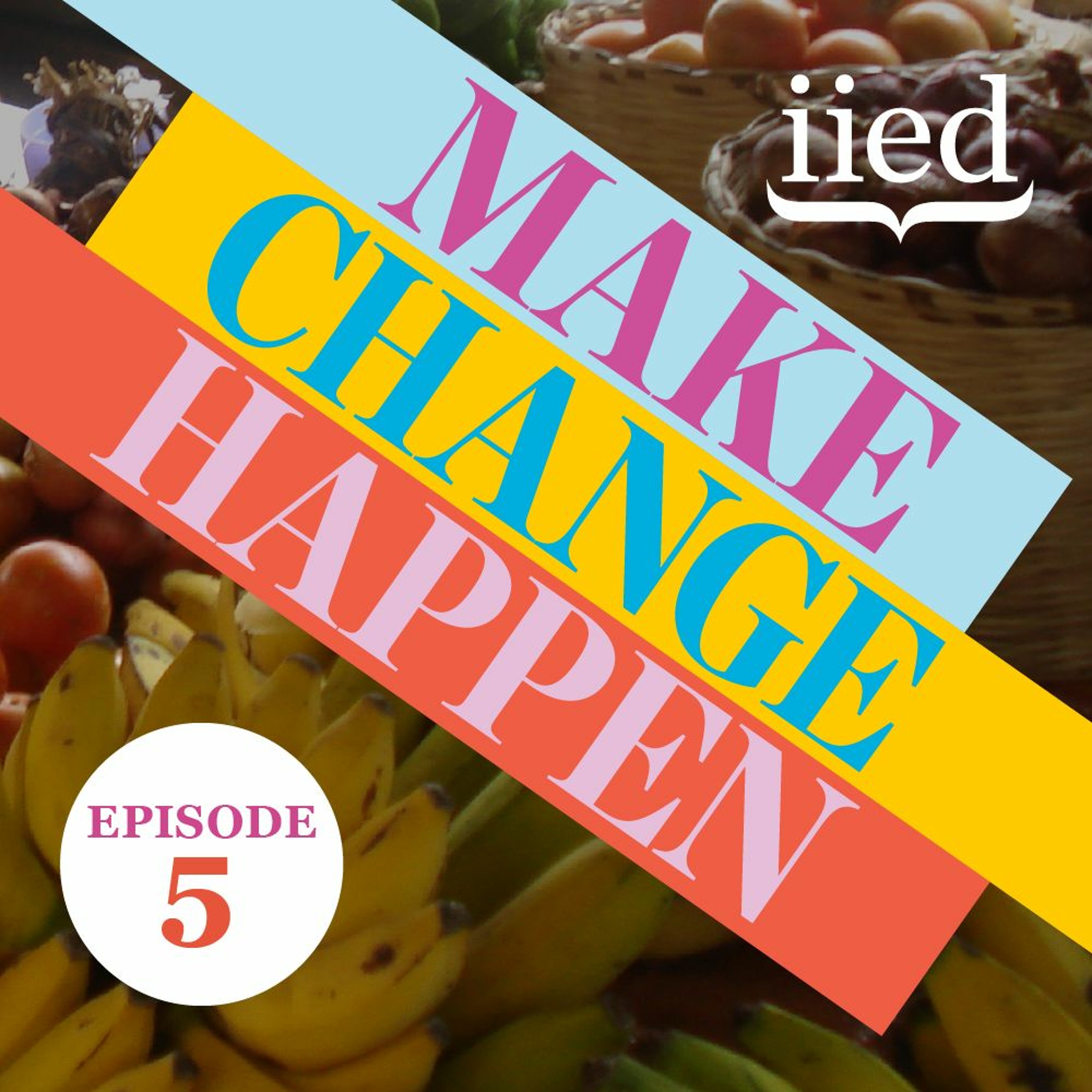
Make Change Happen5 What makes a sustainable diet? And who decides?Globally, we are producing more food than ever. But for many of the world’s poorer citizens, secure access to safe food is becoming less certain.
To counter this, an advocacy programme called Sustainable Diets for All is asking: how can we create food systems that are fairer, healthier and more sustainable?
Over the last four years, Dutch NGO Hivos and IIED have worked with local organisations in Uganda, Bolivia, Indonesia, Zambia and Kenya to find out how we can make sustainable diets – those that serve both planet and people – available to everybody.
The Sustainable Diets programme is bridging the gap be...
2020-05-0541 min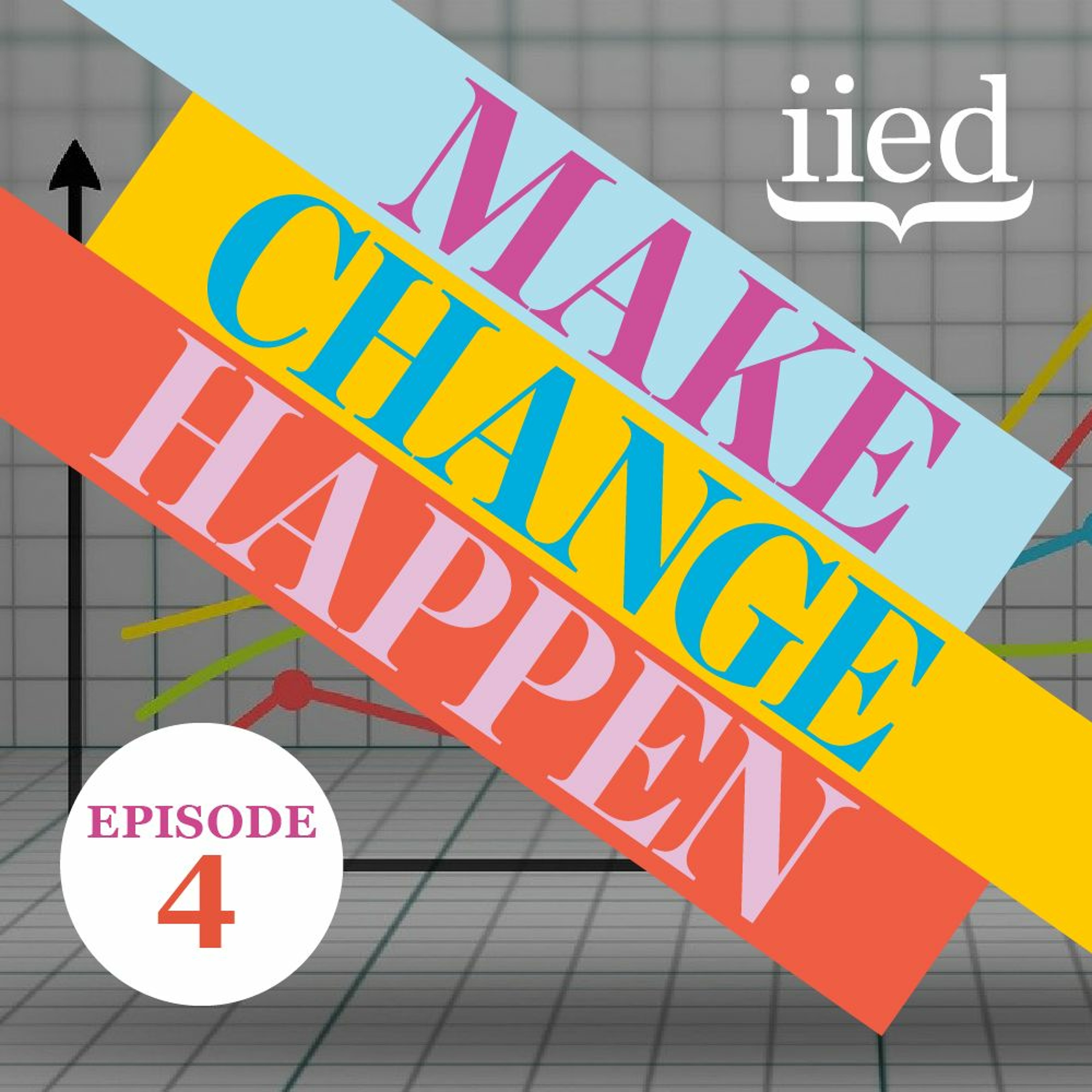
Make Change Happen4 The trouble with growthGrowth is usually measured by gross domestic product (GDP). But while this can indicate the health of other factors – such as jobs, livelihoods and even poverty reduction – it paints a limited picture.
GDP does not capture inequality, despite the effect this has on wellbeing. It excludes the environment and the care economy – meaning a huge amount of work done by women literally doesn’t count.
GDP also largely overlooks greenhouse gas emissions, failing to count the cost to vulnerable countries. In fact, damaging climate shocks can even count as ‘positive’ when we focus on GDP, as destruction prompts recovery spending.
Discussing t...
2020-03-1128 min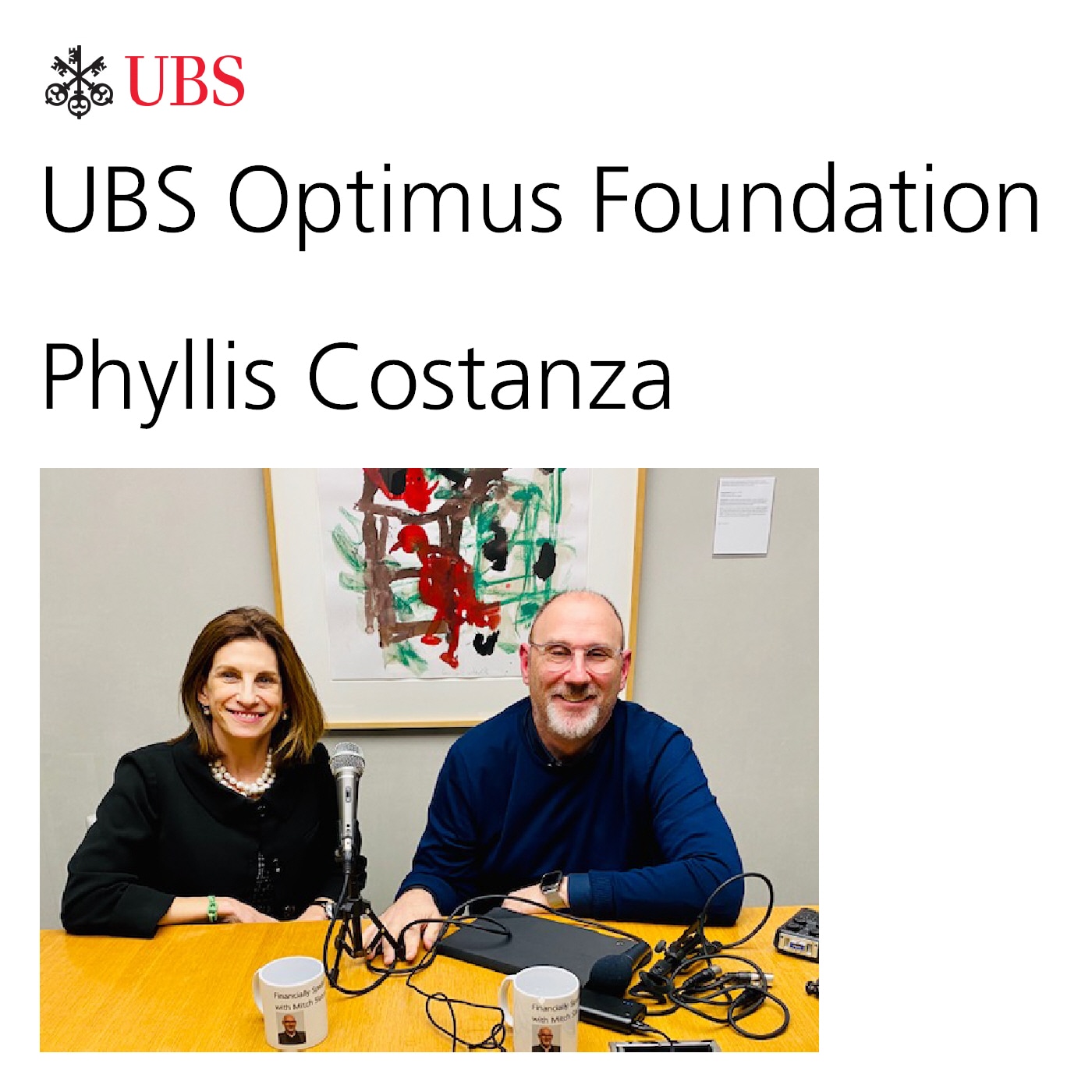
Financially Speaking with Mitch SlaterUBS Optimus Foundation with Phyllis CostanzaAll about giving and what UBS does with the Optimus Fund and Phyllis' background • Sources: The risk of harm to young people in institutional care https://resourcecentre.savethechildren.net/library/risk-harm-young-people-institutional-care • Effects of institutional rearing and foster care on psychopathology at age 12 years in Romania: follow-up of an open, randomised controlled trial https://www.thelancet.com/journals/lanpsy/article/PIIS2215-0366(15)00095-4/fulltext • The risk of harm to young children in institutional care. https:// resourcecentre.savethechildren.net/library/risk-harm-young-people-institutional-care • Own your worth https://www.ubs.com/global/en/wealth-management/women/opportunity.html • Development aid stable in 2017 with more sent to poorest co...
2020-02-0627 min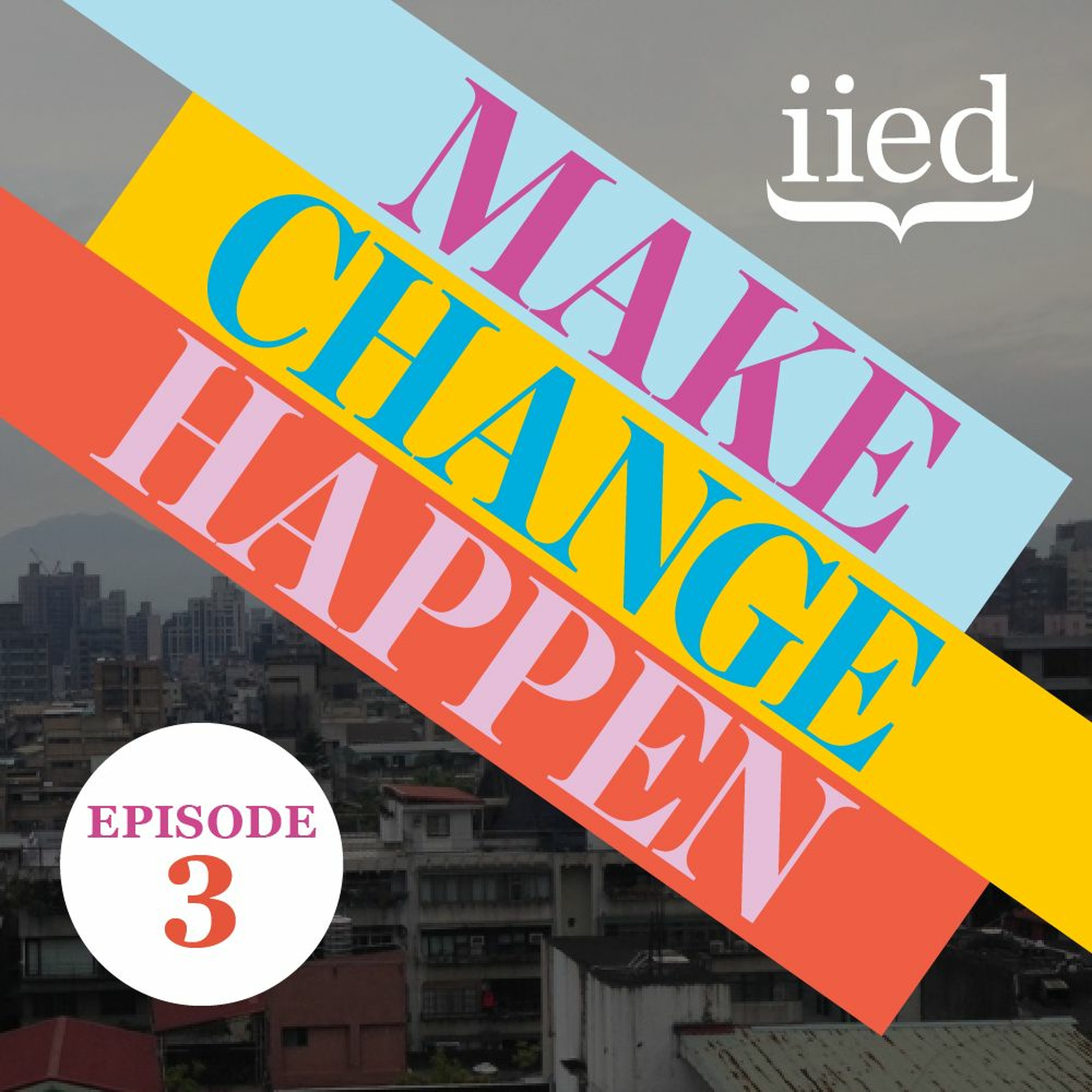
Make Change Happen3 Seizing opportunities for urban changeA quarter of the world’s urban population live in informal settlements, mostly in the global South.
In advance of the 2020 World Urban Forum in February 2020, this episode looks at how IIED’s work with marginalised urban communities developed, and what opportunities exist now for building more inclusive cities.
To discuss these and other related issues, in this podcast our director of communications, Liz Carlile, talks with two urban experts, David Satterthwaite and Anna Walnycki.
Both guests explain why they feel optimistic about the opportunities for inclusive, low-carbon sustainable urbanisation, inspired by successful community-led projects and the urban residents doing this...
2020-02-0430 min
Beaver SoundGrimshaw Speakers #3: Andrew Norton on Supporting Least Developed Countries in Climate NegotiationsAt our recent Grimshaw Simposium on The Changing Face of International Affairs, we spoke to Andrew Norton, Director of the International Institute for Environment and Development (IIED), about his work in climate change negotiations and partnering with least developed countries to train their negotiators and support them in the process. Yasmina O'Sullivan chairs the discussion.
This is Grimshaw Speaker, a partnership between the Grimshaw Club and Beaver Sound. We bring you conversations with exceptional individuals, discussing the issues of our times.
For more from The Beaver click here and from the Grimshaw Club click here.
2019-12-1638 min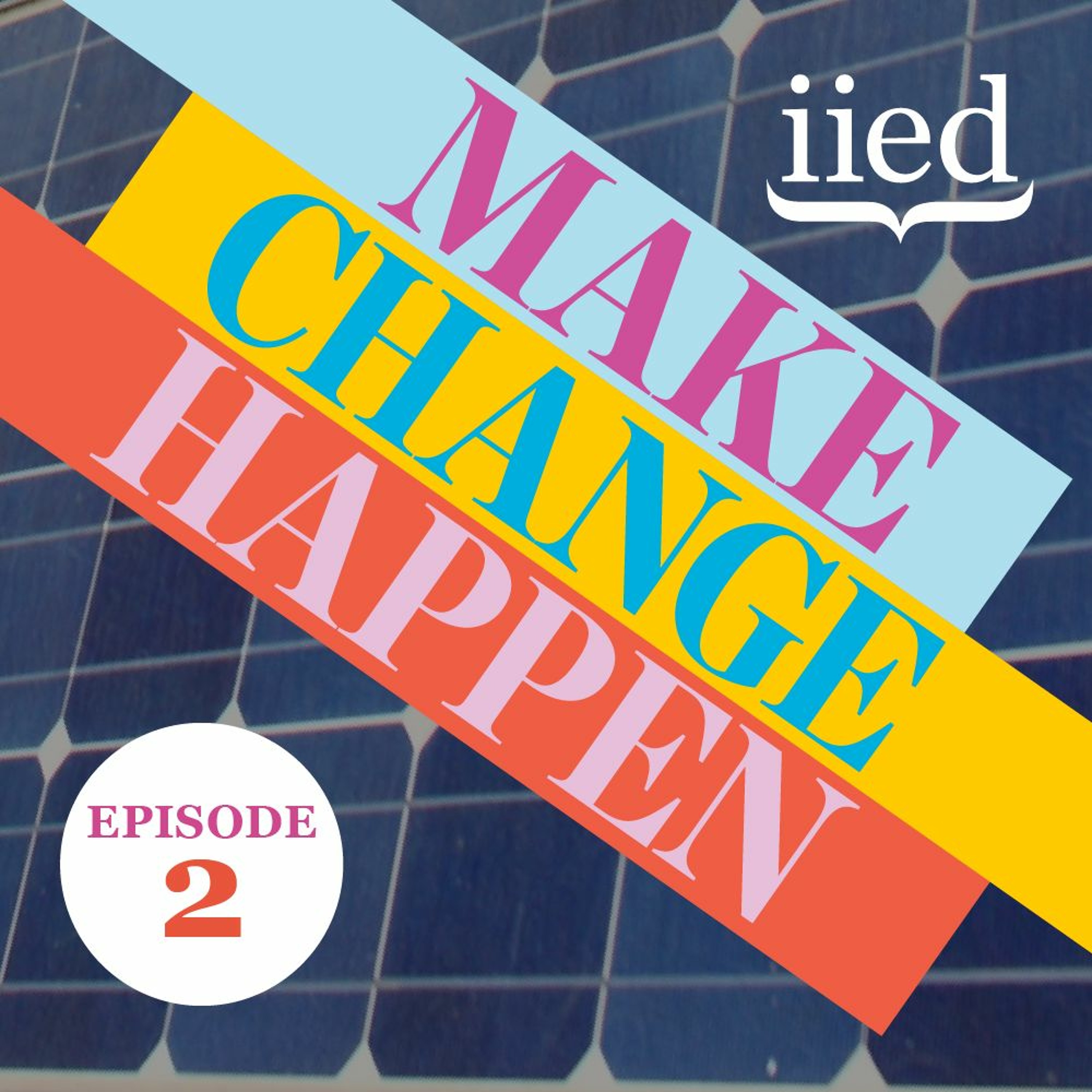
Make Change Happen2 Delivering energy access for allAccess to electricity in the poorest countries has begun to accelerate, energy efficiency continues to improve, and renewable energy is making gains in the electricity sector. Despite this progress, around a billion people remain without access to electricity while some 3 billion are without access to clean cooking fuels and technologies.
Off-grid and mini-grid solutions can be designed to provide affordable electricity to poor communities in hard-to-reach areas, but Governments hoping to harness these technologies to achieve Sustainable Development Goal 7 — universal access to energy by 2030 — need to find new ways to attract more finance as they currently receive only a fraction of the...
2019-11-1440 min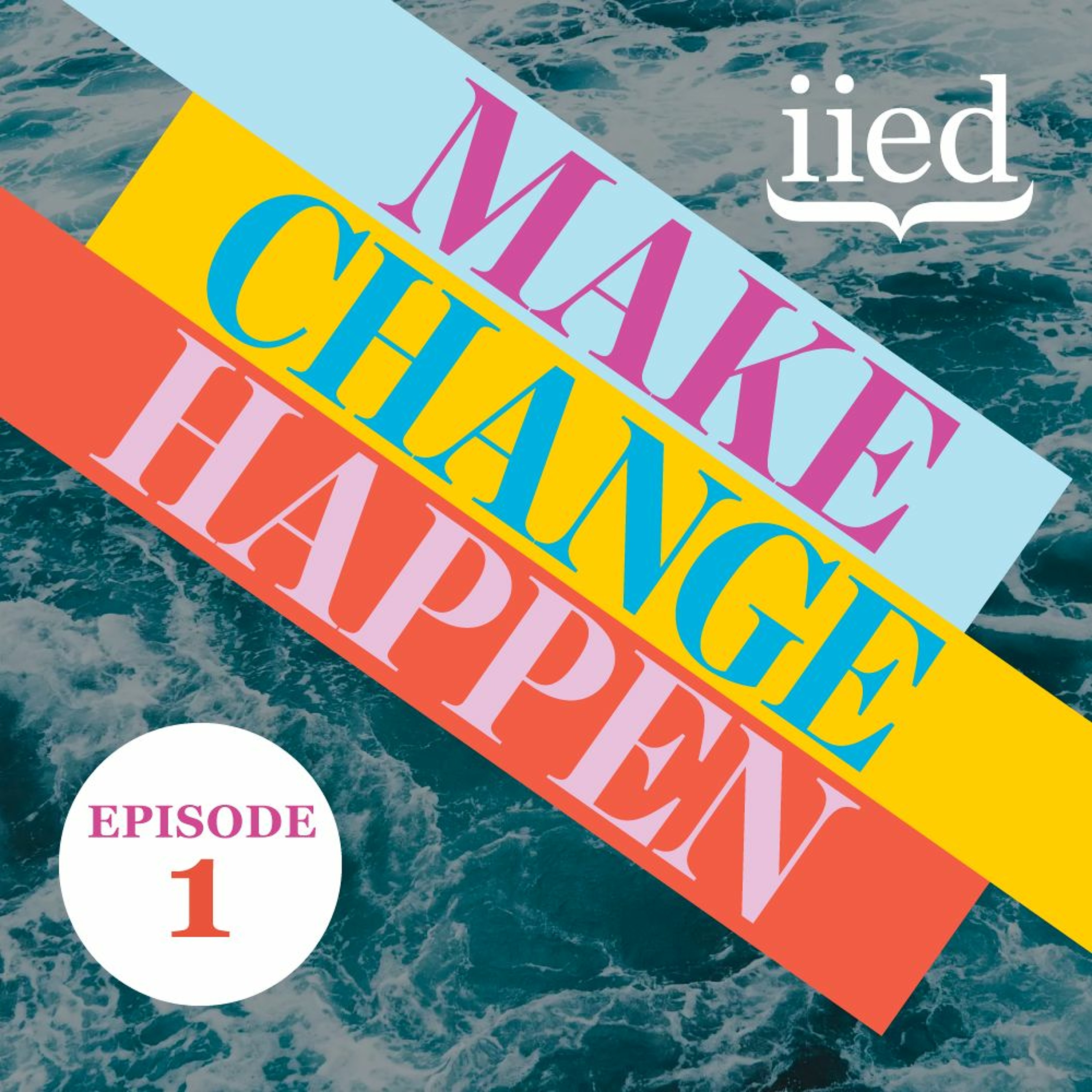
Make Change Happen1 Protecting the oceanWith nearly three quarters of our planet covered by water, the ocean is the earth’s essential life support system. But much of the ocean is under-regulated and over-exploited.
In the first episode of a new podcast from the International Institute of Environment and Development (IIED), we examine international efforts to protect the ocean, support marine biodiversity and create sustainable fisheries.
Joining host Liz Carlile to discuss how to protect our ocean are experts Essam Yassin Mohammed, an environmental economics specialist whose fascination with fisheries began when he fell in love with the orangeface butterflyfish that lives in the Red Se...
2019-08-2130 min
BondcastClimate and environment issues are development challenges tooWe need to wake up to the triple challenges of tackling climate change, eliminating poverty and protecting the natural environment. At the recent Bond Conference, we brought together experts from different sectors to interrogate how we as NGOs can tackle this urgent crisis together. Hear thoughts from Farhana Yamin from Extinction Rebellion, Tanya Steele from WWF UK, and Christine Allen from CAFOD. The panel was moderated by Clare Shakya from IIED.
If you liked this podcast, please rate or review us on your chosen player.
2019-05-1622 min
留学声(第1季)黄泓翔:从复旦到哥大,从中国到美国再到非洲,从调查记者到创业者,我的人生抉择黄泓翔:ChinaHouse 中南屋首席执行官、创始人,复旦大学新闻学学士,哥伦比亚大学国际关系硕士,哥伦比亚大学访问学者,英国环境与发展研究所(IIED),世界自然基金会等多家顶级国际组织特约顾问,自2011年以来,赴南美洲、非洲数十个国家进行学术调研学术调研,研究中国企业走出去遇到的环境与社会问题,在国内外顶级媒体如《南方周末》《外交政策》《大西洋月刊》等发表大量作品,也在约翰霍布金斯大学中非研究项目等平台发表中非关系领域的学术论文。并在2016年成为了Netflix国际纪录大片《象牙游戏》的主角,受到了国际野保英雄珍古道尔等人的大力支持。
主持人赵一昕:哥伦比亚大学教育学院传播学&教育学硕士
2018-10-1520 min
The Belt and Road PodcastChinese Infrastructure Building and its Effects on Economic Development - A Case Study in Mozambique featuring Ulrikke WethalThis episode features the dynamic researcher from the Centre for Development and the Environment at the University of Oslo - Ulrikke Wethal The topic of discussion comes from her latest article:Beyond the China Factor: Challenges to backwards linkages in the Mozambican construction sector from the June 2018 edition of the Journal of Modern African Studies Recommendations: Ulrikke: 1) Johns Hopkins School of Advanced International Studies - China-Africa Research Initiative Data 2) Belt and Road Music Video Erik: 1) IIED's new documentary short on Mr. Forest, a Chinese investor who...
2018-10-0533 minAudio LawCullison V. Medley (Mere Words)When do words constitute an assault? When can they constitute Intentional Infliction of Emotional Distress (IIED). Find out how "mere words" are regarded for both of these torts in Audio Law's coverage of Cullision v. Medley (1991).
2018-09-2812 minAudio LawTaylor V. Vallelunga (Intention)How important is it for the defendant to know their actions will cause severe emotional distress? Does transferred intent apply in cases of IIED? Gain context and answers to these questions in Taylor V. Vallelunga (1959).
2018-09-2807 minAudio LawSlocum V. Food Fair Stores, Inc. (Insufficient Severe Emotional Distress)IIED is the Intentional Infliction of severe Emotional Distress (subjective) by relatively extreme and outrageous conduct which actually causes Severe Emotional Distress (objective). Can an insult cause severe emotional distress? Hear about the court's decision regarding IIED in Slocum v. Food Fair Stores, Inc.
2018-09-2809 min
Skylines, the CityMetric podcast98. A huge, developing problemThis week, we’re talking about one of the biggest problems facing the developing world today. Untold millions are moving from country to cities in Africa, Asia and Latin America, in search of a better life – but with a few exceptions, those cities are not building the infrastructure those new arrivals require. So, what to do?Luckily, we have an expert on hand to tell us. Sarah Colenbrander is an environmental economist currently working at the International Institute for Environment & Development (IIED). She tells me why the urban poor are growing in absolute terms, albeit not as a pr...
2018-08-0225 min
Law to FactTorts: Intentional Torts to PersonThis episode reviews the following intentional torts to the person: BatteryAssaultFalse Imprisonment Intentional Infliction of Emotional Distress (IIED)The episode begins with an explanation of intent and then discusses the rules and relevant case law necessary to understand each of the four intentional torts to the person. We end with an analytical framework and strategy for attacking these torts on a law school exam.-As always, if you have any suggestions for an episode topic, please let us know! You can email leslie@lawtofact.com or tweet @lawtofact. -Find us on...
2017-11-2816 minClimate Diplomacy for Beginners with Brianna Craft“Be bold. You are needed.” http://media.blubrry.com/womenindiplomacy/content.blubrry.com/womenindiplomacy/Brianna_Craft_2.m4a Subscribe to the #WomeninDiplomacy Podcast BRIANNA CRAFT is a researcher at the International Institute for Environment and Development (IIED), based in London. She is a member of the global climate law, policy and governance team which focuses on helping vulnerable developing countries achieve more equitable outcomes in international climate change... Read More
2016-12-1317 min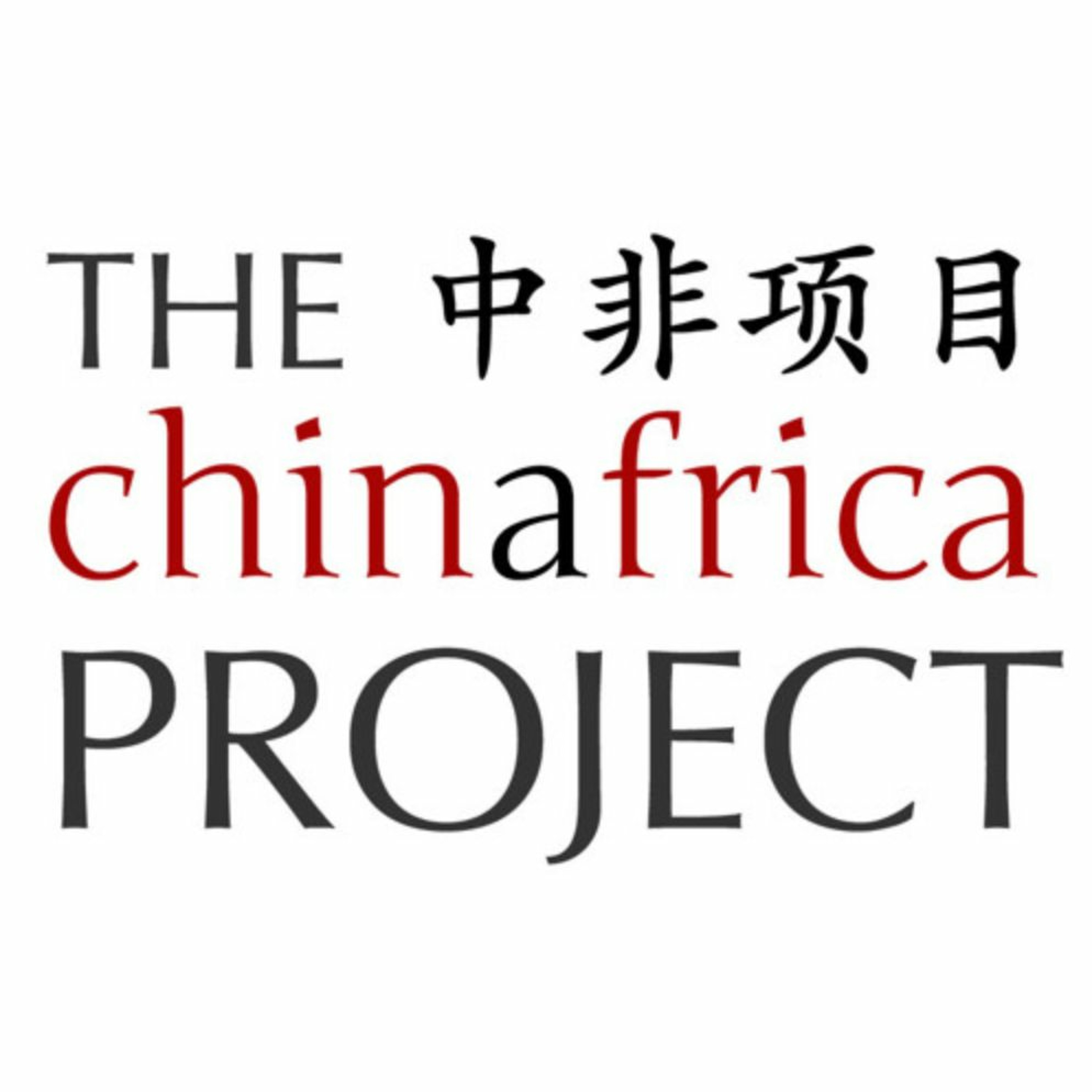
The China Africa ProjectWhy more Chinese companies in Africa are choosing to be good neighborsChinese companies around the world, particularly in Africa, have a well-earned reputation for being bad corporate citizens. There are countless stories of labor rights violations, disregard of environmental policies and lack of engagement with local communities among many other allegations. While all of these examples highlight a serious problem in China's overseas corporate governance, it doesn't tell the whole story.
New research from the International Institute for Environment and Development that surveyed 58 representatives across three African countries revealed that Chinese corporate behavior varies widely depending on the local conditions of where it invests. That is, in those areas where there...
2016-05-0840 min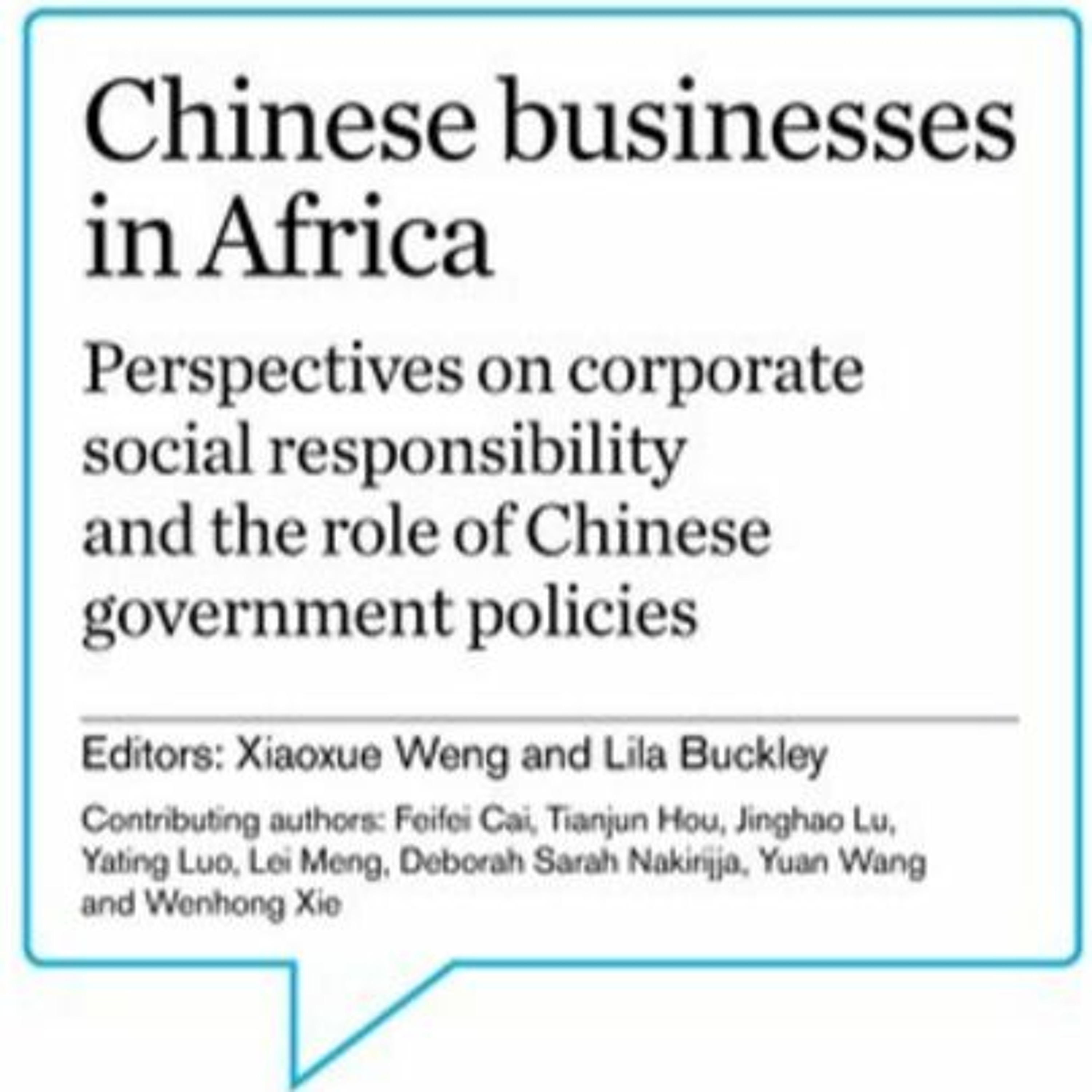
Cowries and RiceEpisode 73 - Chinese businesses in Africa, CSR, and Chinese government policyIn this episode, we go back to a topic we have previously discussed at Cowries and Rice yet one that we judge timely and important enough to revisit: Sustainable development. Both sustainable development and developing sustainably seem to be important slogans for China - Africa relations and reflect Chinese policy priorities. In order to further look into questions of the impact of development on the environment and Corporate Social Responsibility practices by Chinese firms abroad in general and in Africa more specifically, we have invited to the pod Ms. Xiaoxue Weng who is a researcher in International Institute for Environment...
2016-04-1038 min
Cowries and RiceEpisode 73 - Chinese businesses in Africa, CSR, and Chinese government policyIn this episode, we go back to a topic we have previously discussed at Cowries and Rice yet one that we judge timely and important enough to revisit: Sustainable development. Both sustainable development and developing sustainably seem to be important slogans for China - Africa relations and reflect Chinese policy priorities. In order to further look into questions of the impact of development on the environment and Corporate Social Responsibility practices by Chinese firms abroad in general and in Africa more specifically, we have invited to the pod Ms. Xiaoxue Weng who is a researcher in International Institute for Environment...
2016-04-0938 min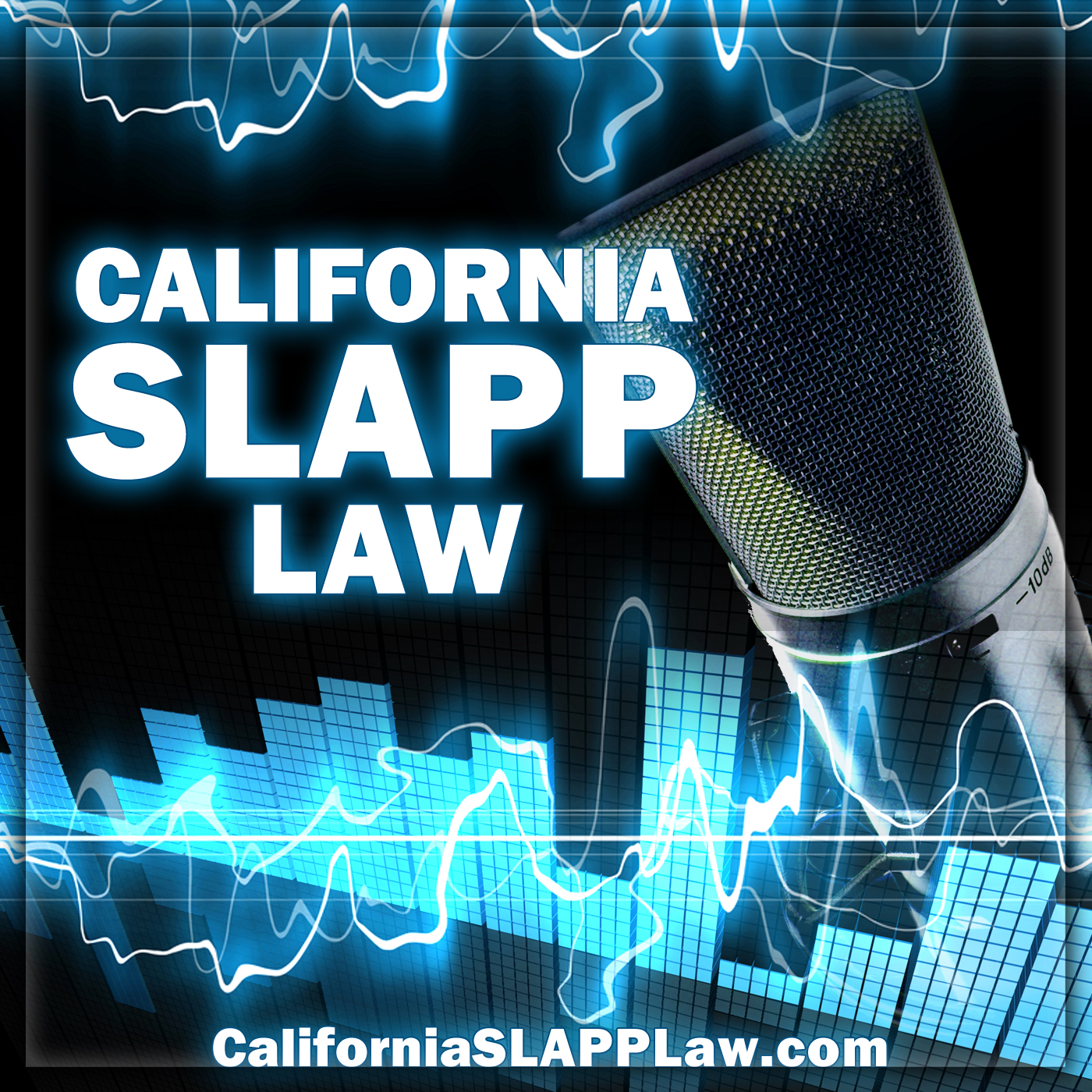
California SLAPP LawSLAPP012 – Three Ways to Bring an Anti-SLAPP Motion Against an Ambiguous Complaint
Sometimes you just know that a SLAPP is hiding in the complaint, but the complaint is so ambiguous that the SLAPP allegations are unclear. What to do?
In this episode, I tell you how to file an anti-SLAPP motion against an ambiguous complaint, which sometimes involves first beating it into shape. I have three approaches, which I call Demurrer, Discovery and Damn the Torpedoes.
1. Demurrer Approach.
As you can probably guess, the demurrer approach uses a demurrer to the complaint as the means to force plaintiff/cross-complainant to better set forth t...
2014-12-0826 min